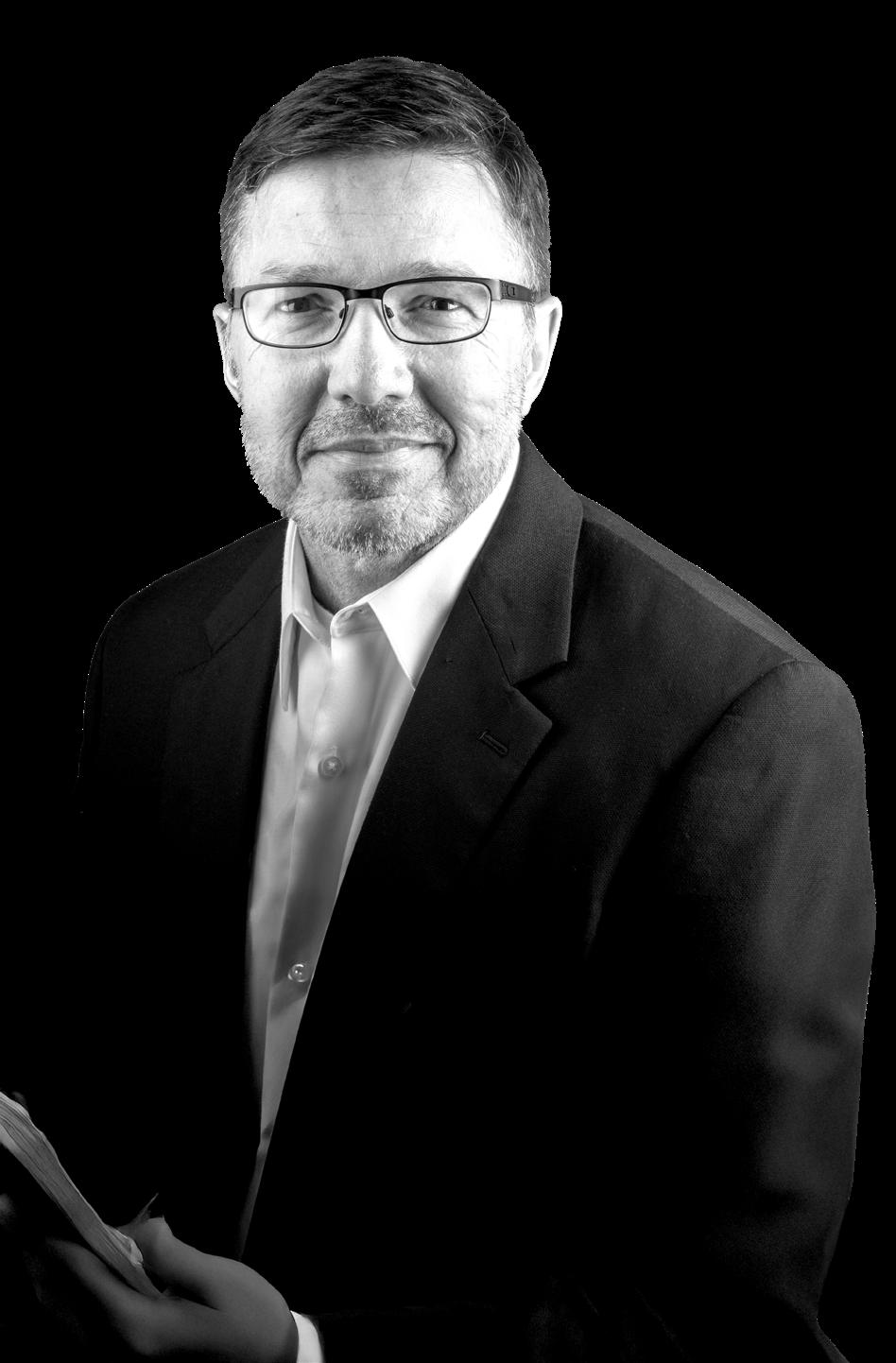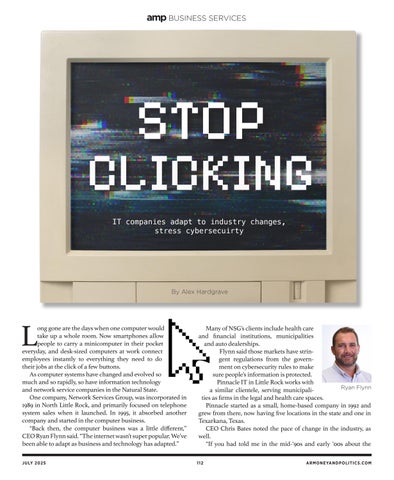

SUCCESS
Baptist Health College has grown into one of state’s true secret gems
Baptist Health CEO Troy Wells




Next. It’s where we’re all focused.

For decades, we’ve partnered with public schools and higher education institutions across the state, offering deep expertise and a personal commitment to their success.
Our senior bankers and analysts deliver tailored financial solutions that support your long-term goals.
The Stephens Public Finance team is proud to support the entities shaping our nation’s future— including the schools driving progress here in Arkansas.
With strong roots, a proven distribution network and inhouse expertise, Stephens is ready to move you forward today and tomorrow.




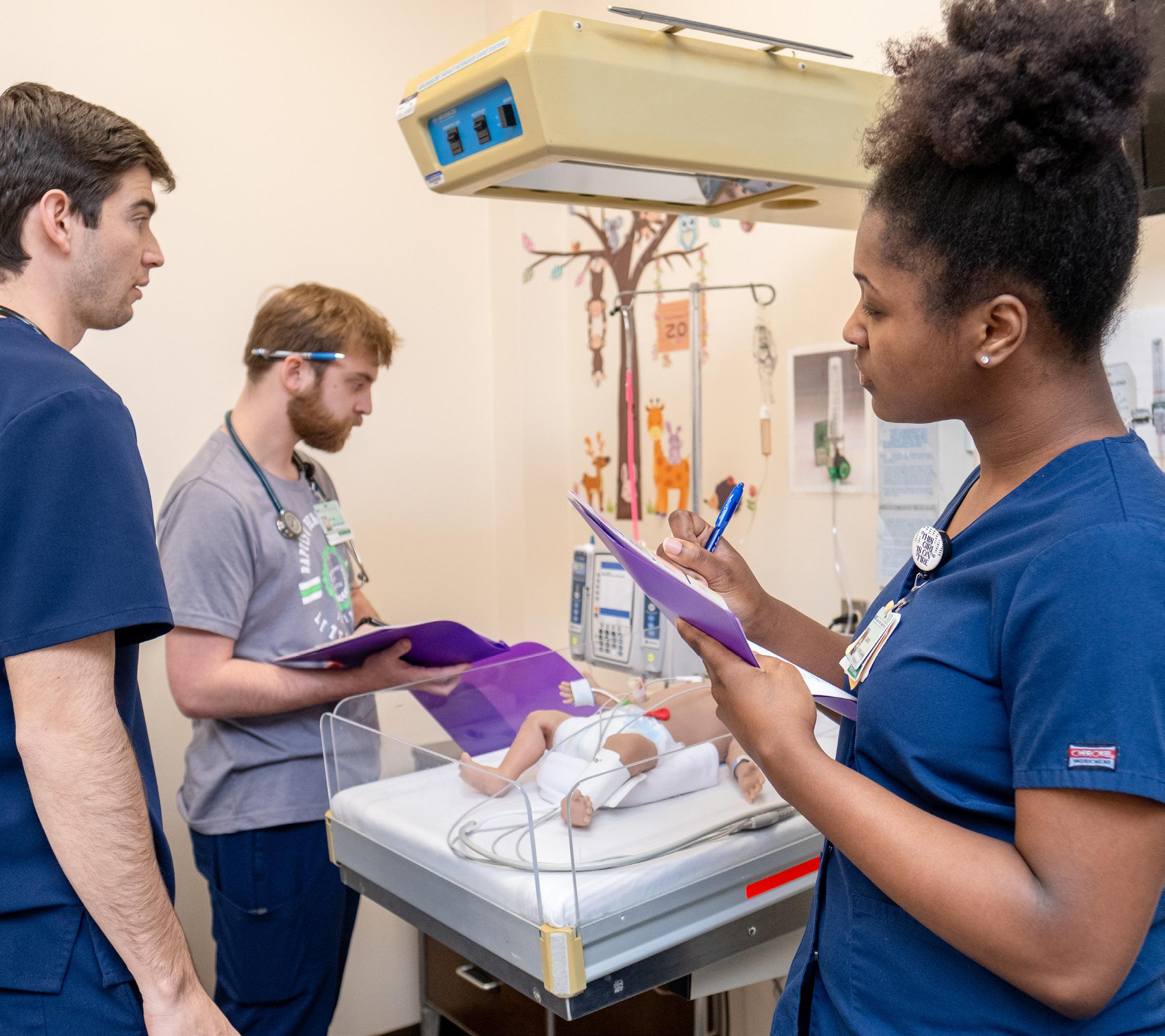
FEATURES JULY 2025
HEALTH CARE HIDEAWAY
Baptist Health College is arguably the quietest success story in central Arkansas, if not the entire state, a bestkept secret gem on the educational landscape.
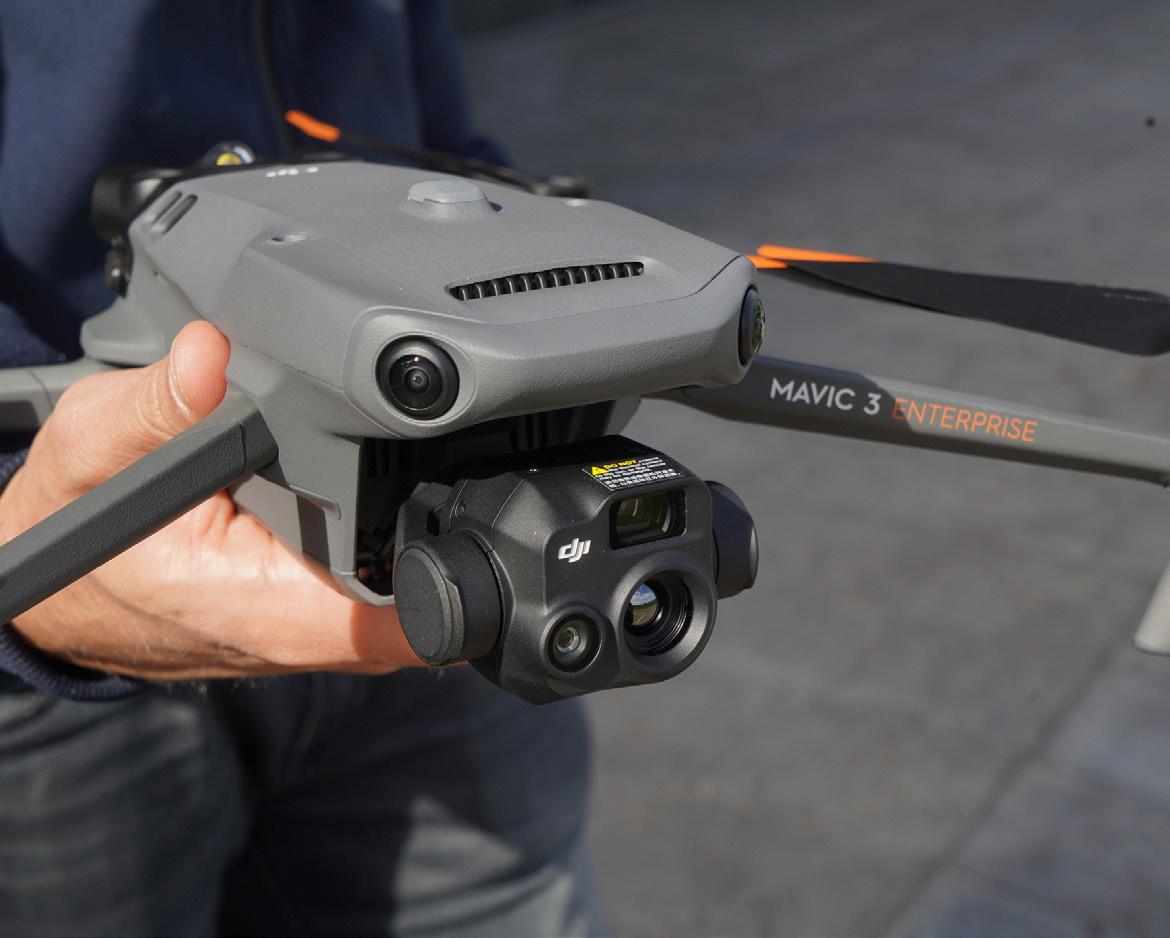
READY TO SOAR
With a name like Arkansas Drone Solutions, one might envision the Greenbrier company to be located near an airstrip and owned by a former fighter pilot.

COUNTDOWN TO KICKOFF
103.7 The Buzz will mark the start of football-talking season in central Arkansas with its annual Countdown to Kickoff event, this year scheduled for July 24.

The only certain things in life are death and taxes — and, of course, supply and demand, which higher education leaders know applies to them, as well.
The newly signed Arkansas ACCESS Act has challenged colleges and universities to ensure a robust return on investment from their programs.
In 2021, a new program for developing career readiness launched in local high schools. This year, the Academies of Central Arkansas hits a milestone.
More than five years have passed since schools shut their doors in the spring semester of 2020. Evidence of the sea change that took place is hard to find.
MASTERS IN THEIR FIELDS
Arkansas Money & Politics unveils its inaugural class of industry-leading masters, those professionals who wake up every day ready to excel.
FUTURE ICONS
PRESIDENT & PUBLISHER
Heather Baker | hbaker@armoneyandpolitics.com
EDITOR-IN-CHIEF
Dwain Hebda | dwain@armoneyandpolitics.com
SENIOR EDITOR
Each year, AMP is tasked with identifying the state’s top young leaders, those who are gaining renown in politics and business.
This section honors 12 outstanding Arkansas women who have left an indelible mark on industries such as health care, education and more.
Cybersecurity may get a lot of buzz when it comes to protecting business assets, but personal security is just as important.
As computer systems have changed and evolved so much and so rapidly, so have IT and network service companies in the Natural State.
People only get one shot at a first impression, and the same can be said for a business, which makes commercial cleaning so important.
In its simplest definition, fractional staffing operates like the temp employees of old who do short-term or project-specific work.
Mark Carter | mcarter@armoneyandpolitics.com
ASSOCIATE EDITOR
Mak Millard | mmillard@armoneyandpolitics.com
EDITORIAL COORDINATOR
Darlene Hebda | darlene@armoneyandpolitics.com
COPY EDITOR
Sarah DeClerk | sdeclerk@armoneyandpolitics.com
STAFF WRITERS
Doug Crise | dcrise@armoneyandpolitics.com
Alex Hardgrave | ahardgrave@armoneyandpolitics.com
MANAGING DIGITAL EDITOR
Kellie McAnulty | kmcanulty@armoneyandpolitics.com
ONLINE WRITER
Kilee Hall | khall@armoneyandpolitics.com
PRODUCTION MANAGER
Mike Bedgood | mbedgood@armoneyandpolitics.com
GRAPHIC DESIGNERS
Jamie Davis | jdavis@armoneyandpolitics.com
Lora Puls | lpuls@armoneyandpolitics.com
Lee Smith | lsmith@armoneyandpolitics.com
SENIOR ACCOUNT EXECUTIVE
Greg Churan | gchuran@armoneyandpolitics.com
ACCOUNT EXECUTIVES
Michelle Daugherty | michelle@armoneyandpolitics.com
Mary Funderburg | mary@armoneyandpolitics.com
Karen Holderfield | kholderfield@armoneyandpolitics.com
Carrie Sublett | carrie@armoneyandpolitics.com
EXECUTIVE ASSISTANT
Jessica Everson | jeverson@armoneyandpolitics.com
ADVERTISING COORDINATOR
Lisa Hern | ads@armoneyandpolitics.com
CIRCULATION circulation@armoneyandpolitics.com
INTERNS
Mary LeSieur, Maci Miller
ADMINISTRATION
Marissa Porter | ayoffice@armoneyandpolitics.com
CEO | Vicki Vowell
TO ADVERTISE call 501-244-9700 email hbaker@ armoneyandpolitics.com

Anyone who wishes to capture what David Bubbus Sr. of David’s Burgers fame does on any given day is advised to bring comfortable shoes.
When longtime Little Rock chef Donnie Ferneau talks about COVID-19 as an existential threat in the food business, he is not speaking anecdotally. Trailblazing
TO SUBSCRIBE armoneyandpolitics.com/subscribe
CONTRIBUTORS
Jamie Lee, Lori Sparkman, Chris Davis, DeWaine Duncan, Ryan Parker, Stephen Routon, Todd Shields

Lexicon proudly recognizes Nick Mahan, Group Controller, for being named one of AMP’s “Future Icons.” With sharp insight, drive, and a deep commitment to excellence, Nick plays a vital role in advancing Lexicon’s strategic vision. His work supports some of the nation’s largest industrial projects transforming data into direction, and numbers into industrial growth.
Nick represents the next generation of leadership at Lexicon. Focused. Forward-thinking. Impactful. We’re proud to have him on our team. Congratulations, Nick!
800-925-4565 / Lexicon-Inc.com
SUCCESS

ON THE COVER
Lori Sparkman photographed Troy Wells of Baptist Health at the health system’s flagship Little Rock campus. Wells has overseen the growth and success of the health system, which includes Baptist Health College
The story starts on page 12.
FEEDBACK
POLK STANLEY WILCOX NAMES OPITZ, BENNINGS AS NEW PRINCIPALS
Nice to see 2 well deserving women being recognized in this manner. Congratulations to Patty and Sarah.
Mark A. Robertson
CONVEYOR TECHNOLOGY CUTS RIBBON ON NLR EXPANSION
Excited to see the growth!
Carter Brown
LR LEADERSHIP COACH JASON CURRY RELEASES DEBUT BOOK
Thanks so much for being in my corner Arkansas Money & Politics!
Jason Curry
COMPASS ACADEMY IN CONWAY HAS PURCHASED A COMMERCIAL PROPERTY JUST OFF INTERSTATE 40 FOR $3.25 MILLION
Amazing! So happy for the students and teachers!
Karen Riggins
AY STAFF RECEIVES ARKANSAS PRESS ASSOCIATION’S CERTIFICATE OF EXCELLENCE IN SEVEN CATEGORIES
Congratulations to Heather Baker and the entire team on this amazing achievement.
Kristi Herndon Mann
DARROW JONES PLEDGES $1M TO ARKANSAS CHILDREN’S
Darrow Jones you are so generous and kind! Proud to know you for 50+ years!
Barbara Brown Lyle
TOP ONLINE ARTICLES
June 1 — July 2
1 Huckabee to Trump: ‘This Moment Sought You’
2 Details Emerge About $151M Amazon Hub at Port of Little Rock
3 Asian Needle Ants Found in Arkansas
4 A Day in the Life: Steve Landers Jr., Interstate Holdings
5 16 Billion Passwords, Login Credentials Leaked
6 Flag and Banner to Move, Make Room for Restaurant
7 AMP Best of 2025
8 Bale Family Donates $1M to ACH, Honors Seibert Legacy
9 Levi Hospital to Close, Transition into Community Health Foundation
10 The Warehouse District Breaks Ground at Johnson Square
CORRECTION
Our June story on Salon Cirae in Little Rock erroneously stated that owner Leah Harding did not attend beauty school. In fact, she’s a proud 2012 graduate of Lee’s School of Cosmetology in North Little Rock. We regret the error.


After 18 years at the helm of the Winthrop Rockefeller Foundation,
West-Scantlebury, president and CEO,
will retire in October, concluding a 33-year career in philanthropy.

Darrow Jones, co-owner of Jones & Son Diamond & Bridal Fine Jewelry, has made a $1 million estate trust provision to Arkansas Children’s.
Jamie Jones, a partner at Friday, Eldredge & Clark in Little Rock, was officially sworn in as president of the Arkansas Bar Association June 13 during the organization’s annual meeting at Oaklawn Hot Springs.
Sherece
will
By Mark Carter
WHAT’S IN A NAME?
Each month, the pages of this magazine celebrate the men and women who make business work in Arkansas for Arkansans, whose work every day ensures this great state remains the Land of Opportunity.
That got me thinking about what it takes to launch a successful business and just how much a new venture’s name can make or break it. What might I name a business had I even an inkling of the ingenuity, discipline — and heck, desire to get up in the morning — that the casual observer can see on display across this great state every day?
Against the advice of fly-by-night outfits such as the “U.S. Chamber of Commerce” and something called “Forbes,” each of which advises prospective business founders to keep it short and sweet and “not get too clever,” we came up with a couple of specific business names for some pretty darn specific business ideas.
We’ll trust the honor system to ensure these names and ideas are still available assuming I muster the gumption to visit the U.S. Patent and Trademark Office website one day.
Away we go. No. 1
Business idea: deli/barber shop
Ever need to kill two birds with one stone? Of course, you do. Make your lunch hour work for you. At “When Hairy Met Deli,” customers can get their style and their appetites on.
The combo possibilities are endless. A few samples:
• The French Connection: a dip and a crop (both of ‘em French).
• The Miami Vice: Say hello to this little friend while getting your crimp up and your Cuban down (your throat, that is).
PUBLISHER’S LETTER
T• The Dogpatch Delight: The mullet meets the roadkill po-boy (50 percent off with Yell County proof of residence).
• The KISS: Buzz cut … grilled cheese … ‘nuff said (just keeping it gloriously simple).
• The Italian Job: pixie bun and panini (a palpable pairing). No. 2
Business idea: customized testicular prosthetics
The American Cancer Society tells us roughly 9,720 cases of testicular cancer have been diagnosed in the U.S. so far in 2025. One in 250 American males will be impacted at some time in their lifetime, we’re told. Fortunately, survival rates are good.
Arkansas men who survive testicular cancer can surely relate to the kick-to-the-groin Razorback fans are guaranteed to experience each year. “Callin’ the Hogs” has represented a tradition handed down through generations, but for our battle-tested cancer survivors, callin’ the Hogs now just means more. We give you, ladies and gentlemen, “Ballin’ the Hogs.”
As colleges across the land deal with the fallout of NIL and revenue sharing, athletics directors are hard-pressed to come up with extra cash. Proceeds from Ballin’ the Hogs would go to help pay for more five-star recruits to, well, ball for the Hogs.
Individual prosthetics could come in cardinal red or white and feature any of the Hogs’ licensed logos — the standard running Razorback, Slobber Hog, Sweater Hog, the Hog running through the A or any of a number of classic Hogs (even forward-facing Worf Hog, for you contrarians).
Just trying to do our part to keep The Natural State relevant and in business.
By Heather Baker
FIREWORKS, FREEDOM AND FUN
his July, we celebrate our nation’s independence and thank all the brave people who serve our country.
Even though you may be taking your summer vacation this July, the important news from around the state doesn’t stop. We’ve stayed busy interviewing influential Arkansans and are excited to bring you stories you can use.
Our cover features Troy Wells, president and CEO of Baptist Health, We sat down with him to discuss Baptist Health College, a Little Rock institution and beneficiary of this year’s Bolo Bash Golf Tournament.
Inside this issue, you’ll find an education section chock-full of useful information, including a story about virtual classrooms and another about high-school job readiness programs. In our business services section, read about how information technology companies are prioritizing cybersecurity.

You won’t want to miss our “Arkansas Visionaries” interview with David Bubbus of David’s Burgers. Speaking of burgers, be sure to read the story about the historic Bulldog Restaurant in Bald Knob.
This issue also features our “Trailblazing Women.” The cohort is truly a group of inspirational women who are shattering glass ceilings in their respective industries.
In addition to our “Trailblazers,” we also highlight our “Future Icons” this month. A few include Clint Cates, treasury services specialist at Signature Bank, and Jacob Jones, co-owner of Jones & Son Diamond & Bridal Fine Jewelry in Little Rock. Be sure to read about how these young leaders are shaking up the state.
We know you’ll find this issue interesting and informative. Thank you for your continued readership and support. Enjoy this issue and, as always, hit me up with comments or story ideas at hbaker@aymag.com.
Heather Baker (Photo by Jane Colclasure)
FOR BREAST CANCER SCREENINGS, STICK TO THE SCIENCE
Mammograms the most effective tool for finding the disease and saving lives
By Dr. Stephen Routon
Wellness is having a moment. Consumer interest in the concept and the lifestyle practices it promotes is at an all-time high. Earlier this year, McKinsey & Co. reported the global wellness market is a $2 trillion industry, and consumer spending on products and services is reaching a fever pitch. Women’s health, in particular, has seen a surge as Americans invest their dollars — and their trust — into functional nutrition, beauty, longevity, holistic medicine and more.
While our culture’s focus on better health can be beneficial, not all wellness solutions are created equally. The rise of social media has opened new and never-ending opportunities for potential misinformation, which can result in consumers making riskier decisions that can impact their long-term well-being. A recent example is internet “experts” attempting to plant seeds of doubt about mammograms, a method long recognized as the gold standard of breast-cancer screening.
How did we get here? According to Forbes, Americans are exposed to thousands of ads daily, most through online platforms. Amid our crowded social media feeds, it can be difficult for consumers to determine which posts are accurate, especially when the content comes from well-known or aspirational influencers. The recent flashy posts about “compression-free” mammograms or “radiation-free, revolutionary breast screenings” may sound appealing. After all, their goal is to get our attention — and to sell their products and services. Unfortunately, there is no scientific evidence to back up their claims.
Take it from the real experts. The U.S. Food and Drug Administration, which regulates medical devices, reaffirms that mammography is “still the most effective primary screening method for detecting breast cancer.” Echoing the FDA, the American Cancer Society states that mammograms are the “most reliable way to find breast cancer early.” The ACS credits the screenings as a leading contributor to the steady and significant decline in mortality rates from the disease by more than 40 percent since 1990. The Centers for Disease Control and Prevention, too, agree that “having regular mammograms can lower the risk of dying from breast cancer.”
Even valuable supplemental screenings, such as wholebreast ultrasounds or breast MRIs, are not recommended by leading medical organizations for standalone use. As needed, women should receive the additional screenings in consultation with their health care providers. For example, high-risk
patients or those with dense breast tissue may benefit from undergoing a breast MRI or contrast-enhanced mammography. Diagnostic CEM, now available in Arkansas only at The Breast Center at CARTI in Little Rock and in El Dorado, can be particularly useful for evaluating suspicious findings from a conventional mammogram, assessing potential breast cancer spread or as a breast MRI alternative for qualifying patients.

CEM has a sensitivity rate of up to 97 percent, meaning it can correctly identify the presence of cancer in the vast majority of cases. A recent research study in The Lancet found that CEM can detect three times as many invasive cancers in women with dense breast tissue as ultrasound. That said, the FDA explicitly states that the technologies are “not cleared to be used without the [screening] mammogram.”
There is a reason why health insurance plans are required to cover mammograms for women who are 40 and older. “Alternative” screenings are often not subject to FDA oversight or regulations and must be paid out of pocket. If women skip their yearly mammograms and opt for other imaging tools, such as thermography or breast CT, the FDA cautions that they “may miss the chance to detect breast cancer at its earliest stage,” when treatment is more effective and curative.
What do women need to know about breast cancer screenings in the ever-expanding world of wellness products and services? Women of average risk should begin receiving their yearly mammograms at age 40. At age 25, all women should get a risk assessment from their primary care provider to determine whether earlier, more frequent or additional screenings may be needed. No matter what social media says, wellness is not a fad. It is a commitment to taking proactive steps to protect longterm health. Staying up to date with proven cancer screenings, including yearly mammograms, is vital and saves lives.
Dr. Stephen Routon is a fellowship-trained breast imaging specialist at The Breast Center at CARTI who serves patients at the nonprofit cancer care provider’s Little Rock, North Little Rock and Pine Bluff locations.
Dr. Stephen Routon
INVESTING IN ARKANSAS’ 21ST CENTURY WORKFORCE AND ECONOMIC FUTURE
By Todd Shields
Workforce
development is top of mind across Arkansas — and for good reason. From apprenticeships and skilled trades to advanced degrees and leadership training, preparing people for meaningful work is essential to building a strong, resilient economy. But are we looking at it comprehensively?
At Arkansas State University in Jonesboro, we see 21st-century workforce development through a wide lens — one that values everything an industry needs to succeed. It is why we partner with top community colleges to expand opportunities in high-demand technical fields, and collaborate with industries where our scientists and industry experts create new products and improve systems. At A-State, workforce development means everything from skilled workers to cutting-edge research and development.
Each day, our campus is home to the next generation of problem solvers in fields shaping Arkansas’s future, from management and health care to digital technology, finance, agriculture and advanced manufacturing.
The work starts early, sometimes with concurrently enrolled high school students or first-generation students stepping onto campus unsure of where they fit or where they are headed. That moment of possibility grows into something larger: a classroom experience that builds confidence, an internship that unlocks a career path, or a degree that sparks upward mobility.
Often, college is just the beginning.
Industries evolve and expand their impact and people have to evolve with them. Many reimagine their careers multiple times over a lifetime as technological changes constantly reshaping opportunities and goals. Lifelong reinvention depends on access to education and mentors who open doors. Higher education institutions such as A-State help make that possible.
Along the way, students contribute to the region, spending more than $68 million each year and supporting thousands of local jobs, from housing to health care. Once they graduate, they carry that impact forward, becoming steel producers, accountants, educators, engineers, analysts and health care providers who keep Arkansas moving. We are not only helping solve the workforce development challenge; we are an important part of the region’s economic development.
Last year, A-State’s total economic impact reached $2.5 billion, including $480 million from university operations and student and visitor spending, plus an additional $2 billion from alumni who live and work throughout the state. That impact supports more than 16,000 jobs and returns $7.10 for every dollar invested by the state.
We see that return all around us — a serial entrepreneur reshaping retail media through artificial intelligence, a logistics professional optimizing supply chains, the managing partner at a law firm guiding complex mergers or the founder of a top outdoor retailer growing operations nationwide. We see it in doctors and nurses delivering care and improving health outcomes in rural communities. They are workforce stories too — and vital to Arkansas’ economic future.
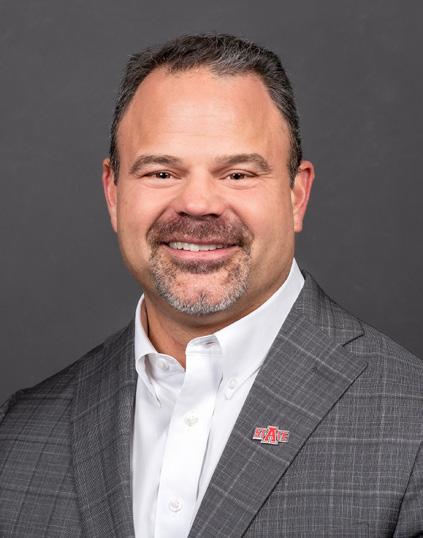
A-State’s approach emphasizes not only technical training but also leadership, communication, resilience, teamwork, professional growth and R&D. The A-State Women’s Business Leadership Center helps students and working professionals build confidence, skills and networks to lead in any industry. It is a statewide mentorship program, open to all A-State students, that connects emerging leaders with experienced mentors worldwide.
The center is a powerful example of how career growth and reinvention are possible when mentorship and higher education work together.
We are also strengthening pipelines through partnerships with ASU-Newport and Arkansas Northeastern College in Blytheville,, preparing students for high-demand careers in steel, food processing and automated manufacturing — all backed by a $10.5 million state grant.
True workforce development is not only about filling jobs; it is about building capacity in schools, hospitals, companies and communities. It means giving first-generation students the chance to earn a degree that changes their family’s future. It means supporting leaders who keep institutions strong and economies resilient. It means creating clear connections between careers and education for everyone who needs training and skill development during their lives.
It means equipping employers to invest in their own teams. National data shows companies offering tuition reimbursement see a 129 percent return on every dollar spent through higher retention, stronger performance and long-term talent development. In other words, education pays off — for both the learner and the employer.
Todd Shields is chancellor of Arkansas State University in Jonesboro.
Todd Shields
ARKANSAS GROWTH OPPORTUNITY PROFILE: population health innovations and clinical research
By AMP Staff
hances are, most people are familiar with the term, “population health.” After all, the concept has rapidly gained popularity over the past decade, influencing the way health care providers, states and the nation approach health care. But what is it? One way to think about it is that traditional health care typically centers on diagnosing and treating individual patients after they become sick, while population health focuses on the well-being of groups of people, including proactive approaches to health disparities across demographic groups (rural versus urban, for instance). In other words, population health endeavors to prevent disease rather than just treat disease.
Population health improves the quality of life for communities and cuts costs on doctor visits, medical treatments and hospital stays. That approach could prove transformative for Arkansas, a state with considerable health care challenges that ranks near the bottom in areas such as cancer mortality, heart disease, obesity, diabetes and many other preventable diseases. If Arkansas implements evidencebased population health practices at scale, the projected economic impact could exceed $3 billion over the next decade.
Arkansas can turn existing health care challenges into a significant opportunity by leveraging an already strong health care industry, positioning the state to lead the way in population health innovation. The Arkansas health care industry has 47,000 private-sector employees. When combined with the public sector, the Arkansas employment base is 18 percent more concentrated than the U.S. average. The nonhospital life sciences industry subset of the health care sector is making outsized gains in Arkansas too. Though modest when it comes to employment size (3,400), the state’s life sciences sector has grown by 25 percent versus 15 percent nationally.
Add to that private investment in innovation in the form of venture capital and research-and-development spending by Arkansas companies. Venture deals totaled $80 million across diagnostic equipment, pharmaceutical and biotech companies. Again, while modest in dollar value ($8 million) for privatesector R&D spending in medical equipment and supplies manufacturing, the Arkansas growth rate in the category has averaged 300 percent versus the 60 percent U.S. average.
Taken together, the data suggests knowledge and financial capital are present and starting to flow toward growing opportunities in population health innovation. Over the next 10 years, that category is on track to create 780 new jobs and outpace the national average with a growth rate of 23 percent, and that is if we just maintain the current trajectory of employment and investments. Arkansas, though, has a secret ingredient to unlock greater health care and economic potential: enabling infrastructure.
The state has built a solid foundation in health data sharing and analytics — enabling infrastructure and tools that are essential for understanding and improving community health. Think of enabling infrastructure as a health data exchange. For example, the clinical data repository at the University of Arkansas for Medical Sciences in Little Rock integrates UAMS electronic health records with the all-payer claims database for powerful uses. That lets researchers ask disease-specific questions, integrates clinical and genomic data to offer personalized interventions, and leverages natural language processing to extract knowledge from unstructured data. Enabling


“Arkansas has intentionally invested in an ideal set of assets and talent to advance population health.”
— Bryan J. Barnhouse, president and CEO, Arkansas Research Alliance
infrastructure is the connective tissue that provides insights into key market forces, costs, risks and patient outcomes that guide applied research for improved health care delivery.
That infrastructure supports and is supported by clinical research, which plays a vital role as an enabler for advancing innovations in population health by providing evidence for preventative interventions, treatment and health promotion strategies.
Such strategies are backed by cutting-edge research at the University of Arkansas for Medical Sciences, which is in the process of achieving a coveted National Cancer Institute designation. That is in addition to exciting digital health efforts from private-sector health care providers and insurers such as St. Bernards Healthcare and Arkansas Blue Cross and Blue Shield.
Innovations include remote telemetry for patient monitoring, retinal artery scans for assessing coronary disease and virtual nursing using artificial intelligence. In addition, Arkansas’ network of hospitals, universities and research institutions plays a key role in testing new treatments, prevention strategies and health programs that can improve outcomes for entire populations.
The market pull for population health is also strong given the significant health disparities Arkansas faces, especially in its rural communities. The opportunity that stands out for Arkansas is to become a “living lab” for population health technology commercialization that gives the state a competitive advantage when generating external research funding, launching startups, and attracting existing and emerging companies to the state.
“Arkansas has intentionally invested in an ideal set of assets and talent to advance population health,” said Bryan J. Barnhouse, president and CEO of Arkansas Research Alliance.
“The state reflects the health challenges confronting the nation. With the right support, we’re also a state positioned to meet those challenges by leveraging infrastructure and intellectual resources already in place.”
According to the IMARC Group, a global management consulting firm, population health management will be a $350 billion industry worldwide by 2023. North America currently leads the population health management market, driven by a strong focus from government agencies on preventive care and chronic disease management. Arkansas is technologically equipped to leverage the growth opportunity through the state’s extensive clinical informatics capacities, led by the Arkansas Center for Health Improvement and buttressed by translational and clinical research centers at UAMS, the University of Arkansas in Fayetteville, and the U.S. Food and Drug Administration National Center for Toxicological Research in Jefferson County.
Barnhouse said he sees advances in population health as a win for Arkansas on multiple levels.
“By focusing on population health, Arkansas has a strong chance to spark innovation that boosts the economy — bringing in research dollars, creating new startups, attracting companies and making life better for everyone in the state on multiple fronts,” he said.
How can Arkansans fully leverage this opportunity? To start, download ARA’s groundbreaking report, Enabling an Innovation-Led Future for Arkansas, and become fully acquainted with the opportunities research affords the state’s economy and way of life. The report is available for free at aralliance.org/ resources/#report.
Extreme Makeover Baptist Health College getting facility, technology upgrades
By Dwain Hebda
Baptist Health College Little Rock is a multidisciplinary institution of higher learning that offers 10 programs of study to hundreds of students every year. Accredited by Accrediting Bureau of Health Education Schools, the Arkansas State Board of Nursing, the Arkansas Department of Higher Education and nine additional program-specific accreditations, the college is also backed by the medical expertise and stability of Baptist Health. In fact, in 2021, the college observed its 100th anniversary, a testament to its long service to the community of producing generations of health care professionals.
Yet save for the people enrolled in the academic programs, those who teach them and those who came before, Baptist Health College is arguably the quietest success story in central Arkansas, if not the entire state, a best-kept secret gem on the educational landscape. It is a fact not lost on Troy Wells, CEO of Baptist Health.
“We have, over the years, provided a lot of health care professionals, nurses and allied health care folks to the entire state of Arkansas,” Wells said. “We’ve been training nurses the entire time that Baptist Health has existed, and we’re one of the largest graduating institutions of [registered nurses] around.
“What we do is really important to the state of Arkansas, but you’re probably
right — a lot of people may not be familiar with our college. Telling our story is kind of a low-key part of our operation.”
Wells, along with the school’s executive leadership, are on a mission to change all that thanks to a major renovation that will serve the students of today and help attract the health care workers of tomorrow seeking first-class, state-of-the-art educational programs. To that end, the administration is thinking big — as in $21 million big — which Wells sees as a critical investment in the college’s future.
“I would argue that we’ve got the best clinical training around, but nowadays, people are looking for certain tools and technology,” he said. “That’s something you have to have these days to be competitive and to raise the bar in terms of the training that students get while they’re in school.”
Visibility issues aside, the college’s record is a long and proud one across a number of medical disciplines, going back to its incorporation in 1921 alongside the hospital. That year produced the first five graduates of the Baptist State Hospital School of Nursing, and three years later, the initial 17 graduates of Baptist Health Schools walked the stage.
Over the next 30 years, the institution grew rapidly to include several other courses of study, including schools of radiology (1953), practical nursing (1964), medical laboratory science (1965),
The college’s record is a long and proud one across a number of medical disciplines, going back to its incorporation in 1921 alongside the hospital.
histotechnology (1976), nuclear medicine technology (1979) and coding technology (1985). The college’s schools of surgical technology and occupational therapy assistant would be established in 1999 and 2005, respectively, the latter being a partnership with the University of ArkansasPulaski Technical College in North Little Rock.
The school has actively sought other partnerships to help students enjoy a seamless march toward their desired degree. In 2010, the institution entered into agreements with the University of Arkansas at Little Rock and Pulaski Tech to offer degree completion in a variety of disciplines.
Baptist Health Schools was rebranded Baptist Health College in 2015, after gaining certification through ADHE to grant degrees. Today, the college offers academic programs in medical laboratory science, nuclear medicine technology, occupational therapy assistant, patient care technician, practical and traditional

Baptist Health CEO Troy Wells believes the training offered at Baptist Health College is important to the state.
(Photos by Lori Sparkman)


“About 50 to 60 percent of the nurses that we graduate in a given year will come to work for Baptist.”
— Mike Perkins, president of Baptist Health Medical Center-Little Rock
nursing, radiography, sleep technology, and surgical technology. It also offers an accelerated nursing track for licensed practical nurses and paramedics wishing to become RNs.
Since 1989, the college has been housed in its current location at 11900 Colonel Glenn Road in Little Rock in a building originally constructed as an outlet mall but never opened as such. That has given students and staff plenty of space, but as with any structure, time has necessitated updates to the building and made expanding classroom technology mandatory. The current capital fund drive and subsequent refurbishment is the first to be done to the building since Baptist Health College Little Rock moved in, making the improvements well overdue.
“It’s just time to update and modernize not just for competitive reasons but also because the needs of the students change, as do the ways that we teach and educate,” said Mike Perkins, president of Baptist Health Medical CenterLittle Rock, Baptist Health Rehabilitation Institute in Little Rock and Baptist Health College. “Some of the work that we’re doing is to really update and create a simulation and skills lab featuring high-fidelity mannequins. Those mannequins are really about as close to an actual real-life experience you can get without it being real-life patient.
“The new labs will provide simulation opportunities that are very specific to various programs. These real-life settings with real-life responses from
the high-fidelity mannequins will provide some training opportunities that don’t exist today in our college.”
Investment in Baptist Health College does more than benefit the company behind it. A robust institution of its kind is also a major factor in the improvement of the health and wellness of the greater central Arkansas community. Health care workers are in short supply across the U.S., a by-product of massive numbers of retirements and burnout defections during the COVID-19 pandemic.
As reported by The Hill, the shortage is a double whammy for the nation’s health care infrastructure — not only are aging baby boomers fueling the tidal wave of nursing vacancies through their retirement, but they are also fattening the number of people who are at ages that typically require more care. The publication cited U.S. Census Bureau figures that showed 56 million Americans are 65 or older, up from 40 million in 2010
Roughly half of BHC graduates go on to work at Baptist Health.
Marshall
said she hopes this year’s Bolo Bash activities will yield substantially, with proceeds being turned over directly to the refurbishment project.
and headed toward an expected peak of 77 million over the next decade.
Those unprecedented numbers are already placing undue strain on the health care field, and experts predict it will get worse before it gets better. The Bureau of Labor Statistics projects a shortfall of almost 200,000 nurses in five years, and the number of openings for home health aides and personal health aides will increase 37 percent over the coming decade.
Such statistics not only underscore the critical importance of institutions capable of training the next waves of health care workers but of providing the kind of educational experience and career opportunities that hang onto them after graduation. A recent study by The New York Times revealed the states with the highest brain drain, defined as individuals ranked in the top one-third of education distribution living in a state other than their birth state. That study found almost half of college-educated residents in Arkansas headed for greener pastures, leaving Arkansas 44th out of the 50 states.
A better educational experience combined with being connected to a hospital and health care system potentially gives Baptist Health College a better-thanfighting chance at retaining that talent after graduation, which substantially benefits the local health care community.
“The people who come to our college are going to be, for the most part, from the area,” Perkins said. “Using nursing specifically, about 50 to 60 percent of the nurses that we graduate in a given year will come to work for Baptist. At the same time, we’re not just training people for Baptist; we’re training a good

percentage of people who will go to work for other hospitals and other clinical settings across Arkansas. We see our work as something that is not just good for Baptist Health but good for the community and the state.”
Helping to fund the improvements is the Baptist Health Foundation, which has earmarked proceeds from the annual Bolo Bash fundraiser toward the Baptist Health College improvement project. Comprised of multiple events, Bolo Bash is one of the longest-running corporate fundraisers in Arkansas, now in its 35th year. Money raised helps support organizational goals and projects for the hospital and health system across a variety of needs.
“Baptist Health is Arkansas’ largest and most comprehensive not-for-profit health care organization,” said Janet Marshall, chief development officer at the foundation. “We have 12 hospitals in the system. We have a nursing home and 250 points of access statewide. Through all of that, Baptist Health Foundation is proud to be the fundraising arm for all of those institutions and all of those points of access. We just love being able to go out and talk about all the good things that Baptist Health does for Arkansans.”
Marshall said she hopes this year’s Bolo Bash activities, the largest component of which is September’s Bolo Bash Golf Tournament, will yield substantially, with proceeds being turned over directly to the refurbishment project. AY Media Group is a sponsor of this year’s golf event, which is slated for Sept. 15 and 16 at Chenal Country Club in Little Rock.
Sponsorship levels start at the $2,000 hole sponsorship and run the gamut
“Baptist Health is Arkansas’ largest and most comprehensive not-for-profit health care organization.”
— Janet Marshall, chief development officer
from $3,000 to $25,000 that include one to four four-person golf teams and various levels of exposure and perks. Morning and afternoon tee times are available both days for the golf scramble, which includes a lunch buffet, prizes and more. This year also marks the debut of an all-female team division.

Bobby Gosser, president and CEO of Baldwin & Shell Construction Co., and Clay Gordon, president of Kinco Constructors, serve as cochairs for the event. They said they were inspired to head up the golf tournament due to the quality of the event, the cause behind it and having seen Baptist Health’s impact up close.
“We’ve had a long business relationship with Baptist for many years and just always been appreciative of them and the impact they have on our community and state, frankly, with their services,” Gordon said. “We’ve got a lot of employees in the state, and I know many of them and their families are served by Baptist. That’s something that made me want to participate [as co-chair], and hopefully, people will see this event as important, and they will want to come out and help and participate, as well.”

“It’s a two-day event on one of the nicest golf courses in the state,” Gosser said. “Chenal does such a great job of hosting, I mean, it’s just top notch. It’s not a huge lift on our part as co-chairs; my biggest lift is, as a nongolfer, to talk up support from those I reach out to. When you’re talking about the largest health care institution in the state run by really top-notch people, folks really want to get behind that.”
For more information on this year’s Bolo Bash Golf Tournament, visit baptisthealthfoundation.org/events.
Bobby Gosser
Clay Gordon
State schools look to expand net, provide value
By Mark Carter
The only certain things in life are death and taxes, the saying goes, but each year — without fail — leaves fall, calendars flip, and prices rise. What a consumer could expect to pay for a car, a doctor’s visit or even a loaf of bread in 1989 is much different than what one would expect to spend today.
That tenet of supply and demand applies to the cost of higher education, as well. Colleges and universities are awash in overhead, from faculty salaries to public relations, and higher education as an industry is not immune to inflation. A trend exacerbated greatly by the COVID-19 pandemic saw enrollment at U.S. fouryear colleges and universities drop significantly beginning in the 2010s before starting a slight rebound two years ago.
However, U.S. undergraduate enrollment remains 2.4 percent below prepandemic levels, the National Student Clearinghouse Research Center states.
Conventional wisdom holds that enrollment began dropping because a college education had become increasingly expensive and would-be students were determining that the ROI of a traditional four-year college education did not match the potential debt accrued from student loans necessary to pay for that experience. Tuition at Arkansas colleges and universities rose by an average of 4.24 percent from 2020 to 2025, according to the federal Integrated Postsecondary Education Data System.

STAYING AHEAD ON THE HILL
The University of Arkansas in Fayetteville has been in growth mode for decades and sets records each fall as campus and city officials work to find new spots for student housing. Including graduate students, the university reported more than 33,000 students on campus in 2024. It was the only college or university in the state to experience an enrollment increase during the period of the COVID-19 lockdown, perhaps buoyed by its high profile within the state, its status as the state’s land-grant university and its Carnegie classification as the state’s only “R1” high research institution.
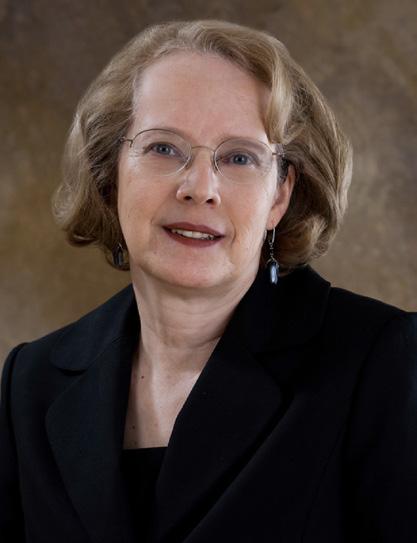
That does not mean the UA was not working to ensure continued growth. Since 2019, the university has grown scholarship funding for in-state students by $7 million, while 98 percent of in-state freshman students who applied for scholarships in 2024 received financial assistance, said Suzanne McCray, vice provost for enrollment management and dean of admissions on the Hill.
She added that cost remains a leading factor for students when determining where they might attend college or if they will even do so.
“The cost of a college education is almost always a consideration for high school students and their families when that time comes,” she said. “The University of Arkansas is committed to making a college education accessible and affordable for all our students but, most importantly, for Arkansans. We take very seriously our land-grant mission to serve our state. Overall, we have awarded more than $100 million in need-based scholarships and grants to undergraduate students, and we think those are just some of the factors that have led to our record retention rates — above
A robust need-based scholarship program has fostered high retention rates at the University of Arkansas in Fayetteville. (Photo provided by the UA)
Suzanne McCray, UA (File photo)
86 percent — and in the fall, we will be welcoming one of the largest freshman classes in our history.”
Last fall, the UA launched its Land of Opportunity scholarship campaign. McCray said its purpose is to create an endowment to bridge the gap in funding for academically qualified Arkansas students who have a high level of financial need, including those eligible for Pell Grants.
“Our goal is to raise $200 million for this program. We immediately started with more than $120 million, including a generous gift of $100 million from the Hunt family. This push centers on student success, one of the cornerstones for our 150 Forward Strategic Plan,” she said. “Land of Opportunity scholars will engage in wrap-around student success support, including mentoring, academic coaching, financial planning and career readiness programs that lead to higher retention and graduation outcomes. We have added three financial aid and literacy coaches to our advising team to assist students as they complete the FAFSA, apply for additional scholarships and negotiate college costs.”
To counter industry changes wrought by the pandemic, the university strengthened its scholarship offerings but also prioritized recruitment efforts.
“Our admissions office has had to pivot in many different ways since 2020, and some of those strategies are still in effect today,” McCray said. “Each year, our goal is for our recruiters to visit every high school in the state. We feel those in-person interactions are crucial to getting the right information to students who are considering what their next steps are after high school. We want them to know they can be part of our Razorback community and that we have student-success-minded faculty and staff who will help them every step as they earn a degree that will launch them toward a successful career.”
The UA recently joined the Small Town and Rural Students College Network, a group of 32 national research institutions specifically working to expand college access to students in rural areas. In addition, McCray said the university has increased online information meetings, and its online Tuesday Talks series covers topics related to admissions, completing the FAFSA, signing up for housing, applying to the UA’s honors college, getting involved on campus and more.
Research from the National College Attainment Network from 2024 found just a third of students surveyed reported that public, four-year institutions were “affordable.” Arkansas was one of 10 states in which more than half of the colleges and universities awarding Bachelor of Arts degrees were considered so.
Affordability may still be the primary concern for students considering the college path, but academia continues to wield a potent arrow in its quiver — the on-campus experience.
“Today, students are really looking for a connection to a place that makes them feel like they belong. As much as we are online and digitally connected, students still want the in-person experience,” McCray said. “We heard this sentiment repeatedly from students and their families after the pandemic. Students are eager to hear about and eventually participate in campus life. Some will embrace sitting in the student section at a game, running for student government, giving back at the volunteer action center or joining one of the more than 400 student organizations we have on our campus. Students are looking for meaningful experiences that
can also build their resumes.”
The draw of campus life at a flagship university such as the UA that competes at the highest level of college sports can help offset concerns about affordability. The University of Central Arkansas in Conway transitioned its athletics department from the NCAA’s Division II to Division I in the 2000s, and phenomenal growth ensued. From 2022 to 2007, UCA enrollment grew from roughly 8,500 students to more than 12,500, a school record. In addition to other measures the school took to attract more students, at least part of its growth was attributed to UCA scores being included on the ESPN tickers running across its entire broadcast network, a luxury reserved for DI schools.
That exposure alone was invaluable in expanding the UCA brand.
The UA benefits from the legacy of the Razorbacks as the state’s lone “power conference” team and membership in the Southeastern Conference, the biggest stage in college sports. Many out-of-state students are attracted to Fayetteville — for the 2024-2025 school year, more than 9,000 of the UA’s in-person undergrads hailed from neighboring Texas.
“Students are attracted to the University of Arkansas in record numbers due to affordability, innovative programs, state-of-theart facilities, student engagement opportunities, world-class, supportive faculty and a student-first approach — all located in one of the nation’s best places to live,” McCrary said, noting Fayetteville’s seemingly annual recognition as one of the best places to live in the country. “Student success is central to our mission, and part of that means creating a sense of belonging for all our students. We are setting overall records in various ways, but a sign of our success as a land-grant institution is the record we set for the number of Arkansans enrolled, and that number is continuing to rise. All our students want to thrive socially and academically, to be part of a community that supports their efforts and an institution that will launch them professionally. The University of Arkansas provides this and more.”
EXPANDING ACCESS IN LITTLE ROCK
Officials at the University of Arkansas at Little Rock had been considering measures to slash tuition even before COVID-19 changed the game in 2020. After riding out the lockdown, UA

Christina Drale, UA Little Rock
(Photo provided by UA Little Rock)

Little Rock launched its Trojan Guarantee and half-off tuition scholarships.
The Trojan Guarantee, in its second year, is for incoming freshmen and covers the cost of tuition and mandatory fees up to 15 hours after all federal, state and institutional aid is applied. The scholarship covers up to half of students’ in-state tuition and course fees up to $5,000 per term, and is renewable. The scholarship is renewable for the spring semester for students earning at least a 2.25 GPA over 12 hours in the fall.
UA Little Rock was the first institute of higher learning in the state to offer a zero-cost bachelor’s degree path and a half-off tuition scholarship. It is also the only Arkansas college or university to offer a campus work-study program in addition to federal work study.
Christina Drale, UA Little Rock chancellor, said the scholarships have led to increased interest at recruiting events and increases in the school’s last couple of freshman classes.
“These are good signs, good indicators for us,” Drale said. “COVID certainly had a huge impact. It was a significant setback. We’d certainly be further along otherwise. Prospective students and their families were beginning to question the value proposition of higher education. We worked hard to lower the net cost of going to UA Little Rock. We worked very hard not to raise costs and package financial aid and raise money for financial aid. In terms of actual costs for attending a four-year university, we’re one of the lowest in the state. We had to be as creative as we could to offer a high-quality college education for not very much.”
On the heels of COVID-19 and more high school students opting for other postgraduate paths, college officials are now preparing for the potential impact of the dreaded “enrollment cliff” — the decline in the number of high school students and thus high school graduates expected to hit the United States this year. Fewer high school graduates, regardless of which career or education path they may have chosen after graduation, means less potential incoming freshmen.
The enrollment cliff is generally attributed to a decline in the U.S. birth rate during the Great Recession of 2008 to 2011. Drale said UA Little Rock is “very cognizant of it,” adding that UA Little Rock’s status as the only true urban university in the state helps offset any negative impact from the drop in the number of available students.
“We’re not 100 percent dependent on high-school-aged students,” she said. “We serve a substantially metro population. One of the things we take advantage of is our significant number of nontraditional students.”
While many may still view UA Little Rock as a nontraditional campus, Drale said the school has “a mix of students that is not typical for four-year universities.”
UA Little Rock has residence halls and the other trappings associated with a typical college or university but has also expanded its extended education and online offerings, which Drale called robust.
“We also offer a lot of predevelopment programs,” she said, adding that those programs include construction management and nursing. “We offer workforce development opportunities at both the twoyear and four-year levels. I’ve been a strong advocate for expanding the notion of what workforce development really is. We just do it in different ways. All of our education is career-path education.”
As an urban university, the school’s mission is to serve the needs of the metropolitan area it serves, Drale said.
“We’re part of the fabric,” she said. “As a state and society, we need to invest in all levels and types of education. Eighty-five percent of UA Little Rock graduates remain in Arkansas and contribute to the state economy. We’re the anchor institution in the market. We want to make this a reasonable price for a very good product and enable more Arkansans to achieve a college education without debt. It’s all about giving people something and enabling them to go further and enjoy a better lifestyle.”
REMOVING BARRIERS IN MOUNTAIN HOME
Bentley Wallace, chancellor of Arkansas State UniversityMountain Home, said college has indeed become too expensive for many families, and that is where two-year schools like ASUMH play a crucial role.


“We offer high-quality education and career training at a price that students can actually afford,” he said. “More and more of our students graduate with no student loan debt at all. We prove every day that college doesn’t have to come with a lifetime of financial burden.”
Wallace said ASUMH has worked hard to remove financial and logistical barriers for students, including by offering one of the lowest tuition rates in the state, “robust” scholarship and grant
Bentley Wallace, ASUMH (Photos provided by ASUMH)
UA Little Rock is taking steps to make college more affordable for students through programs such as the Trojan Guarantee. (Photo provided by UA Little Rock)
opportunities and free textbook options for many classes.
“Our new student success center brings together advising, tutoring and career support in a single student-friendly space,” he added. “We also deliver courses at flexible times, online and in person, so students can learn in the way that works best for their lives.”
As a two-year school, ASUMH’s job is to prepare students for the workforce or for the transition to a four-year school. Wallace attributed its growth to staying “laser-focused” on what students and the community need, such as investing in high-demand programs that lead to high-paying jobs, building partnerships with local industry, health care and education leaders, and keeping costs down. He said the college path still maintains its value, but “value today is about more than just the degree on the wall.”
“At ASUMH, we design programs that connect directly to jobs in our region, so whether a student is entering nursing, technology, manufacturing or transferring to a four-year university, their degree opens doors,” he said. “Because we focus on both skills and credentials, our graduates are workforce ready and in demand.”
Wallace said he believes there is a strong case to be made for the argument that some form of higher education should be available for free.
“When states invest in higher education, particularly at the community college level, they’re also investing in workforce development, economic growth and social mobility,” he said. “If students are willing to put in the work, we believe cost shouldn’t be the thing that holds them back. ASUMH already does everything we can to minimize financial obstacles, and state-supported tuition models could amplify those efforts significantly.”
The ASU system acquired the old Mountain Home Community and Technical College in 1995. In 2000, ASUMH moved from downtown to a newly constructed campus on South College Street. Wallace said the college, home to roughly 1,500 students, has become woven into the fabric of the region, serving the Twin Lakes area as an economic driver.
“As we’ve grown, we’ve been able to offer more career pathways, serve more students and strengthen our local economy,” he said. “We work closely with employers, school districts and health care providers to meet workforce needs and provide opportunity right here at home. In turn, our community has rallied around us, from supporting scholarships to attending events to serving on advisory councils. We also have a community-supported arts and culture movement on campus that is a huge success due to community engagement. These partnerships make north central Arkansas stronger and more connected.”
PROVIDING OPPORTUNITIES IN MORRILTON
Like ASUMH, the University of Arkansas Community College at Morrilton has benefited from its affiliation with a statewide system. Opened in 1961 as Petit Jean Vo-Tech, the school’s name changed to Petit Jean Technical College in 1991, and it joined the UA system in 2001 to become UACCM.
The school reported 2025 spring enrollment of just fewer than 2,900 students, and it has experienced growth of 30 percent over the past five years. Workforce and skilled trades students make up roughly 40 percent of UACCM students.
Chancellor Lisa Willenberg attributed the growth to the cost of attendance at two-year schools staying lower than general


consumer net-prices increases and noted that the school’s enrollment increases came largely from concurrent students, as well as short-term and noncredit workforce training.
“That’s good for higher education,” she said. “It also signals and supports movement toward greater confidence in higher education, including [costs] not being an issue keeping prospective students away. More specifically, the modest rising costs do not appear to be keeping prospective students away from two-year schools, as many continue to record enrollment increases.”
Willenberg credited the ACCESS Act, signed earlier this year by Gov. Sarah Huckabee Sanders, with helping “widen the net” to make education more accessible by increasing high school credit availability. The bill expands accelerated high school coursework concurrent credit courses or similar programs approved by the state education department and allows weighted credit to be applied to accelerated courses.

“It has greatly aided in this, making the state Acceleration Scholarship available to sophomores through seniors for up to 30 college credit hours per pupil per year,” she said. “Another way we are widening the gap is to increase offerings to business and industry through customized training. Two-year community colleges are the best value in the state and have long provided skilled trades training to those wishing to hone their technical skills.”
The country’s large labor gap remains an issue as workers in manufacturing and skills-based jobs retire. Willenberg said she believes workforce training programs will continue to rise in popularity as companies’ needs become more strained.
“The many inbound businesses and industries being recruited to Arkansas only contribute to the gap. As they say, it’s a good problem to have, though we don’t see it as a problem at UACCM,” she said. “We view it as an opportunity and welcome addressing the need.”
Lisa Willenberg, UACCM (Photos provided by UACCM)
Gov. Sarah Sanders signed the ACCESS Act into law earlier this year. (Arkansas Governor’s Office)
Virtual learning in Arkansas continues postpandemic boom with some new features

By Doug Crise
As an undergraduate, Tyler Knight learned how to tiptoe through online learning.
“I did one online course when I was an undergrad,” said Knight, co-director of Harding University in Searcy’s northern European study-abroad programs. “It was, ‘Hey, read this, and then post your thoughts,’ and that kind of was it.”
It has been a while since online coursework was something new. Starting in very rudimentary form in the 1980s, online learning exploded near the turn of the century as colleges and universities spearheaded web-based classes as a means of meeting the demands of nontraditional students.

Online classes, at the outset, were a cost-effective way of servicing students who could not attend classes in the traditional sense. Those early days had a bit of a Wild West feel as educational institutions experimented with different online services and formats. The results were mixed. Some courses faithfully replicated the classroom experience, while others operated at a bare-bones minimum that failed to match the rigor of in-person classes.
Saying things have changed since then would be an understatement, and most of that points back to a year when online learning jumped from option to necessity — the onset of the COVID-19 pandemic in 2020.
“It’s really interesting to see the evolution over time,” Knight said. “I started teaching online courses before COVID. Obviously, COVID accelerated the comprehension of what you can accomplish.”
Nowadays, online classes are as much a foundation of twoand four-year colleges as classrooms and dorms. With many institutions of higher learning facing declines in physical enrollment, using the web remains a vital way of attracting tuition dollars.
For those who think there are some subjects that cannot be taught via a screen, think again.
“The newest frontier in online learning is, I would say, augmented reality,” said Jennifer Swartout, associate vice president for general education at NorthWest Arkansas Community College in Bentonville. “For instance, if you are in a nursing-type program or a clinical-type program, virtual reality can create an entire world where you are practicing clinical skills in an environment that mimics a real-life environment, but you’re


not going to be hurting anybody by failing.”
Virtual reality has been around in various forms for a while, but marrying it with traditional online learning has proven to be a game changer. Nowhere has that been more true than with two-year colleges, which tend to offer more hands-on classes.
While online classes are perfectly fine for, say, learning economics, many vocational classes have not had the same luxury. It is hard to learn how to repair air conditioners, for example, without an actual air conditioner in front of the student. Advances in virtual reality have made that kind of interactive learning more accessible, swinging open doors to enrollment that used to be closed.
Given that so many two-year colleges place an emphasis on career readiness, the days of “easy” online courses are mostly long gone. Rigor is not just a desired outcome — it is vital. Nobody, Swartout said, would offer online classes for something like nursing unless they knew it would stand up to anything also

downtown Little Rock, the Arkansas Virtual Academy functions out of a sweeping, open-plan office floor that looks more like a successful tech startup than a center for K-12 online education. Teachers and administrators work from desks, where they are joined by counselors, special education professionals, testing coordinators and curriculum specialists.
In short, it feels like walking into a recently constructed school — minus the students.
“A lot of people would be surprised, but ARVA started in 2003,” said Amy Johnson, head of school. “Back then, it was still dial-up days, and so everybody was still trying to figure out if this could even be a mode of education.”
Johnson characterized ARVA as being just like any public school in the sense that the faculty and staff are constantly looking to improve the educational process, whether that be through new teaching methods, improved curriculum or better classroom management. It just does not happen with students physically present.
“What’s beautiful about ARVA is because of its virtual nature, we can provide some of those innovative opportunities and really investigate what works and what doesn’t work,” she said.
Johnson echoed her collegiate counterparts when she
offered in the traditional classroom.
“There are accreditation standards for meaningful interaction online,” Swartout said. “If your interaction as a student is very thin, that’s probably a course that isn’t well designed. In our college, we really have an entire apparatus that we’ve developed over the last couple decades to ensure quality, and then we monitor how classes are designed and how students are interacting.”
Yet, ironically, one of the biggest signs of virtual learning’s surge in Arkansas can be found in a physical building. Headquartered in
pointed to the COVID-19 pandemic as a turning point. With virtual learning not just evolving but actually becoming mandatory, the training wheels came off in terms of what can be offered to remote students.
“I think for a lot of people, that’s when the cat came out of the bag,” Johnson said.
Since then, ARVA has ramped up its offerings to students, which now include career coaching, advanced-placement classes and classes that double as college credit. Students take the same
Jennifer Swartout

standardized tests as their brick-and-mortar counterparts, and the school offers field trips and social opportunities.
“People are surprised that we have building-level principals,” Johnson said. “We have prom and graduation. We have a fall dance for our kids, so there’s a lot of crossover.”
Johnson said there is no single cohort when it comes to the type of student who enters ARVA’s virtual doors. There have been elite-level athletes whose travel and training schedules require a quicker, more open-ended pace, and there have been students who blossom emotionally and academically in a home setting.
“We have sort of that bucket for high-flying kids that have other interests or want to speed up their educational experience,” Johnson said. “We have several students that come to us because they have some sort of emotional issue. They’ve been bullied. They may have extreme anxiety. We also have students that haven’t been successful in a brick-and-mortar setting.”
The arguments against online learning as a permanent K-12 option are many, starting with socialization. Critics claim daily interaction with peers in a physical school is necessary for a student’s mental and emotional well-being. Johnson did not discount that but maintained socialization at a traditional school is not always what it is cracked up to be and that socializing is not a one-size-fits-all proposition anymore.
“One of the things I say a lot is that a K-12 experience shouldn’t just be this right of passage,” Johnson said. “Like, you have to go sit in a classroom for 13 years before you can start your real life. That’s kind of, in some ways, what we’ve made it.”
With 5,500 students representing all 75 Arkansas counties, ARVA’s mission is clearly resonating within the state.
“If I had to summarize all of that into one reason I hear from parents, it’s that they’re looking for something very individualized and very specific for a need their student has,” Johnson said.
Virtual education may not appeal to everyone, but it is not going anywhere. Johnson recently received approval to push ARVA’s enrollment to 7,000, and Swartout predicted the number of NWACC students benefiting from improved virtual reality learning will only grow with time.
“In theory, absolutely,” Swartout said. “We are exploring ways to offer that kind of distance learning to all of our students and in as many programs as possible.”

“One of the things I say a lot is that a K-12 experience shouldn’t just be this right of passage. Like, you have to go sit in a classroom for 13 years before you can start your real life.”
— Amy Johnson, Arkansas Virtual Academy

Online education has evolved, but just like any tool, it still comes down to the person or persons using it.
“I may not be popular for saying this, but it really comes down to the adults,” Knight said. “They’re kind of responsible for the students and their education. Any sort of online platform really comes down to the instructor and how rigorous it is and how well they enforce that rigor.”
100%

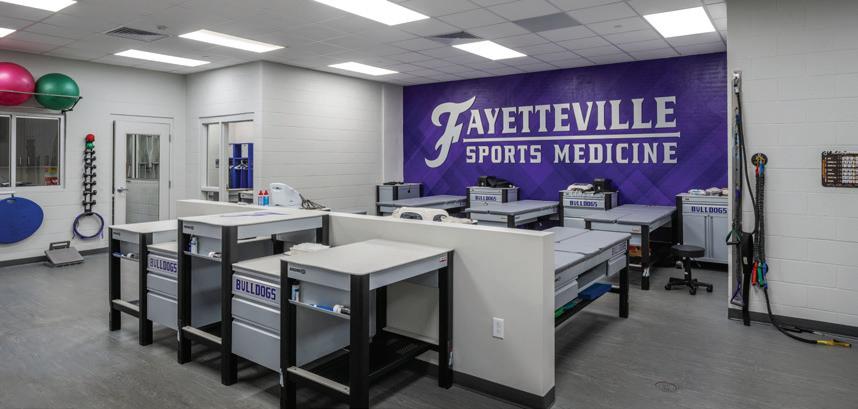


WE
LARGEST Public School
Districts in Arkansas
Arkansas is home to 237 public school districts (26 open-enrollment charter districts), including 1,060 K-12 public schools and 318 public high schools. Below is a list of the top 10 public school districts in the state by enrollment for the 2024-2025 school year, according to the Arkansas Department of Education.
Source: ADE

Little Rock Central High School (NPS)
Unmatched Opportunities




Arkansas State University is the only institution in Arkansas where you can go from freshman to physician on one campus.
Planned to open in fall 2026, A-State’s CVM will provide the future workforce to care for the region’s pets, wildlife and livestock. A state-of-the-art facility where researchers work at the intersection of medicine and agriculture to improve human health.
A-State Online is the largest provider in Arkansas, with online Red Wolves in every corner of the state and around the world.

















EDUCATIONAL ROI
Leaders in higher ed focus on value, nontraditional students as they eye enrollment cliff
By Sarah DeClerk
TThe higher education landscape in Arkansas is changing. The newly signed Arkansas ACCESS Act has challenged colleges and universities to ensure a robust return on investment from their programs in the form of postgraduation earnings and employment while enhancing noncredit workforce training.
Meanwhile, institutions of higher learning are preparing to navigate a demographic trend known as the enrollment cliff stemming from a significantly reduced pool of high school graduates. Add to that emerging technology and shifting industry needs, and it is clear that colleges and universities need to be smart about balancing budgets, structuring programs, and recruiting and retaining students.


MAJOR MERGER ON THE HORIZON
North Arkansas College in Harrison is preparing to join the University of Arkansas System, Rick Massengale, president of the soon-to-be North Arkansas College of the University of Arkansas, said the merger is a boon to the college’s students, employees and community.
“We’re just a small piece of the puzzle, but they are a bigger piece of the puzzle,” he said. “With their resources and us with our skill sets that we bring to the table, it gives our region here that ability to at least have the opportunities to have the same education that they’re getting in some of the major areas of the state.”
Students who earn their associate’s degrees from North Arkansas College will be able to complete their four-year degrees at the U of A for Northark prices, he said, while employees can advance their education using in-system
Chris Thomason, vice president of planning and development at the University of Arkansas System, speaks about the upcoming merger with North Arkansas Community College in Harrison.
(Photo courtesy of Northark)
Instructor Rick Williams will teach the drone program at North Arkansas College. (Photo provided by Northark)
discounts. The merger also allows for partnerships with the UA System Division of Agriculture Cooperative Extension Service and other system-affiliated entities, he said.
A FOCUS ON PARTNERSHIPS
Colleges and universities across the state are honing in on partnerships with industries, K-12 schools and the local community. At Arkansas State University, Chancellor Todd Shields is banking on the success of the school’s athletics program to facilitate community engagement.
“In many ways athletics is the front porch of the campus to the community,” he said. “It’s really helped the community and industries become involved in ways they never were able to before, and that’s been great for the campus, it’s been great for students, and it’s been great for the industries too.”
He added that ASU has been working with Arkansas Northeastern College in Blytheville and ASU-Newport to provide workforce development programs in manufacturing, food processing and steel, as well as providing research and development for steel companies.
Other ways the university is working to address workforce shortages include enhancements at its medical school and the forthcoming college of veterinary medicine.
Northark is working with the Clinton School District, Clinton Municipal Airport and Dawson Aircraft to provide hands-on aircraft maintenance training to high school seniors, said Massengale. The college is also working to meet the needs of the future by

building the Northark Center for Robotics and Manufacturing Innovation and conducting drone training in partnership with the U of A.
Meanwhile, Southern Arkansas University in Magnolia is partnering with companies such as Albemarle and Standard Lithium to prepare students for careers in the burgeoning lithium industry, said Bruno Hicks, president. SAU is also working to expand its engineering program and partners with local public schools to provide education in science, technology, engineering and mathematics, he said.
Partnerships are front of mind at the University of Arkansas at Monticello, said Chancellor Peggy Doss. The university’s campus-within-a-campus model, the first of its kind in Arkansas, allows students at several two-year colleges to earn four-year degrees in areas such as nursing, education, computer information systems and business administration from UAM without leaving the campus where they earned their associate’s degree.
“That’s a way that we’re doing outreach across the state to be able to deliver more four-year degrees to areas of Arkansas that those students may not always have the opportunity and the ability to go to other places or to travel to a campus,” she said. “We are expanding that program and will continue to expand that program with other community colleges across the state.”

A similar program is
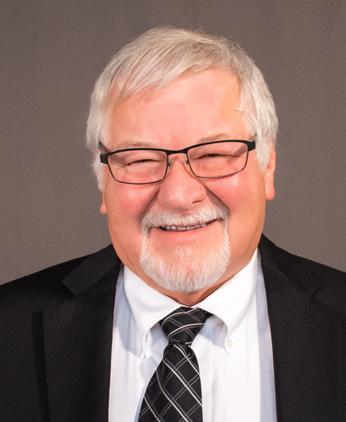


Bruno Hicks
Rick Massengale
A student participates in the phlebotomy program at UAM McGehee. (Photo provided by UAM)
Arkansas State University in Jonesboro is banking on its athletics program to help facilitate community engagement. (Photo courtesy of ASU)
Peggy Doss
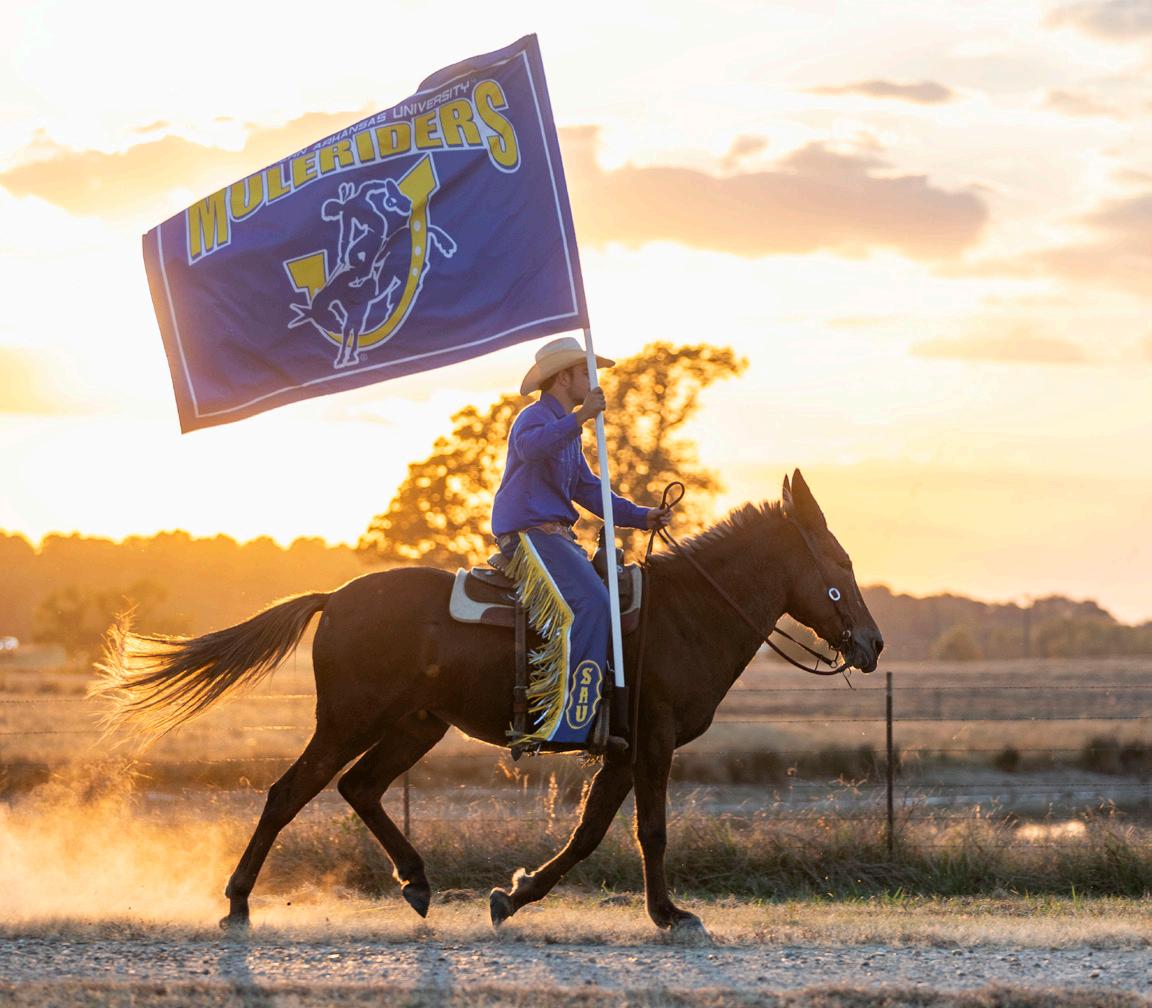
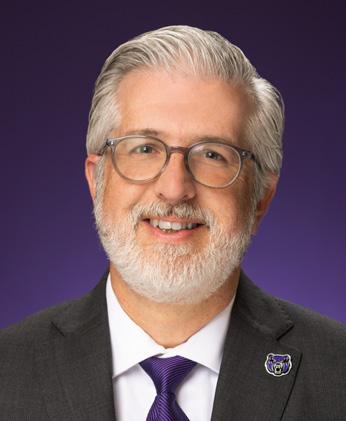

There is the public perception of, ‘Am I getting a return for my collegiate experience?’
—
Todd Shields, ASU
underway to provide phlebotomy education to students at the University of Arkansas for Medical Sciences in Little Rock.
UAM is also working on a pilot program for a collegiate academy that would allow select high school students from Drew Central School District in Monticello to study on the UAM campus and graduate high school with an associate’s degree.
That is on top of existing partnerships with Five Oaks Duck Lodge, and Doss said she expects the Arkansas Forest Health Research Center currently under construction to facilitate further engagement with the forestry and agriculture industries.
THE ENROLLMENT CLIFF
The enrollment cliff weighs heavily on the mind of Houston Davis, chancellor at the University of Arkansas in Conway, who began helping UCA prepare for the drop-off in enrollment when he joined the university in 2017.
“We began looking not at things that we had to do in 2017 but looking forward. We talked about the bridges that we would need to de -
velop into the fiscal year ῾ 26, ῾ 27, ῾ 28,” he said. “That was kind of crazy to be talking about a decade before we really had those pressures.”
Taking a revenue-centered management approach, the university began working on “right-sizing” its staff, shrinking from 1,475 to 1,330 full-time employees over the past eight years with no layoffs, Davis said. Right-sizing scholarships was also a concern, he said, adding that it would be a mistake to award excessive scholarships or significantly reduce tuition in hopes of attracting applications from a shrinking pool of students.
UAM is working to offset the impact of the enrollment cliff by not only working to make its offerings attractive to traditional students but by reaching out to nontraditional and stop-out students. Doss said the university is exploring flexible degree options and providing students with “on- and off-ramps” that will allow them to leave and return to higher education as they advance in their careers.
RESTORING CONFIDENCE
As manufacturing jobs that promise six-figure salaries for recent high school graduates and concerns about student loan debt have more people questioning the value of a college degree, one of the biggest challenges for colleges and universities is restoring confidence in higher education.
“It’s hard to overcome the national narrative, the constant beating of the drum that it’s not worth it to get a degree,” Davis said. “You’ll hear people talking about hundreds of thousands of dollars of debt that students take on. Well, that’s not the story when it comes to University of Central Arkansas or Arkansas State University or Arkansas Tech [University in Russellville]. That’s not what’s happening.”
He added that UCA has worked to change that narrative through the UCA Commitment, which provides students a debt-free path to a college degree.
Shields named a lack of confidence as one of the main obstacles to higher education, adding that it is important to promote the value of earning one’s degree.
“There is the public perception of, ‘Am I getting a return for my collegiate experience?’ and I don’t think that higher education’s done a good job of saying, ‘Yeah, you really do,’” he said. “I mean, studies show that people who go to college make a lot more over their career. They’re promoted more frequently. They do better. They have better quality of life. They live longer.”
CAREER READINESS
One of the keys to restoring confidence in higher education is demonstrating that students get a good ROI for their degrees. Perhaps no school is more bullish on that than SAU, which recently launched the Mulerider Next Step Guarantee, which provides graduates with additional training if they are unable to secure a job or placement in a graduate degree program after leaving SAU.
“That’s an interesting initiative, and it seems to have caught people’s attention with what we’re trying to do,” Hicks said.
Houston Davis
Southern Arkansas University in Magnolia is looking to highlight its return on investment with the Mulerider Next Step Guarantee. (Photo by Thomas Turner, SAU)
“It’s really making sure that they’re ready for the workforce and that we help them in all the ways we can as a campus to make sure that our career services have put them in touch with the right people to do that next step.”
Davis said he is excited about noncredit programs such as the UCA Aviation Academy and the Arkansas Coding Academy that allow students to earn certifications without having to invest time and money in a four-year degree.
“I think higher ed’s going to be called upon to be a little more entrepreneurial and think about how can we not just be in the mold of traditional academic programs, but how can we think about workforce credentials?” he said. “I love that we’ve broken the ground with a couple of really good examples in the last five years. It’s exciting to think that we’re well positioned for the future of that.”
THE ARKANSAS OUTLOOK
Building on the groundwork of the Arkansas LEARNS Act, the Arkansas ACCESS Act works to streamline the pipeline from K-12 education through higher education and into the workforce. The act’s emphasis on ensuring ROI and facilitating K-12 and industry partnerships reinforces some of the work already underway at Arkansas colleges and universities.
“One thing I love about ACCESS is that it’s really put a light on the connec-

tions between K-12 and higher education,” Davis said. “I’m really excited about some of the focus there that I think will come from being able to bridge not only relevance but just the strength of the curriculum coming out of K-12. I love that higher ed gets to be a part of developing that as we prepare the teachers.”
He added that he appreciates the act’s nod toward support for short-term certification programs and that he embraces the productivity funding model put forth by the degree.
“I like that there’s going to be an element of the funding formula to be able to measure the value of a degree and making certain kids’ families are investing their hard-earned dollars in a degree that can provide them with any opportunity or upward mobility for advancement, whatever that means in their life,” he said. “I’m excited about that.”

The University of Arkansas at Monticello is home to the region’s premier forestry program. (Photo provided by UAM)
THE FEDERAL OUTLOOK
President Donald Trump has been vocal about some of the changes he would like to see in higher education, and leaders at institutions of higher learning in Arkansas are most concerned about cuts the federal government may make to grant programs that help fund university programs and make college a possibility for many students.
Shields and Hicks expressed concern about potential cuts to Pell Grants, while Massengale said he was worried about National Science Foundation grants that fund various forestry programs, as well as first-generation students reliant on Federal TRIO programs. Davis added that his institution is watching for any changes to accrediting bodies.
Hicks said that he ultimately hopes an understanding of the value of higher education will prevail at all levels.
“I think we’ll see more and more students accessing higher education in more pathways than just the traditional fouryear degree,” Hicks said. “Then we’ll see more opportunity for people in the workforce to use higher ed as a tool for gaining more knowledge and skill sets that progress their career and help the industries that they’re in. I see the relevance of higher ed increasing over the next few years, not going down.”
The University of Central Arkansas Aviation Academy in Conway allows students to become workforce ready without a four-year degree.
(Photo provided by UCA)

HITTING THEIR STRIDE
Academies of Central Arkansas leading the way in career readiness
By Dwain Hebda / Photos provided by Academies of Central Arkansas
In the fall of 2021, a new program for developing career readiness launched in local high schools, and just four years later, the Academies of Central Arkansas is hitting a major milestone.
“Next school year, starting in August, will be the first year that we are at full implementation,” said Markous Jewett, vice president of Academies of Central Arkansas at the Little Rock Regional Chamber, which administers the program. “That means that all ninth through 12th graders in any of the four school districts are enrolled in an academy at their high school campus.”
approach is based on the Ford Next Generation Learning Model developed in Michigan, which systematically walks students through career exploration, preparation and application.

The milestone caps several years of phased-in implementation for the academies, which founders modeled after a similar program in Nashville, where local schools saw bumps in graduation and attendance rates, in addition to preparing students for the next steps after high school. The academies
“Next year, it’ll be wall-to-wall kids in an academy of their choosing,” Jewitt said. “We’re really excited about that because that’s when you start to see some of those major educational outcomes shift even more than we’ve already seen. We’re also really excited about some of the metrics that we’ve seen from the academy lens and how it’s impacting student learning, student outcomes and student experiences.”
At the time it was unveiled, the academies program was arguably the state’s most ambitious effort to date for addressing the severe shortage of labor in the state, particularly as it applied to skilled careers. A situation created by years of
Students receding emphasis by school districts and exacerbated by massive baby boomer retirement and the impact of COVID-19, manufacturing, industry, transportation and construction industries across the state have been stretched to the limit by personnel shortages, driving up costs and curtailing growth.
Recent statistics show the situation continues to get worse. Last year, McKinsey & Co. described the U.S. skilled labor market as “facing record-high pressure, particularly for companies with manufacturing and construction operations.” The organization assessed labor needs across several skilled careers in the U.S., including welders, construction laborers and electricians, and posited that from 2022 to 2032, annual hiring in those roles will approach 600,000 positions, more than 21 times the projected annual increase in net new jobs, pegged at about 27,000.
The yawning gap is predominantly caused by job churn. Of the more than 1.6 million construction laborers employed in 2022, for instance, McKinsey & Co. predicted only 169,000 will stay in those roles through 2032, while 1.2 million will churn and 260,000 will retire in that time frame. While turnover in such entry-level positions is expectedly higher, the trendline is similar in roles that are considered more skilled. Of the 763,000 electricians on the job in 2022, only 72,000 are projected to still be working in 2032, and only 12,000 welders out of 432,000 employed in 2022 are expected to be on the job 10 years later. In both instances, job churn outpaces retirements as the source of outmigration at a rate of 2 to 1.
The impact of the situation can be seen in cost and stunted industry growth. Talent acquisition and training costs alone could run as high as $5.3 billion annually, the organization noted, which does not include billions more in lost productivity. The kicker? All that spending is largely needed just to make up the gap in workers, maintaining essentially flat staffing levels. McKinsey & Co. noted that despite soaring demand for construction projects, new job growth in the industry is projected to be miniscule at just 60,000
Markous Jewett
The Academies of Central Arkansas provide hands-on exposure to a variety of careers.
construction laborers, 50,000 electricians and 6,000 welders anticipated over a decade. That results in net new job totals of 58, 49 and 6, respectively, nationwide.
Arkansas’ industrial, manufacturing and construction companies know all too well the dire labor shortage and its impact. Lexicon, a Little Rock-based diversified steel business, has seen the effect of years of skilled careers being downplayed in the public school system to the point some districts ceased shop and other trade- and farm-focused classes at their facilities altogether.
“Over the years, our education system really focused more on the college-for-everyone concept,” said Viji Kuruvilla, Lexicon’s vice president of quality. “It was the push that was the setup for universities, that 80 or 90 percent of graduates were to go in the direction of being college bound. That system has created a huge gap in developing craft personnel, skilled labor, or areas of manufacturing or construction or other trades.”
School, the company announced in May the creation of the Lexicon Academy of Advanced Manufacturing and Construction there. Completion of the academy will invest students with Occupational Health and Safety Administration 10 and welding certifications, making graduates immediately in demand.

“Lexicon built a 10-booth facility in two trailers with five welding booths each for students to practice their welding skills,” Kuruvilla said. “We also provided oversight in developing the curriculum and also helped the instructor with the certification process. At the end of high school, when students graduate, they will be ready to do welding with the sufficient qualifications and credentials.”
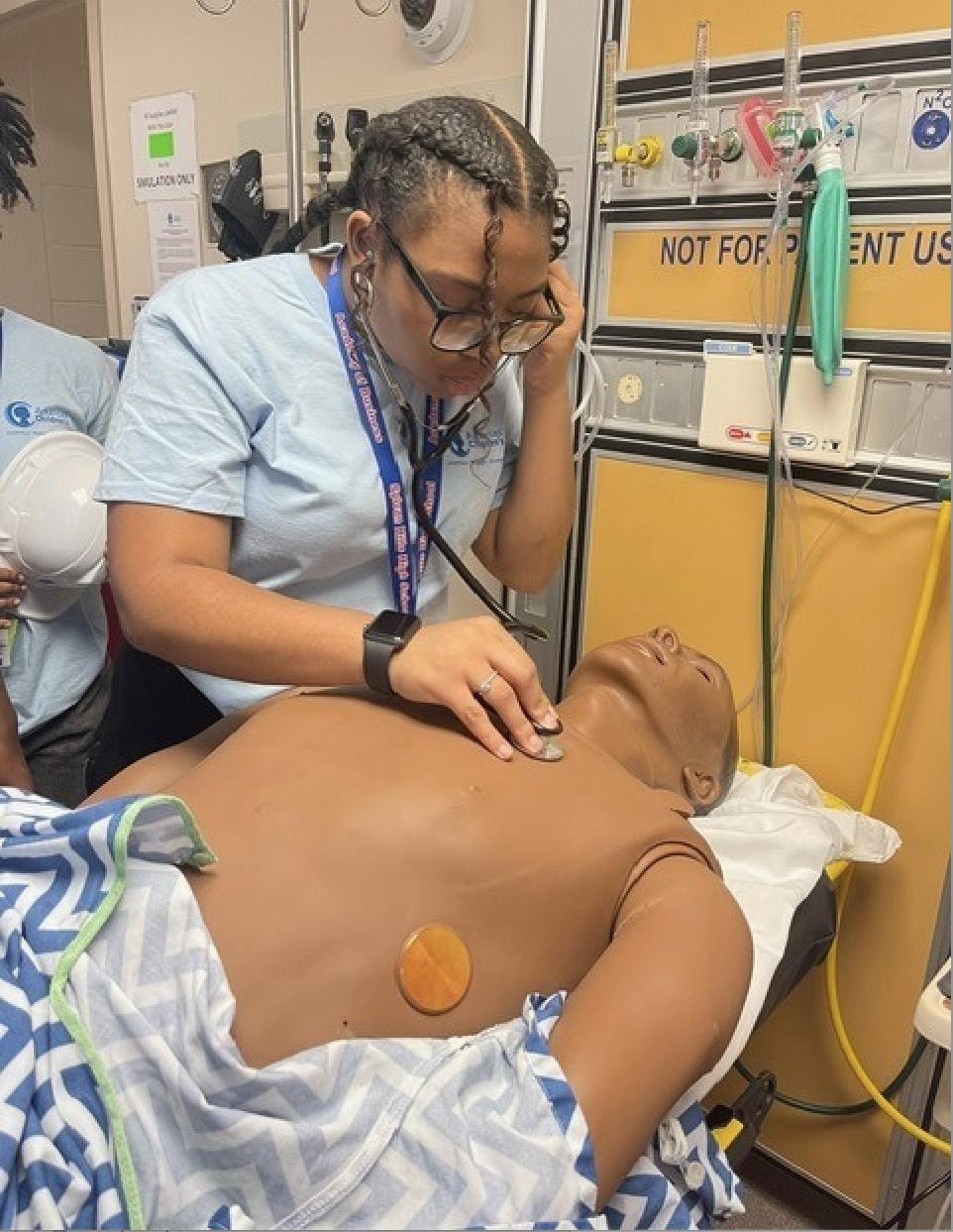
Concurrent credit options allow high school students to complete college coursework before graduation.
One of the key elements of the Academies of Central Arkansas approach is connecting in-school programs with external corporate partners. Lexicon is one of those partners and in a big way; having already built welding facilities at Wilbur D. Mills University Studies High
Kuruvilla suggested that if the academy was successful, it could serve as a blueprint for replicating it at other schools in the Central Arkansas Academy program. If initial interest at Mills is any indication, that could happen sooner rather than later.
“Three years ago, we started the pledge to graduate on the career pathway, and at

that time, we just said there’s a construction pathway coming,” he said. “There were 10 to 15 students who signed up for the construction pathway initially, which had instructional learning only. Second year, it had little bit more traction. This year, they saw the welding lab, and 80 freshmen signed up for the construction pathway. We immediately needed to add an additional instructor.
“Right now, we are in a first phase, right, but we see the progress it is making in terms of interest. We want to see how many of them successfully finish up, but we already have a goal of building a state-of-the-art facility on Mills property. We have identified an area where we can build a 10,000-, 15,000-square-foot building, and we expect that to happen in the next two or three years.”
Anecdotal evidence abounds when it comes to the positive impact such programs are having. Jewett shared one example related to Lexicon’s Mills project as typical of the kind of healthy influence the academies seek to have on students, especially those who need it most.
“There were three students at Mills High School that were in the welding pathway who were habitually truant. We’re talking hardly at school,” he said. “All three happened to show up on the
Viji Kuruvilla
Worksite tours and company internships are part of the academy curriculum.

same day to their welding class on the day that students were welding in the labs built by Lexicon. They were really excited about going in there and welding, but the teacher said, ‘Hey, I’m sorry, you can’t go in there because you haven’t passed the safety requirements that we did in class the last couple weeks. You can’t go in the lab until you do that,’ so they sat there and they watched.
“Those three students, it blows my mind to say it, they haven’t missed a day of school since just because they wanted to get into the labs and do that hands-on experience and work with the industry partners. That’s just one example, but I think it’s a really powerful example, and those are the types of things that we’re hearing across campuses, across schools and across the academies.”
The academies operate in 10 high schools in the Little Rock, North Little Rock, Jacksonville-North Pulaski and Pulaski County Special school districts. In addition to Mills High School, the program is in play at Jacksonville High School; Joe T. Robinson High School, Hall-West High School of Innovation, Parkview Arts & Science Magnet High School and Little Rock Southwest Magnet High School, all in Little Rock; Maumelle High School; Sylvan Hills High School in Sherwood; and both North Little Rock High School and the North Little Rock Center of Excellence.
Career areas offered vary by location and include construction, health sci-
ences, engineering, computer science, entrepreneurship and agriculture, to name a few learning tracks. Students’ first year is largely spent exploring different career options, and activities become progressively more hands-on as students move through their high school careers, up to and including internships and apprenticeships with partnering companies.
Also included are targeted classes addressing communication, work habits, problemsolving and other soft skills. Jacksonville-North Pulaski Superintendent Jeremy S. Owoh said those skills are critical for career success.
“One of the things that we have really stressed — and we stress it in middle school, but more emphasis is made in ninth grade and the freshman academy — is on those soft skills,” he said. “When you really think about it, the most important thing is that creativity, that innovation, that critical thinking, along with technical skills. They have to be able to not just think one plus one equals two, but what if we add one plus one plus C plus two to get something more outside the box of what we’re normally accustomed to?”
“At the same time, one of the most important things that our young people need to realize is at some point, they’re going to have to think beyond AI on that creative level. I want to do A plus B plus C and then move all the way down to X, Y and Z, so how do I think beyond just the basic level of HVAC or electrical work to do things outside the box? I really feel like that’s where we’re headed and that’s where we need to be headed.”
Jewett agreed while also noting that the Academies of Central Arkansas now have an even wider role to play in the state’s labor picture. The Arkansas LEARNS Act, passed after the academies were launched, contains specific language about how public school systems need to formally address career readiness in students. That has led a number of school districts in Arkansas to look at central Arkansas for a blueprint on how to meet that requirement, he said.

Jeremy S. Owoh
Owoh said for the academy programs to continue to flourish, they must keep pace with the latest technology but do so in the right way, as a powerful tool rather than a crutch.
“One of the things I really see us doing — we have really taken a proactive stance on innovative technology and the role that generative [artificial intelligence] plays in education and will continue to play in life and especially in industry,” he said. “What I really see us doing is evolving and continuing to be creative and ensuring that innovative technology is immersed into those pathways.
“I was fortunate to be appointed as one of a dozen folks from across the state to sit on the governor’s task force after LEARNS had been launched to figure out the rulemaking process and what it looks like,” he said. “There was a lot of conversation with everyone at the table around what the perfect career readiness program looks like. I didn’t say a word, but I was humbled when someone in the room said, ‘Isn’t this exactly what they’re doing with the Academies of Central Arkansas?’ so we’re aligned very well, and we’re really excited about that alignment of all the factors that go into it, from programming to school accountability. I think we’re set up for success.”

Students learn about high-paying careers, some of which require little to no college coursework.
Students interact with partnering companies to discover potential careers.
EXPERIENCE AFFORDABLY COLLEGE,
Discover a campus where opportunity meets community.
From hands-on internships to more than 800 events a year, UA Little Rock is built for students who want to get involved and get ahead.
Explore your interests. Build your future.
And with the Trojan Guarantee, qualified students can earn a bachelor’s degree with zero tuition.
Expect More—in every direction.





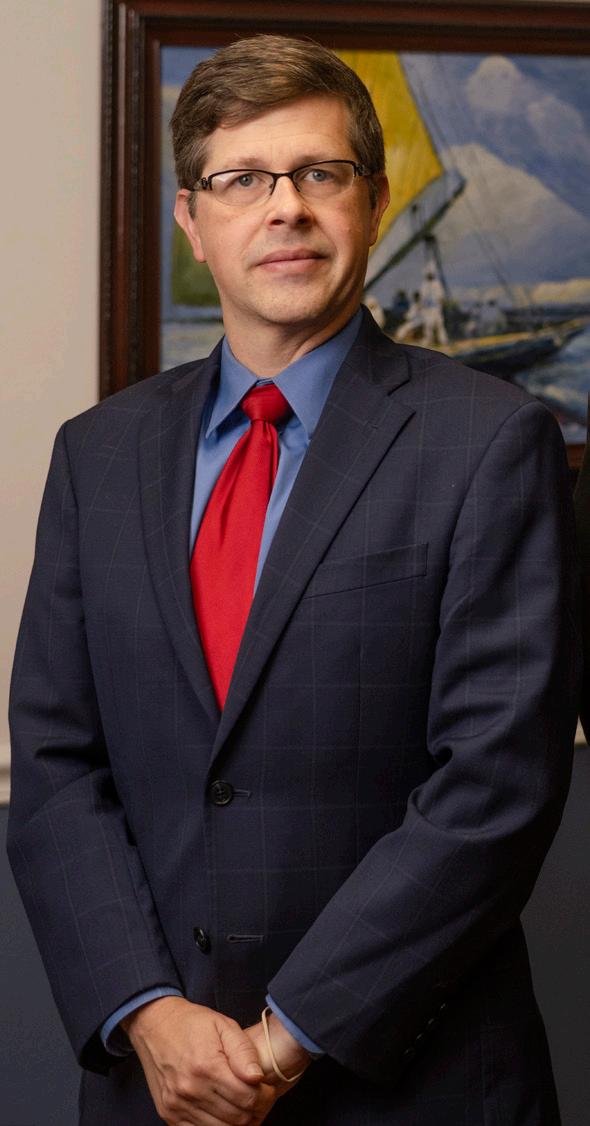

Neil Denman
Deron K. Hamilton
MINDSET ENTREPRENEURIAL UA LITTLE ROCK PROGRAM FEEDS
By Mary LeSieur
While college campuses around the United States have seen fluctuating enrollment rates over the past decade, the University of Arkansas at Little Rock is witnessing the opposite at its innovation and entrepreneurship programs, which have become the school’s key focus within its school of business.
The UA Little Rock School of Business is experiencing the influx firsthand: Entrepreneurship education has grown significantly, and students are now more than ever pursuing degrees in entrepreneurship and innovation.
“People are realizing that entrepreneurship is not just about launching the next big tech company,” said Yue Zhao, department chair for the management, marketing and technology program. “It is about learning how to think creatively, solve real problems and build something that matters. More students want to create their own path instead of following a traditional one.”
ate change where they live. That is exactly what entrepreneurship makes possible.”
UA Little Rock categorizes the newfound entrepreneurial evolution as a game changer, betting on the fact that increasing its investment, involvement and implementation in entrepreneurial and innovative fields will promote sustainable economic development.

According to the British Educational Research Journal, the rapidly growing degree track is also linked to economic growth on the state level, which equips new generations of business professionals to develop successful entrepreneurs and an entrepreneurial mindset.
“More people want to build something of their own, something meaningful,” Zhao said. “We are seeing both students and professionals take a fresh look at what their careers can be. Entrepreneurship education gives them the tools to not only chase their ideas but also to make a real impact.
“Here in Arkansas, where small businesses truly form the backbone of our communities, those skills are more important than ever. People want freedom, purpose and the ability to cre-
Yue Zhao
“Entrepreneurship education teaches people how to identify opportunities, take smart risks and build something sustainable,” Zhao said. “When students learn how to turn an idea into a real product or service, they are not just helping themselves; they are creating jobs, keeping talent in Arkansas and contributing to local communities.
“Every small business that starts here, grows here and stays here adds strength to our state economy. That kind of growth from the ground up is what Arkansas needs more of. At the UA Little Rock School of Business, that is a big part of our mission. We are focused on preparing innovative leaders who are ready to help grow Arkansas not just academically but socially and economically. We want our students to walk away not just with a degree but with the mindset that says, ‘I can build something right here.’”
The university offers a specialized certificate program for those wanting to enhance their entrepreneurial skills. Students can pursue an entrepreneurship and innovation concentration through the Bachelor of Business Administration management track. Nearly 20 percent of UA Little Rock’s management students are pursuing the degree, underscoring a growing impact of entrepreneurship education in the capital city.
Although it is continually growing within the business school, Zhao says the program is being utilized by students across the campus.
“Our innovation and entrepreneurship programs have seen strong growth,” said Zhao. “They are attracting students from all kinds of majors, not just business. That is exactly what we hope for because the spirit of entrepreneurship applies across disciplines. We have focused on making the coursework practical and engaging, with hands-on experiences that extend well beyond the classroom.
“All of this ties directly back to the mission of the school of business: to prepare students to lead in a constantly changing world. We are not just offering academic programs; we are building problem solvers, creative thinkers and future founders who are ready to step up and make a difference.”
The program also fosters hands-on experience and offers students insights in a real-world setting.
“One of the highlights of the year is our annual Entrepreneur-
insight, access and opportunities that truly enrich their learning experience.”
Across the state, several other colleges and universities are fostering similar programs. However, Zhao attributes the school’s prominent success to its location and connections.
“There are other strong entrepreneurial programs across Arkansas, and many are doing great work to support innovation in different regions,” she said. “What makes UA Little Rock stand out is our location and our access. Being in the capital city gives our students access to business leaders, government agencies, nonprofit organizations and startups.”
Students in her program are not just learning inside classrooms either, she said.
“They are networking, interning, pitching ideas, and being part of conversations that are shaping policy and progress,” she said. “The school of business has a clear vision to be a key driver of economic development in Arkansas. We take that seriously. We are not just teaching theory; we are giving students the skills and

ship Day,” Zhao said. “Students actually sell their products to the campus community, making real business transactions and receiving real-time feedback. It is an experience that builds confidence and shows them how to apply what they are learning in a real-world setting.
“We also connect our students with local business resources. We have a strong relationship with the Venture Center [in Little Rock], and we collaborate closely with [the Arkansas Small Business and Technology Development Center in Little Rock]. Our advisory board members, along with leaders from local companies and a variety of industries, are actively engaged in supporting and shaping the program. Their involvement gives students
WE ARE NOT JUST OFFERING ACADEMIC PROGRAMS; WE ARE BUILDING PROBLEM SOLVERS, CREATIVE THINKERS AND FUTURE FOUNDERS WHO ARE READY TO STEP UP AND MAKE A DIFFERENCE.
the support they need to shape the future of this state.”
Zhao said the program currently houses about 80 students, and many more are showing strong interest. She added that she expects the number of students choosing the track for their major to grow.
“While most students cchoosing the track for their major as the main emphasis for their bachelor’s degree, we also have students pursuing it through the certificate option,” she said. “We built this program to align with the state’s priorities and the local small business environment. Strategically, we’ve recently been putting major focus and energy into the entrepreneurship program. We’re actively developing it into one of the flagship programs within the school of business.”
— Yue Zhao UA Little Rock School of Business
FOUR-YEAR COLLEGES AND UNIVERSITIES IN ARKANSAS
University of Arkansas, Fayetteville
Arkansas State University, Jonesboro
University of Central Arkansas, Conway
Arkansas Tech University, Russellville
University of Arkansas at Little Rock
University
Southern

University of Arkansas at Monticello
Ouachita
Charles Robinson, chancellor
Todd Shields, chancellor
Houston Davis, president
Russell Jones, president
Christina Drale, chancellor
Terisa Riley, chancellor
Michael Williams, president
C. Lowry Barnes, M.D., interim chancellor
Peggy Doss, chancellor
Charles Pollard, president
Choosing a college can be A
Yes, it can be about who you cheer for on Saturdays. And it’s certainly about the degree you come away with. But it can be so much more. It can be where you discover your calling, where you meet lifelong friends, where you grow in your faith and where you gain the confidence to pursue your dreams. At Ouachita, you don’t have to do it alone. You’ll find your place and your people in the stands at games, in the classroom, at meals and during worship. WE’RE SAVING A SEAT FOR YOU! COME LET US SHOW YOU WHAT WE MEAN.


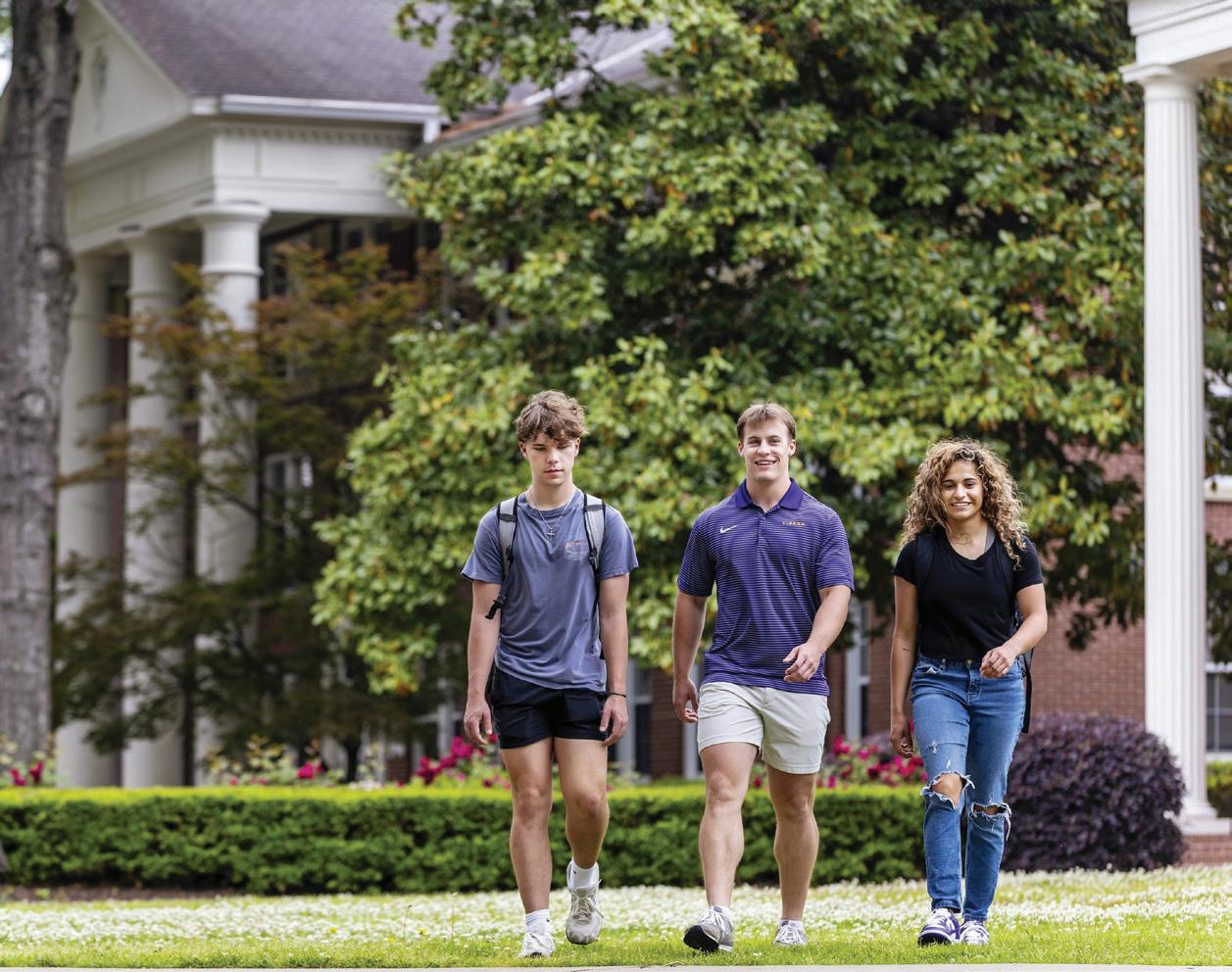

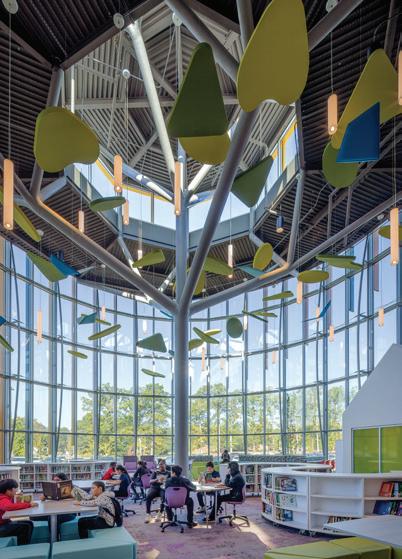





More than five years removed from the COVID-19 shutdown, Arkansas schools still chasing normalcy

By Doug Crise
Sonya Whitfield did not have a guidebook for what was happening.
A 33-year employee of the Pulaski County Special School District, Whitfield was the principal at Baker Elementary School in Little Rock when the nation’s school system shut down due to the COVID-19 pandemic. A lifelong educator, Whitfield was used to consulting with others and using “best practices” whenever any kind of crisis popped up, but zero best practices were available for the total shutdown of student learning. No script existed for how to keep a school district going in the face of something that had never occurred in modern America.
Whitfield, along with thousands of her colleagues nationwide and millions of students and their parents, was cast adrift without an anchor. The world of education is grounded in schedules and calendars. Each class has a set number of minutes, each day has a set number of classes, and each school year has a set number of days. The basic American school year, which had changed little in over a century, was suddenly wiped out with little warning and even less reassurance about the future.
“We were always scared,” said Whitfield, now the district’s deputy superintendent of learning services. “We were scared.”
More than five years have passed since schools shut their doors in the spring semester of the 2019-2020 school year. For many today, the evidence of the sea change in daily school life that took
place is hard to find. Traditions such as Friday football, dances and senior skip days are back like they never left. Inside schools, administrators, teachers and students hustle about from class to class, not much different from how it looked a generation ago.
Dig deeper, however, and there is an education system — both public and private — that is still grappling with the fallout of lost time.
“There was a definite learning loss,” said Steve Straessle, head of school at Catholic High School for Boys in Little Rock. “You know, the world hit the pause button during COVID, and the kids did too.”
Just how much of a learning loss took place has only been recently verified. The Educational Opportunity Project at Stanford University in California and the Center for Education Policy Research at Harvard University in Massachusetts ranked Arkansas 23rd among states for postpandemic math achievement and 19th for reading.
Certain in-state districts, such as Bentonville, Jonesboro, Van Buren and Rogers, have reported math scores that are already above the 2019 pre-COVID-19 numbers. Yet other districts, including Benton, Conway, Little Rock, West Memphis and Jacksonville North Pulaski, were reported to be almost a full grade level behind in math.
The same study found that one of the biggest factors affecting learning loss in Arkansas is largely out of the control of the schools.
Chronic absenteeism, defined as students who miss 10 percent or more of the school year, rose in Arkansas from 22 percent in 2019 to 28 percent in 2024.
“There’s not that urgency about getting kids to school, and it’s not just the kids,” Straessle said. “A lot of parents have taken that route too.”
When Whitfield, Straessle and others talk about making up the loss, it is surprising how little they talk about actual classroom subject matter. Sure, missing months of instruction sets students back — anyone who ever took high school algebra would say as much — but in 2025, the secondary effects of the shutdown have come to the fore. Unlike academic progress, which can be easily charted and affirmed through data, the struggles of today’s students are largely unquantifiable.
“The biggest thing that I see still is soft skills are lacking,” said Luke Davis, an algebra and calculus teacher at Little Rock Central High School.
Davis, who emphasized he was speaking for himself and not the Little Rock School District, said students failing to retain subject matter is part of teaching, and there are always ways to combat it. What he sees now are students who missed a crucial year of social and personal growth, and that is something difficult to put into numbers.
deadlines turned into suggestions. We’re still struggling because they were kind of given a free pass for so long, but now that’s the expectation, so when that free pass is pulled off, they feel like you’re singling them out.”
Straessle said he has faced the same tug-of-war between acknowledging the effects of the shutdown and also pushing for a return to prepandemic standards and expectations.
“For our school in particular, we gave a lot of grace,” Straessle said. “I don’t regret that at all, but after the pandemic, that grace became normalized. By normalizing grace, what that did was steal the urgency of education from the kids.”
Unlike academic progress, which can be easily charted and affirmed through data, the struggles of today’s students are unquantifiable.largely
“The piece that has stuck out the most to me is the communication, the teamwork,” Davis said. “I don’t think we’ve even started recovering from that too well. The knowledge gap, I think that’s getting smaller, but the soft skills loss is still very much the elephant in the room.”
Those interpersonal skills are vital for students and not just for successfully socializing with their peers in the hallways between classes. In modern classrooms, the emphasis on group work and peer-to-peer communication is far greater than a generation ago, and it is not uncommon to walk into a classroom and see desks arranged in groups with teams of students tackling the day’s concepts together. Given that, why are so many students still scuffling when it comes to communication?
Whitfield, with her background in elementary education, thinks she may know why. While high school students were hit with a loss of subject matter knowledge during the shutdown, the younger grades involve so much more than academic material. Those early grades are often where students are taught classroom norms such as how to communicate, how to take turns, how to ask for help and how to keep to a schedule.
All of that was pulled out from under students right at the age where such development begins, and many have been playing catch-up ever since.
“Before, we’ve always done, like, lots of group work and group projects,” Whitfield said. “That’s the life of an elementary school, so learning how to get in a group and talk and take turns and listen and respond, it’s like you had to teach that all over again.”
From his vantage point in the classroom, Davis agreed.
“We heard for two, maybe a little over two years, show them grace and give them extensions,” Davis said, “and for a lot of students,
Yet catching up is not as simple a proposition as going back to the “old days.” A longer shutdown was averted because schools converted to distance learning, providing laptops to students and making curriculum materials available online. Yet when students returned to their school buildings, this time with laptops in tow, educators faced a fresh batch of new challenges such as web surfing and the use of ChatGPT.
Schools have been dealing with the “paper-versus-computer” question ever since.
“We still use technology as a tool,” Whitfield said, “and it doesn’t take the place of a teacher or instruction, so it has its place. We don’t want it to be a babysitter. It can never take the place of an actual teacher.”
The legacy of the COVID-19 pandemic on schools may not, in fact, even be about learning loss. Schools are making up the disruption to academics, though the extent varies from district to district. Likewise, teachers and administrators have doubled down on teaching the sort of behavioral norms students may have missed out on while they were quarantined.
But the increased role of technology? Schools are still feeling the ripple effects. Like so many other aspects of the pandemic, the true outcome may not be known for a long time.
“Prior to the pandemic, we saw what appeared to be the future, which was virtual school,” Straessle said. “I believed that was the future until the pandemic hit. Then you realize that, no, virtual instruction is good for some, but for education as a whole, it is not. You’re getting them out of the regular schedule and out of the daily discipline. We see that was not the right move.”

LITTLE ROCK WEST HIGH SCHOOLOF INNOVATION
Owner: Little Rock School District
Project location: Little Rock
Valuation: $145.6 million
Target completion date: Aug. 1, 2025
Architect: Lewis Architects Engineers
Construction manager: Baldwin & Shell
Electrical/mechanical engineer:
Lewis Architects Engineers
Structural engineer: Greeson, Gatlin, Gangluff & Associates Engineers
WOODLAND JUNIOR HIGH SCHOOL
Owner: Fayetteville Public Schools
Project location: Fayetteville
Valuation: $110 million
Target completion date: July 2027
Construction manager: Nabholz
Architect: Modus Studio
Electrical/mechanical engineer: HP Engineering
Structural engineer:
Tatum-Smith-Welcher Engineers
MAPLE
HILL RESIDENCE HALL
Owner: University of Arkansas
Project location: Fayetteville
Valuation: $100 million
Target completion date: December 2028
Construction manager: Nabholz
Architect: SCM Architects, Henning Larsen
Electrical/mechanical engineer:
ENFRA (formerly Bernhard)
Structural engineer: Engineering Consultants
PINE BLUFF HIGH SCHOOL (new school)
Owner: Pine Bluff School District
Project location: Pine Bluff
Valuation: $74 million
Target completion date: June 19, 2026
Architect: Lewis Architects Engineers; Cromwell
Architects Engineers
Construction manager: East Harding
WYNNE HIGH SCHOOL
Owner: Wynne School District
Project location: Wynne
Valuation: $73.2 million
Target completion date: August 2027
Construction manager: Nabholz
Architect: ARCH1010
Electrical/mechanical engineer: Chad Stewart & Associates
Structural engineer: Chad Stewart & Associates
CENTRAL HIGH SCHOOL’S NEW SCIENCE BUILDING AND FIELDHOUSE
Owner: Little Rock School District
Project location: Little Rock
Valuation: $60.6 million
Target completion date: Sept. 1, 2025
Architect: Crafton Tull, WER Architects
General contractor: Clark Contractors

HOT SPRINGS WORLD CLASS HIGH SCHOOL (phase 1 — new school)
Owner: Hot Springs School District
Project location: Hot Springs
Valuation: $37.5 million
Target start date: Fall 2025
Architect: French Architects
Construction manager: Hill & Cox Corp.
A LOOK AT A FEW OF THE ONGOING, PROMINENT CONSTRUCTION PROJECTS AROUND THE STATE
BATESVILLE
HIGH SCHOOL AND PERFORMING ARTS
Owner: Batesville School District
Project location: Batesville
Valuation: $47.2 million
Target completion date: October 2025
Construction manager: Nabholz
Electrical/mechanical engineer: Brown Engineering
Structural engineer: Engineering Consultants
SOUTHSIDE HIGH SCHOOL EXPANSION
Owner: Southside School District
Project location: Batesville
Valuation: $46.9 million
Target start date: May 31, 2026
Construction manager: Nabholz
BATESVILLE HIGH SCHOOL NEW CAFETERIA AND PERFORMING ARTS CENTER
Owner: Batesville School District
Project location: Batesville
Valuation: $46.6 million
Design publish date: May 27, 2023
Target start date: Aug. 29, 2025
Architect: Jackson Brown Palculict Architects
General contractor: Nabholz
Source: Firms, Dodge Construction Network
ATU FERGUSON STUDENT UNION
Owner: Arkansas Tech University
Project location: Russellville
Valuation: $34 million
Target completion date: January 2026
Construction manager: Kinco Constructors
UACCM
NURSING AND SCIENCE CENTER
Owner: University of Arkansas System
Project location: Morrilton
Valuation: $16 million
Target completion date: Fall 2025
Architect: Crafton Tull
Construction manager: Nabholz
ALICE L. WALTON SCHOOL OF MEDICINE
Owner: Crystal Bridges Museum of American Art
Project Location: Bentonville
Valuation: Not listed
Target completion date: Sept. 1, 2025
Architect: Polk Stanley Wilcox
General contractor: Crossland Construction
Civil/consulting engineer: McClelland Consulting Engineers
Mechanical/electrical engineer: Henderson Engineers
Structural engineer: Martin/Martin Consulting Engineers
Landscape architect: Outdoor Spatial Design



By Arkansas Treasurer John Thurston
John Thurston
(Photo provided)
AFriday night baseball game in Arkansas is pure magic. The stands are full, the food smells amazing, and everyone comes together under the lights to cheer on their team. This scene is all too familiar for the Arkansas Travelers. The Travelers’ games are in full swing this summer, and on July 25, the Travs are teaming up with the Arkansas Brighter Future 529 Plan for a special event at Dickey-Stephens Park in North Little Rock called 529 Night. You do not have to wait until game day to explore the benefits of opening a 529 account, however. I encourage Arkansans to start saving for education today. Thanks to the Brighter Future 529 Plan, getting started is simple and accessible.
Creating a stronger, more resilient state through public service is something I have made a part of my life’s work. I served two terms as secretary of state and two terms as Arkansas commissioner of state lands. When I was elected treasurer of state in 2024, I became responsible for the state’s investment portfolio of $11 billion and was entrusted with several programs designed to help Arkansans be fiscally prepared, including the Arkansas ABLE Plan, the Arkansas Financial Education Commission, and the Brighter Future 529 Plan.
As treasurer, one of my top priorities is helping Arkansans invest their hard-earned dollars safely and wisely. That means advocating for personal financial wellness and promoting smart, secure options for saving for the future, which is why I feel it is so important to share the advantages of the Brighter Future 529 Plan.
The Brighter Future 529 Plan, administered by my office, is a tax-advantaged savings account designed to help beneficiaries achieve their educational goals. Arkansans with a 529 account may use the funds generated to help pay for tuition, books and housing at two- and four-year colleges or universities in the United States and abroad. The 529 savings may also help cover trade or technical school education and student loan payments. Earnings are tax-deferred, and withdrawals are tax-free, which can mean more money for educational pursuits.
I know many parents and grandparents use a 529 plan to save for their children’s and grandchildren’s education, but employers are also recognizing the value of the Brighter Future 529 Plan, especially as more employees pursue higher education to advance their careers and build brighter futures for their families.
According to research from InStride, a company that provides educational insight for companies, 80 percent of employees nationally are interested in going back to school to further their education. That could be for multiple reasons; experts say employees may be pursuing advanced degrees to gain new skills, become more marketable in the job hunt, position themselves for leadership

roles or simply fulfill a personal interest.
ArcBest, headquartered in Fort Smith, is one company that includes the Brighter Future 529 Plan in its employees’ benefit package, and that is something other businesses can do too. ArcBest serves the needs of customers internationally, but it strives to support its own teammates first.
“We take a comprehensive approach to total health, and providing education around the Arkansas Brighter Future 529 Plan is part of ArcBest’s ongoing focus on financial wellness for our employees,” said Erin Gattis, chief human resource officer at ArcBest. “Making plan details easily accessible and offering payroll direct deposit for 529 plans helps prepare employees for future education expenses, reducing the overall stress, worry and financial strain that can come from supporting dependents through college or other continuing education paths.”

Other benefits for businesses offering the Brighter Future 529 Plan to their employees include:
No cost to the company: There are no costs incurred by the company when the 529 plan is included in employee benefits packages, which strengthens a company’s leadership and investment in its staff.
Payroll direct deposit: Payroll contribution is one of the easiest ways families can save regularly and effectively. An employee looking to establish a 529 account simply provides the company’s payroll department with the required information for payroll deductions.
Contribution matching: Businesses can choose to match their employees’ contributions. Employers who do so can receive an annual tax deduction of up to $500 per employee match into a 529 account.
Including 529 payroll deductions in employee benefits packages is a way for

employers to show commitment to education for employees and their families. However, if your company does not offer 529 payroll deductions, you can still open an account on your own and contribute to it directly.
A Brighter Future 529 account can be opened with as little as $25, and contributions may be made at any time or on a recurring basis. A 529 account has the potential to grow at a faster rate than an investment in a comparable taxable account. For those who open an account, there are several benefits, including:
Education options: Having a reliable way to finance your or your family’s education goals can be a true game changer. In just 10 years, a person could save hundreds if not thousands of dollars to use towards K-12 private school tuition, college, university, trade school, apprenticeship programs or student loan debt.
Flexible spending: There is no minimum monthly contribution requirement for a 529 account unless payments are made through a recurring payroll process. A person may change or pause contributions to the account at any time.
Tax benefits: Arkansas taxpayers who contribute may be eligible to deduct up to $5,000 individually or up to $10,000 for married couples filing jointly each year from their adjusted gross state income on their state tax return. Arkansas taxpayers may choose to deduct more and have the option to carry the difference forward in subsequent years. Always check with a tax professional to see what option works best for you.
Plus, anyone can directly and securely contribute to a 529 account and help invest in a student’s future with Ugift. Arkansas givers may also take advantage of the state tax benefit. Each account includes a unique Ugift link that can be easily shared via text message, social media or email, enabling loved ones to make secure one-time or recurring contributions.
Saving for education benefits every Arkansan, whether saving for a loved one’s future education or pursuing education for oneself. As a father, I see this as an opportunity to help knock it out of the park by investing in the future of our children.
Do not forget to support the Arkansas Travelers at Arkansas Brighter Future 529 Night July 25. I hope you and your family will join us for a fun time.
Bottom line, it is never too late to invest in the future to help cover your bases. To learn more or open an account, visit brighterfuturedirect529.com or call 800-587-7301.



Masters in Their Fields
AMP unveils its inaugural class of industry-leading masters
There are some things for which a surface level of insight might do, but for more specialized tasks, it helps to have a master. They are professionals who wake up every day ready to tackle jobs that may leave others hopelessly bewildered, people who have specialized education and training held by very few.
Arkansas Money & Politics is proud to honor these pros in its inaugural class of “Top 10 Masters in Their Fields.” Only one company from each sector was selected to have the elite status of “master.” They are companies that make sure the task they do gets done flawlessly with every job, saving consumers time, money and stress by making sure work is done the right way.
Whether they are moving earth, selling land or cleaning floors; giving homeowners the pools or interiors of their dreams; consulting clients about finances or flowers; or making sure patients have bright smiles or a clean bill of health, these masters certainly know their stuff. Read on to learn what makes these companies the “Top 10 Masters in Their Fields.”
Chris & Katie Apple
ARKANSAS PRO WASH
Keith Cooper, M.D.
CONWAY REGIONAL HEALTH SYSTEM
Matthew Douglas HEAR AGAIN AMERICA
Chris Meyer JAMES A. ROGERS EXCAVATING
Jeremy & Shane Lawson
LUXURY POOL & SPA
Chris Norwood & Christina Day-Essary NORWOOD-DAY FLORAL CO.
Ben Barham PINNACLE ADVISORS
Jahon Zehtaban, DDS SMILE ARKANSAS
Brian Hagewood SOUTHERN INTERIORS
Ben Wellons WELLONS LAND
Arkansas Money & Politics’ Masters in Their Fields
ARKANSAS PRO WASH Master in Commercial Cleaning
Service is a word used by many businesses, but Arkansas Pro Wash is showing what it means to truly fulfill that promise. Since 2009, Arkansas Pro Wash has been the go-to for professional exterior cleaning among commercial real estate owners and property managers in Arkansas. Owners Chris and Katie Apple sold the toolshed out of their backyard to buy their first power washer and have since turned the company into a statewide leader that services properties all over the Natural State with expertise.
“Now we have an incredible team who truly enjoy working together, we’re performing work all across the state and beyond, and are working for a tremendous group of professionals,” Chris said. “It doesn’t get any better than this. Seeing the external growth of the business is extremely satisfying, but that is simply a reflection of the internal growth that has happened within our company and especially within our team.”
The dedicated Arkansas Pro Wash team works day and night, rain or shine, to manage the appearance of clients’ properties. Whether cleaning restaurants, reviving concrete surfaces or washing the facades of office buildings, the Arkansas Pro Wash team has the capacity to get the job done — to the benefit of property owners, whose tenants, patrons and customers find themselves with a clean place to work, eat or visit.
“We really believe that the work we do for our clients matters,” Chris said. “The work we do makes their job easier. It makes a difference for them.”
Recently, the company expanded its service even further to serve busy clients. The company’s CAMPro services allow clients to rely on Arkansas Pro Wash for management

of their overall property image, giving business owners one less thing to worry about. In addition to the master pressure washing services customers have come to know and expect, the company now offers services such as painting, light lawn care, parking lot maintenance and more.
“We’re trusted by commercial real estate services in Arkansas, and they need a vendor they can depend on, one that they can trust in more than just cleaning,” Chris said.
The company also sets itself apart with its three founding principles — serving clients well, serving its employees and serving the community. The Apples want their hardworking team to succeed not only in their professional pursuits but in their personal lives. The couple has hired a company chaplain, connects employees with professional
“We really believe that the work we do for our clients matters.”
arkansasprowash.com 22095 Interstate 30, Bryant Arkansas Pro Wash 501-588-8977
development opportunities, and is mindful to include all employees in furthering the vision and purpose of the company.
“We believe that there is no greater responsibility than building up our team,” Chris said. “We can’t do it without them, and it’s our responsibility to create opportunities for them to win in life.”
Just as important to the team behind Arkansas Pro Wash is the work they do to impact their community and give back. The company has partnered with many local organizations to serve youth in foster care, feed the hungry and engage in a variety of other impactful opportunities.
“Leave your mark — in whatever you’re doing, people should know you’ve been there,” Chris said. “Take ownership of that thing you’ve been trusted with, and leave your mark on it.”

Experience You Can Trust




When you’re responsible for keeping a commercial property looking sharp, every missed detail can feel like it lands on you — from stains on the sidewalk to a tenant complaint about curb appeal. That pressure adds up, especially when time is tight and good help is hard to find. Our team is here to take ownership of property image for you. One team, one plan, proactive solutions that keep your property looking its best without the last minute scramble. Whether it’s a restaurant, office building, or retail center, you deserve a partner that helps you stay ahead — so you can focus on what matters, not what’s falling behind.

Arkansas Money & Politics’
Master in Primary Care
Conway Regional Health System
The mission of Conway Regional Health System is to provide highquality, compassionate health care services, and primary care is no exception. Conway Regional’s primary care clinics are located throughout the communities it serves and offer an array of providers, from physicians to advanced practitioners. Many locations offer urgent “point of need” access for timely care, as well. During every interaction, Conway Regional providers are dedicated to developing the kinds of long-lasting relationships that are vital to providing quality care.
“Exceptional primary care hinges on accessibility and continuity, both of which are strengths of Conway Regional Health System,” said Keith Cooper, M.D., a physician at Conway Medical Group and medical director of primary care for Conway Regional. “Our providers treat the whole person, including their physical, mental and social health, prioritizing the long-term relationship, not just ‘transactions.’”
There is a common misconception that primary care is only necessary for minor illnesses or the occasional checkup. In reality, Cooper said primary care is the foundation of health over time. Regular visits not only build a baseline of health markers from which a provider can detect changes but also allow for invaluable preventative care such as screenings and immunizations. More than just treating a cold or conducting an annual physical, primary care physicians can provide chronic disease management and help coordinate complex care.
“A good primary care provider helps manage long-term risks, catches problems early, and reduces the need for costly emergency or specialist care,” Cooper said.

Keith Cooper, M.D.
“OUR PROVIDERS TREAT THE WHOLE PERSON, INCLUDING THEIR PHYSICAL, MENTAL AND SOCIAL HEALTH, PRIORITIZING THE LONG-TERM RELATIONSHIP, NOT JUST ‘TRANSACTIONS.’”
The benefits of regular primary care visits make it all the more important to establish a relationship with a trusted physician. Changes in health can happen rapidly, and seeing one’s primary care provider can make for a more accurate assessment of problems than one might receive from seeing a provider for the first time or going to urgent care. Providers who know a patient’s history make better clinical decisions, Cooper said, and patients are more likely to follow through on care plans when they trust their doctor, improving outcomes.
“Continuity matters,” Cooper said. “Seeing the same provider over time allows for trust, better diagnosis and more personalized care.”
Conway Regional works to make quality care
available closer to home, investing in services for rural and underserved areas and supporting providers as they live in and serve their own communities. The health system also partners with insurance companies to make care more affordable and provide cost savings for patients, employers and payors. High-quality, accessible primary care is just one area in which Conway Regional is achieving its vision to be recognized as the regional leader in health care excellence.
“Conway Regional is rooted in community-based care,” Cooper said. “That won’t change.”
Pr i ma r y ca re that puts you
Strong, trusted network ser ving communities for generations
Committed to providing both access and excellence
Local clinics with expert providers, specialized ser vices, and advanced technologies
Our providers deliver highly intentional patient experiences, so you feel comfortable and supported – every step of the way. Even better?
We’re always close to home, with clinics throughout North Central Arkansas and the River Valley. This is not mass-produced health care. This is your primary health care


Matthew Douglas Hear Again America Master in Hearing
An entrepreneur and Little Rock native, Matthew Douglas knew he wanted to utilize his business skills to the benefit of his fellow Arkansans. A graduate of the University of Central Arkansas in Conway and the University of Arkansas at Little Rock, Douglas’ background in sales and knack for running a business found an ideal partner in the nationally recognized Hear Again America brand. Douglas and his wife, Ashleigh, opened the company’s first Arkansas location at Pleasant Ridge Town Center in Little Rock in 2024.
“The reason why I got into this business is because I wanted to help people,” Douglas said. “I wanted to provide the most professional, highquality care for patients and help them hear all of the things in life that they had been missing.”
Hear Again America has 36 locations nationwide and counting and has quickly established itself as an industry leader in audiology and hearing services. The couple were eager to bring the trusted Hear Again America name and the company’s cutting-edge hearing technology to the Natural State. Douglas said Hear Again America is known for its quality reputation and a vision for patient care and community outreach.
“Everything the company does is first class, and that’s exactly the experience that we seek to deliver to our growing list of satisfied patients,” he said.
The couple is also on a mission to change the popular perception of hearing aids and the process of obtaining them, both of which can put off individuals in need of help. Despite the ways hearing loss can

disrupt one’s health, happiness and well-being over time, far too few people choose to take corrective steps. With Hear Again America’s latest hearing aids and a commitment to high-quality customer service, Douglas hopes to correct the record and help more people “Experience the Joy of Hearing.”
“Hearing aid technology and design is far more advanced these days, starting with their range of capabilities, including speech translation, transcription and health-tracking technologies,” he
“EVERYTHING THE COMPANY DOES IS FIRST CLASS, AND THAT’S EXACTLY THE EXPERIENCE THAT WE SEEK TO DELIVER TO OUR GROWING LIST OF SATISFIED PATIENTS.”
11525 Cantrell Road, Suite 407, Little Rock Pleasant Ridge Town Center 501-508-6268
hearagainamerica.com
Hear Again America | Little Rock, AR
said. “As far as their appearance, they come in all different colors. They come behind the ear or in the canal so you can’t see them. A lot of famous people actually wear hearing aids, but you would never know it because you can’t see the device.
“Unfortunately, this is an industry that has turned very transactional, and in many places, it has lost its care for the patient side. That’s where we’re very different, I think. Hear Again America believes it is more about personal experiences and patient experiences than simply making a sale. We strive to build a connection with the community to help them have a better quality of life.”

Hearing difficulties go beyond the movie theater or concert hall as far as impacts on health. According to the Centers for Disease Control and Prevention, hearing loss also affects an individual in the following ways:
SOCIAL
• Hearing loss can interfere with one’s ability to communicate with family and friends, which may lead to increased isolation and depression.
• Childhood hearing loss can impact language development, literacy, self-esteem and social skills.
PSYCHOLOGICAL
• Research indicates seniors with hearing loss are significantly more likely to develop dementia.
PHYSICAL
• Hearing loss is twice as likely for those with diabetes, and high blood pressure can be an accelerating factor of hearing loss in adults.
• People with mild hearing loss are three times more likely to have a history with falling. Frequent falls can cause serious complications, especially in older adults.



Arkansas Money & Politics’
Master in Excavating
Chris Meyer james A. Rogers Excavating
Founded in 1962 by James A. Rogers Sr., James A. Rogers Excavating in Little Rock began as a small, family-run operation and has grown into a respected and established company.
Now in its third generation of family leadership under the guidance of grandson Chris Meyer, president and CEO, the company continues to expand its services and reach while maintaining its core values and commitment to excellence.
“What sets James A. Rogers Excavating apart is our deep-rooted commitment to quality, reliability and integrity — values that have guided us for over 60 years,” Meyer said. “As a third-generation familyowned business, we bring decades of experience and personal investment to every project we take on.”
Combining a traditional work ethic with modern technology, James A. Rogers Excavating uses advanced equipment to deliver precise, efficient results. The team of more than 100 skilled professionals is known for handling projects of all sizes — from residential site prep to complex highway and municipal work — with a focus on safety, timeliness and customer satisfaction.
“Clients trust us not only because of our track record but because we treat each job as if it were our own, ensuring it’s done right the first time,” Meyer said.
The company strives to provide a comprehensive evaluation of each project during the bidding process. The estimating team communicates with engineers and general contractors to try to fix any problems before starting the job, which helps the company finish each project on time and on budget.
“This industry can be very

rewarding and very brutal all in the same day,” Meyer said. “Taking time to really evaluate a situation before assuming something bad is a big challenge. My grandfather always told me that it is never as bad as it seems. Take your time before you assume anything, and really get down to the nuts and bolts of the situation.”
He added that the most important aspect of his job is to build a team that shares his commitment to 100 percent client satisfaction.
“The team we currently have in place is considered the foundation of our company,” he said. “They have created such a culture of taking care of one another, it’s truly incredible. The success our company is reaping right now is due to their dedication and drive.”
In addition to earning various awards from Arkansas Money & Politics, including repeat wins in the magazine’s “Best Of” contest and being named among AMP’s “Most Admired Companies” for 2025, James A. Rogers Excavating was named a finalist for the 2021 Contractor of the Year award by Equipment World. Meyer also recently realized his dream of expanding
“Clients trust us not only because of our track record but because we treat each job as if it were our own, ensuring it’s done right the first time.”
the company’s services to include a quarry operation with the acquisition of McHenry Companies in Hot Springs.
“This strategic growth not only enhances our operational capabilities but also strengthens the family, uniting a dedicated team of employees who share deep commitment and pride in their work,” Meyer said. “By leveraging the unique strengths of both companies, these family-owned businesses continue to deliver exceptional service and build lasting relationships within the community.”
the earth since

Why Choose James A. Rogers Excavating?
Free Quotes
Family-Owned
Fully Licensed and Insured
Over 150 Years of Experience
3rd Generation Company
Locally-Owned

Chris Meyer President/CEO
Choosing James A Rogers Excavating means partnering with a company that values quality, safety, and customer satisfaction above all else. Our team is not only highly skilled but also deeply committed to the local community. With decades of experience and a track record of successful projects, we offer unmatched expertise and reliability. Whether it’s a commercial, city, or residential project, you can trust us to deliver exceptional results, on time and within budget.


Arkansas Money & Politics’ Masters in Their Fields
Luxury Pool & Spa Master in Pools and Spas
It is said that it takes 10,000 hours to master something. At Luxury Pool & Spa, the company has been helping people install their dream pools for almost 50 years, making its staff the masters at creating the centerpiece to an outdoor aquatic oasis. Even today, the owners are running things the way their grandfather did two generations ago, through “hard work and treating people the right way,” said Jeremy Lawson, who co-owns the company with his brother, Shane Lawson.
General manager Andrea Lawson said the customer service the Luxury Pool & Spa team provides sets them apart from others. Jeremy and Shane have spent decades impressing customers with expertly crafted custom pools, grade-A equipment and a knowledgeable staff.
There is little the duo has not seen when it comes to swimming pools and spas. Whatever vision a client has — from sleek, modern pools to freeform ones that blend in with the surrounding landscape — the team can achieve it. While pools are definitely a big investment, Jeremy said they are an investment in family time.
“Everybody’s busy and stressed out these days, and unplugging and unwinding in your own backyard is such a luxury for your family,” he said.
To ensure a stress-free process, Luxury Pool & Spa’s staff takes care of its customers the whole time, from quote to installation to cleaning services. If there is ever a maintenance issue in the future on a Luxury pool, the team will be there quickly to fix it.
“We do it all and take care of our customers through the whole process,” Andrea said.
By relying on a trusted name, families can make sure their pools stay clean and safe for years to come and that they can keep making summer memories.
“We are committed to building projects that will last for years for a custom-

“EVERYBODY’S BUSY AND STRESSED OUT THESE DAYS, AND UNPLUGGING AND UNWINDING IN YOUR OWN BACKYARD IS SUCH A LUXURY FOR YOUR FAMILY.”
510 S. Arkansas Ave., Russellville 479-968-7772
luxurypoolarkansas.com
5 Stanford Road, Conway 501-327-1772
Luxury Pool & Spa of Arkansas luxurypoolandspaar
er,” Jeremy said. “We’re not just trying to do a job and go on to the next.”
With two locations, one in Russellville and one in Conway, the team meets customers where they are, offering high-quality pool supplies. Luxury Pool & Spa offers chlorine alternatives, saltwater systems, in-store water testing, automatic pool cleaners, variable speed pumps and much more. Staff members are trained multiple times a year in the latest methods for pool upkeep, making them the masters in recommending the right chemicals, tools and equipment to pool owners.
“They’re third-generation pool builders, so they’ve seen all kinds of changes
through the years and have adapted and grown and learned,” Andrea said.
By offering automation, customers can control lights, pool temperature, salt generator output and much more from their smart phone. Training on this technology and other options ensures the team stays up to date on the latest pool trends.
Over almost 50 years in business, the team’s mastery has not gone unnoticed. Most of the clientele still comes through word of mouth, Jeremy said. Luxury Pool & Spa has also garnered awards for its work, having been named “Best Of” in 2024 and 2025 by AY About Yo u readers.




Photos by Sorrells Photography
Arkansas Money & Politics’ Masters in Their Fields
Norwood-Day Floral Co. Master in Florals
Inspired by the saying, “If you love what you do, you’ll never work a day in your life,” Chris Norwood and Christina Day-Essary started Norwood-Day Floral Co. in Little Rock in their garages in August 2024 and have already grown the business to master status.
“Sometimes in life you have to make choices and changes to find your joy in what you do,” Day-Essary said. “We started this business because we wanted to find our joy again.”
Norwood began working at a florist in McCrory when he was 14 and has since become an authority in the industry. He has been honored as a fellow and for his distinguished service to the industry by the American Institute of Floral Designers, for which he is past president. He is a member of the Society of American Florists’ American Academy of Floriculture and serves on the society’s national board. In addition, he serves on the board of the Arkansas Florists Association.
Day-Essary joined the floral industry immediately after earning a degree in hospitality management with an emphasis on event planning from the University of Mississippi in 2018 and earned the American Florist Association’s Bill Plummer Distinguished Service Award last year. She is secretary of the Arkansas Florists Association.
“It takes a lot of practice, training and work,” Day-Essary said. “Chris started when he was 14 and is still learning.”
The two have known each other more than 20 years, and Day-Essary served as Norwood’s assistant before the two went into business together. Now functioning as yin and yang, Norwood handles the design aspects

Chris Norwood and Christina Day-Essary, coowners
of the business, while Day-Essary manages the operational side.
“We love working one on one with customers and seeing the joy that flowers bring to each and every person,” Day-Essary said. “We say we bring people into the world and, sadly, out of the world, so we get to walk through life with our customers.”
With the support of the local community, Norwood-Day opened a storefront in February. The fullservice florist offers flowers and curated gifts at its shop, in addition to floral design for special events.
“On weekends when we have special events, we have a great group of part-time employees,” DayEssary said. “We call our crew ‘Team Blue,’ and we are grateful for all of them.”
“WE LOVE WORKING ONE ON ONE WITH CUSTOMERS AND SEEING THE JOY THAT FLOWERS BRING TO EACH AND EVERY PERSON.”
7509 Cantrell Road, Suite 4 Little Rock 501-255-8883
norwood-day.com
The business supports a number of local nonprofits and participates in Petal It Forward, a national goodwill initiative of the Society of American Florists that takes place each October. Although NorwoodDay has only been open a short time, the company has already garnered a loyal following. The company placed first in three categories in AY About You’s “Best of 2025” contest — florist, special events planner and seasonal designer — and Day-Essary said there is more to come.
“We want to continue to grow our customer base and give wonderful customer service to the customers, as well as provide them with the best and most curated products we can find,” she said. “Personally, we want to have joy and always enjoy what we do — daily.”





Ben Barham Pinnacle Advisors Master in General Legal Counsel
Ben Barham has found the right role.
A former theater director, Barham’s legal career has swung from one opportunity to the next. After earning his law degree from the University of Arkansas at Little Rock William H. Bowen School of Law, Barham worked clerkships for state Supreme Court Justice Rhonda Wood and Judge Morgan “Chip” Welch, eventually becoming a deputy prosecuting attorney in Pulaski County. More recently, Barham was director of judicial branch education and a senior staff attorney at the Arkansas Administrative Office of the Courts.
An Arkansas native with deep roots in Pulaski County, Barham has found a home as general counsel for Pinnacle Advisors. A financial advising firm, Pinnacle Advisors works with small-business owners to provide tax services, legal assistance and financial planning. Barham’s work at Pinnacle dovetails nicely with both his desire to help people and his love for his home state.
“I’ve always believed there’s no place with more untapped potential than Arkansas,” Barham said. “There’s truly no place like home. In Arkansas, lasting relationships build enduring businesses.”
Barham has a knack for both connecting and building and gets to do plenty of both in his current role. Pinnacle Advisors has extensive background in succession planning, employee benefit analysis and third-party chief financial officer services. Along with ever-present litigation support and consultation, Barham gets to take part in a little bit of everything.
“Ben’s legal mind, public service record and deep understanding of Arkan-

sas make him the ideal partner for this next chapter,” said Victor Werley, founder at Pinnacle Advisors. “He brings clarity, structure and integrity to everything he touches.”
Werley himself is an Arkansas native and, together with Marshall Butler, founded Pinnacle Advisors on the concept of keeping and growing the state’s brightest entrepreneurs. That feeling of duty and service to his home state is in lockstep with Barham’s love of Arkansas
“I’VE ALWAYS BELIEVED THERE’S NO PLACE WITH MORE UNTAPPED POTENTIAL THAN ARKANSAS. THERE’S TRULY NO PLACE LIKE HOME.”
5600 W. Markham St. Little Rock
401 W. Pine St. Cabot
pinnacleadvisor.net 501-327-6277
Pinnacle Advisors
and desire to see the state’s small-business owners succeed beyond their wildest dreams.
“For me, this is personal,” Barham said. “This is about making sure Arkansas entrepreneurs don’t have to leave to succeed. It’s about proving that smart investing and local commitment can transform not just companies but communities. We want to grow Arkansas. It just takes vision, execution and the courage to bet on your own backyard.”
Photo by Brandon Paul Eells




Victor Werley Marshall Butler
Arkansas Money & Politics’ Masters
Jahon Zehtaban, DDS Smile Arkansas Master in Cosmetic Dentistry
Dr. Jahon Zehtaban has had a number of mentors and influences in his career — and even before it. Zehtaban was introduced to the idea of a career in dentistry as a teenager thanks to a neighbor, “an awesome guy who just so happened to be a dentist.” Zehtaban shadowed him in his early college days and was all but set on the profession from there. In addition to a bevy of dental school mentors and business role models, Zehtaban has most recently learned more about the wide world of cosmetic dentistry from Dr. Lee Wyant, from whom Zehtaban purchased Smile Arkansas in Little Rock.
“He has taught me the most about smiles and the techniques we use to improve them,” Zehtaban said. “I’ve been able to take that help and incorporate new technology into the practice that has allowed us to keep up with the standard he set.”
Owning a dental practice is about much more than teeth. Zehtaban has had to adjust to juggling the manifold responsibilities that go into keeping the doors open, from human resources management to marketing and maintenance, all while keeping up with his actual role serving patients. Though busy, Zehtaban has found the work rewarding, especially since he is able to practice in his hometown of Little Rock.
“It was important for me to come back and help the folks that I care for and that make our home so special,” he said. “My wife and I both decided that Little Rock was the only place we were interested in starting our careers and lives, and we are both proud to say that we are serving our community well.”
Smile Arkansas is a leader in cosmetic and restorative procedures in

central Arkansas and beyond, and as a part of the American Academy of Cosmetic Dentistry, the clinic utilizes the latest proven techniques and technology to give patients their dream smiles. One of the most important lessons Zehtaban has learned is the vital role listening plays in delivering outstanding results.
“In many general dental practices, it is common to have a lot going on at once, which can make it tough on the dentist to give each patient their undivided attention,” Zehtaban said. “Here at Smile Arkansas, we like to give each patient the attention that their needs deserve and customize a treatment plan specific to them.”
As cosmetic dentistry grows in popularity, the procedures available to patients improve. The last decade has seen huge leaps forward when it comes to implant dentistry, Zehtaban said, making for more comfortable and better-fitting
“WE LIKE TO GIVE EACH PATIENT THE ATTENTION THAT THEIR NEEDS DESERVE AND CUSTOMIZE A TREATMENT PLAN SPECIFIC TO THEM.”
16524 Chenal Parkway, Little Rock 501-821-4200
smilearkansas.com
Smile Arkansas
results. With treatment modalities such as the All-on-X technique, patients can leave the practice with a brand-new implant the same day and avoid the multiple surgeries and temporary dentures required with other techniques. Combining the latest in treatment with patient-centered care, Zehtaban’s vision for the future of Smile Arkansas is to continue the clinic’s 35-year reputation for excellence and build on it with more comprehensive, full-mouth rehabilitation techniques.
“At the end of the day, I want to continue giving the patients that trust me the best there is to offer in dentistry and experience,” Zehtaban said.





Arkansas Money & Politics’
Master in Commercial and Residential Remodeling
Brian Hagewood Southern Interiors
Long before Sherwood-based Southern Interiors became a leader for home improvements and renovations in Arkansas, Brian Hagewood was armed with self-belief and not much else. Hagewood was still in his early 20s when he founded Southern Interiors, having started literally on the ground floor by working in a flooring warehouse as a teenager. There was no real motivation beyond the fact that Hagewood simply enjoyed the work. Decades later, that same passion is evident in everything Southern Interiors does.
“I felt I could offer something better,” Hagewood said. “I took a leap of faith in 1999.”
One of the foundations of being a successful business owner is to keep pushing and keep innovating long after finding initial success. Hagewood checks that box, having methodically added offerings as Southern Interiors has grown. What started as simple flooring expanded to blinds and then stone fabrication, cabinetry and so much more.
“Our clients are now able to come into our showroom, pick out everything and have us fabricate and install versus them going all over town to different subcontractors to pick out everything,” Hagewood said. “We have truly grown into a one-stop shop for home remodeling and contracting.”
Even though he has been in the same business his entire adult life, Hagewood still gets excited when it comes to advances in his field. He is particularly happy to talk about how technology has transformed how home design materials are bought and sold.

“The basics haven’t changed as far as the physical acts of installing materials in customers’ homes, but the technology side has changed drastically,” Hagewood said. “We now can create a 3D version of someone’s project, showing them what it will look like when we are finished using all the products they have selected.”
Almost three decades on, Hagewood no longer has to worry about how to establish his business. Looking ahead, he said he wants to stay on top of the latest technology and the best materials. Having expanded well beyond flooring, Southern Interiors’ aim these days is to be a singular solution to any home remodeling job. If customers can get all they need under one roof, Hagewood considers that a win.
“After almost 26 years in business, I see our business model continuing to grow in the full-
“WE NOW CAN CREATE A 3D VERSION OF SOMEONE’S PROJECT SHOWING THEM WHAT IT WILL LOOK LIKE WHEN WE ARE FINISHED USING ALL THE PRODUCTS THEY HAVE SELECTED.”
8713 Warden Road Sherwood 501-833-9510
southerninteriorsfa.com
Southern Interiors
service remodeling sector because we are so unique,” Hagewood said. “Since we handle all the parts of a remodel in-house, we are able to control the timeline, quality and overall customer experience by not relying on outside subcontractors. Our customers appreciate this and continue to refer us to their friends, family and coworkers.”
There are a whole lot more materials — and a lot more technology — to work with than there were when Hagewood rolled the dice on starting his own business. Yet the reason why Southern Interiors continues to grow is timeless.
“Our customer service is second to none,” Hagewood said. “We build relationships that have lasted many years. Our customers know we will stand behind every sale no matter what.”





Ben Wellons Wellons Land Master in Land Real Estate
Alifelong entrepreneurial streak and a passion for the outdoors led Ben Wellons into land real estate. Time and a dedicated team of knowledgeable professionals have since turned Wellons Land into an industry-leading land brokerage firm and development company recognized nationwide for its success. If it sounds like a dream profession for any Natural State outdoorsman, it is — but while the industry has found itself saturated in recent years, it is not a career for just anyone.
“The biggest misconception people have about our industry and our work is that it’s easy and that anybody can do it,” Wellons said. “We get at least one or two emails and phone calls per week year-round with guys wanting to get into our industry and find a job in the type of work that we’re doing. The truth is we’re working inside of a very exclusive niche and have found a way to be extremely successful inside of that niche.”
Land real estate has seen a surge of interest since 2020, and a proliferation of new faces makes it even more important for those buying, selling or developing land to seek out established names. The Wellons team has years of extensive experience, training and ongoing development that keeps the firm exactly where it wants to be, and customers reward that with their business, coming back to Wellons Land time and again for their land needs. No project is too small, too big or too far for the company.
“We work way out in the coun-
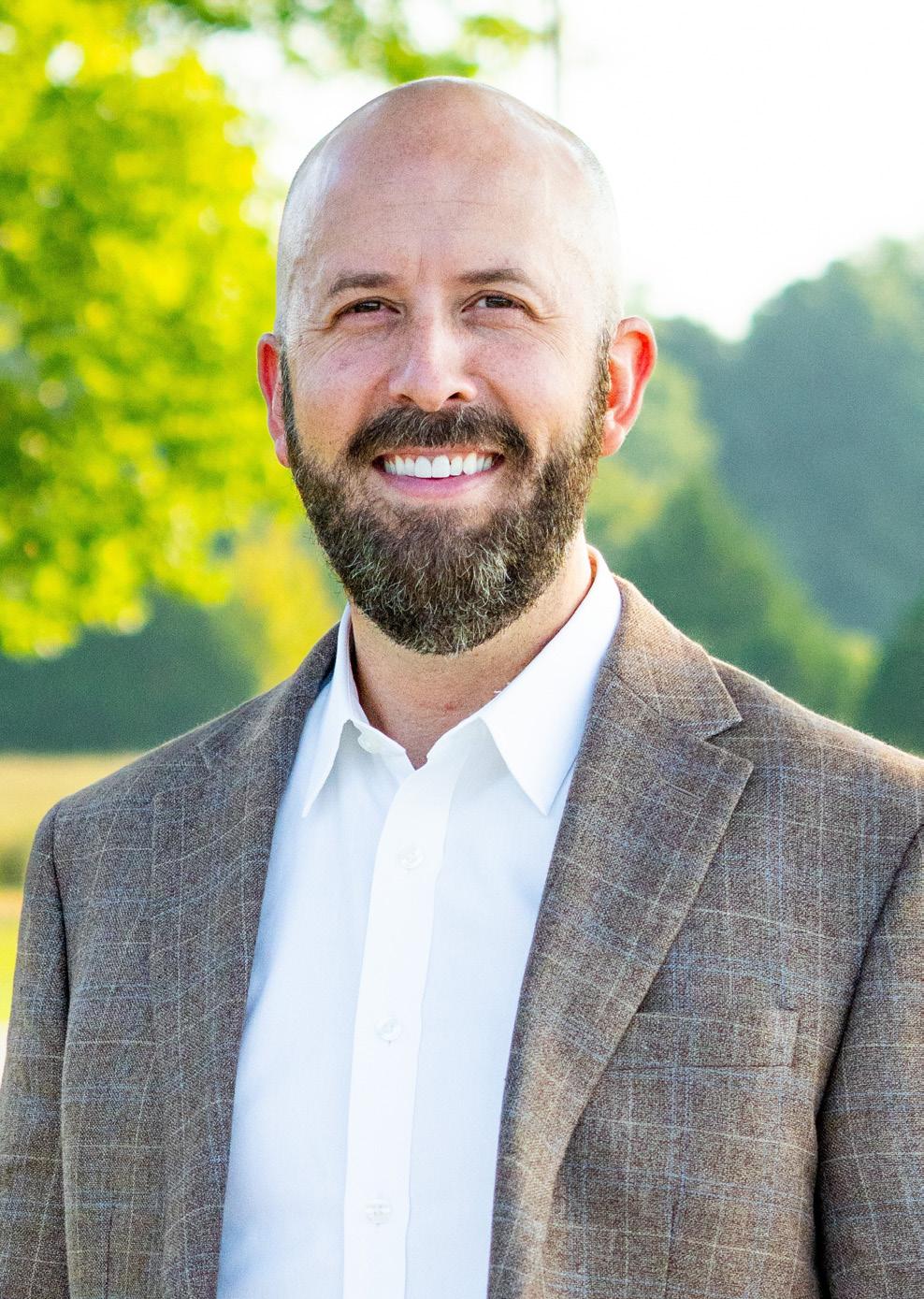
ties in some of the most remote, swampy places in Arkansas,” Wellons said. “Our biggest challenges are the weather and getting our equipment and staff in and out of areas that are considered the hardest to access anywhere in the state. I’m thankful that my team uses the best technology and resources of anyone in the industry to get these jobs done and to get them done effectively.”
Wellons counts himself fortunate to have put together such a strong team, he said, calling it “one of the best teams of people I’ve ever worked with in my entire life.” His own style of leadership has evolved alongside the growing company — just as customers have come to trust the knowledgeable agents and professionals on Wellons’ roster, he has been able to entrust his team to fulfill clients’
“ONE
dreams and expectations without needing to manage every small detail.
“By trusting my team and encouraging their skill sets, we’ve been able to achieve more than I ever imagined,” he said.
The land real estate industry is far from finished with changes, and Wellons and his team have not only been watching the development of new trends but leading the charge in revolutionizing their field. One thing that will not change, however, is the vision on which Wellons Land was founded.
“One day at a time, we guide our clients through acquisition and development of outdoor properties that promote dreams, adventure and success,” Wellons said. “One client at a time, our team delivers unmatched knowledge, resources and expertise to help maximize land and achieve its utmost potential. My personal vision for the company will be for continued growth while not losing touch with what we’ve been doing so well for so long.”

THE MAKING OF AN ICON
Whatdoes it mean to be an icon? MerriamWebster defines the word as “a person or thing widely admired, especially for having great influence or significance in a particular sphere.” Each year, Arkansas Money & Politics is tasked with identifying the state’s “Future Icons,” those who are gaining renown in politics, business and other aspects of the cultural landscape.
Some honorees are C-suite executives and established business owners, while others are just beginning to leave their mark on the world, and still others may be pursuing a second career. They come from all backgrounds, industries and walks of life, but the common thread uniting all of them is potential. These are people from whom Arkansas expects great things and to whom great honors are due.
AMP is proud to highlight those set to play a significant role in the future of the state. Congratulations to all our “Future Icons.”


In 2011, when Clint Cates arrived at the University of Arkansas in Fayetteville from his hometown of Cabot, he had his mind set on studying sports management with the idea of one day being an athletic director or in a similar role within the athletics field.
That all changed as he approached senior year on the Hill, when not only did he take a radical turn from that career path once he discovered banking; he left school entirely in order to get a jump on his new chosen field.
“After three years of college, I just kind of decided I wanted to get into banking and started pursuing that,” he said. “I would probably have to say it was my mother who actually influenced that decision. She worked in the banking industry for a few years when she was younger, and she always told me that it was a great industry and she always really enjoyed it.
“I was looking to set a career path at

CLINT CATES
Star on the Rise
that point, and [banking] seemed like a good one. Turns out it was.”
Now, at the tender age of 32, Cates has nearly 11 years with Signature Bank to his credit, during which time he has worked in retail banking and ascended to the role of treasury services specialist. For that position, he works with businesses of all sizes to help these customers make the most of banking tools and financial services concerning payables, receivables and reporting, among other back office functions.
“Really, what we’re doing is just trying to help our business customers become more efficient with the services that we offer,” he said. “We have a variety of different-sized business clients that bank with us, from the small mom-and-pop shops to some larger ones. Our services can scale to serve any size customer pretty easily.”
Cates said demand for such products and services has grown steadily in recent years. For everything negative that COVID-19
brought about, one of the positive elements was helping businesses take a harder look at treasury services and changing the way many business owners looked at how to apply them.
“All of the tools we have today were there before COVID, but coming out of that, I think it shifted a lot of business owners’ perspective on being able to be a little bit more self-sustaining,” he said.
“It was more important to be able to do things online compared to having to be tied to the bank. The pandemic was one of those things that really pushed people to see the importance of technology and how to really utilize it.”
Cates said beyond banking expertise, most clients are looking for a high degree of customer service, and that element is what distinguishes the leaders from the followers in the banking industry.
“Every single one of our customers is looking for good customer service,” he
said. “Even though we have these technologies that let customers handle things themselves, it is very important that they have somebody to call on and who can help them through any kind of problem. Regardless of size, every single one of our customers expects that.”
When asked what other areas of banking operations he would like to work in, Cates said he has found a home in his department and has his long-term sights set on continuing to build his career there.
“What I really enjoy the most about it is getting to learn about all the companies and businesses in our community,” he said. “It really opened eyes to how many businesses we have here, and I find it really interesting to be able to get to know them and see how they do their business. It’s a great feeling to help them and make them more efficient and do so with a high level of customer service.”
One thing Cates is looking forward to as his career goes along is to get involved with community organizations, nonprofits and charities. He said getting involved in this manner is not only good for business but speaks to who he is as a member of the wider community.
“[Community involvement] is a very important thing,” he said. “I know that we as a bank have a lot of events that some of our coworkers will set up within the community. Here in the treasury department, a lot of times we’ve kind of been tasked with either grilling for events or doing something like that. Getting more involved is something that I’m very much looking forward to.”
When he is on his own time, Cates said he likes to do anything outdoors, from hunting and fishing to a more recent hobby, taking advantage of northwest Arkansas’ famed cycling amenities.
By Dwain Hebda






Abby Adkins
First Community Bank
Erica Akel
Akel’s Carpet One Floor & Home
Stuart Allen
NativState
Jonathan Alvarado
MD Hair Labs & Vitality
Chris Arnold
Hope, O’Dwyer, Wilson & Arnold
Ajit Baridun
Hytrol
J. Camilo Barreto, M.D., FACS
CARTI
Dr. J. Camilo

Barreto is a fellowship-trained complex surgical oncologist who cares for patients at CARTI Cancer Center and CARTI Surgery Center in Little Rock. With extensive expertise in cancers of the digestive tract, skin and soft tissues, Barreto is dedicated to creating individualized surgical plans through a collaborative, team-based approach. He works closely with CARTI’s multidisciplinary team to help achieve the best possible outcomes.
Prior to joining CARTI in 2021, Barreto served as an associate professor of surgery at the University of Arkansas for Medical Sciences in Little Rock. He completed his medical degree in Mexico City, followed by surgical oncology and minimally invasive surgery fellowships at the University of Chicago Medical Center and Mayo Clinic. He is board certified by the American Board of Surgery, a fellow of the American College of Surgeons, and a member of the American Society of Clinical Oncology and Society of Surgical Oncology.
Drew Beasley, M.D.
OrthoArkansas
Keaton Beasley
Simmons Bank
Alex Blass, CPM
Blue Ribbon Industries
Allie Brown
Arkansas Air Flow
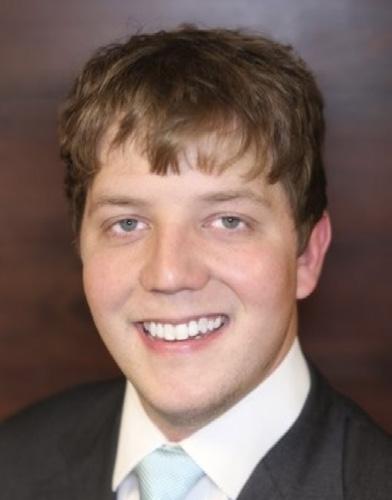
Alex Blass is president of Blue Ribbon Industries, a landscape, maintenance, lawn, pool services and roll-off dumpster rental company in Rogers. He manages more than 150 employees across the company’s multiple divisions. He previously served as executive broker, vice president of operations and principal at Cushman & Wakefield | Sage Partners in northwest Arkansas; as owner of Rodden Landscape in Bentonville; as partner/executive Certified Property Manager at Sage Asset Solutions; and as director of operations at Apollo Event Group in Fayetteville. Blass graduated in 2010 with a business degree from the University of Arkansas in Fayetteville.
James D. Bornhoft
James Bornhoft Law

James D. Bornhoft, founder of Bornhoft Law in Little Rock, is an experienced trial attorney who has conducted more than 70 jury trials in his career and has spent more than 10,000 hours inside the courtroom. Prior to founding Bornhoft Law, he worked as a deputy district attorney, rising quickly through the ranks to become the sole human trafficking prosecutor and a member of the special victims unit in the largest judicial district in the state of Colorado at the time. While at the district attorney’s office, he handled serious felony prosecutions such as murder, pimping, pimping of a child, human trafficking, sexual assault, child abuse and crimes falling under the Colorado Organized Crime Control Act. He worked extensively with various organizations, such as the Innocence Lost Task Force, the Federal Bureau of Investigation, Homeland Security Investigations, the National Center for Missing & Exploited Children, the Drug Enforcement Administration, high-risk multidisciplinary teams and the U.S. Attorney’s Office.

From a career in newsrooms to leading operations at one of Arkansas’ fastest-growing heating, ventilation and air conditioning companies, Allie Brown, commercial project coordinator and director of marketing at Arkansas Air Flow in Jacksonville exemplifies what it means to turn passion into purpose. A graduate of the University of Central Arkansas in Conway, Brown began her professional journey in broadcast journalism — reporting, producing, and ultimately earning both a regional Emmy and the Edward R. Murrow Award for excellence in journalism. Her drive to communicate and connect did not stop with the news; it evolved into a mission to make a tangible impact on her community.
After a successful turn in public relations and grassroots outreach, Brown answered a deeper call — to return home and help continue building her family’s company, Arkansas Air Flow. What began as a marketing role quickly expanded into fullscale operational leadership. Today, she oversees all aspects of the business, from commercial construction and service operations to strategic growth and workforce development.
Amy Clemmons Brown
McMullan & Brown
Courtney Bryant
University of Central Arkansas
Courtney Bryant serves as the associate vice president for enrollment management and director of UCA Commitment at the University of Central Arkansas in Conway. A native Arkansan and firstgeneration college student, she is dedicated to serving her community by connecting students with purposeful pathways to higher education. Bryant earned both her bachelor’s and master’s degrees from Arkansas Tech University in Russellville and completed her Ph.D. at UCA, where her research focused on the development of millennial leaders. With more than 17 years





a Future ICON Celebrating
We’re proud to share that our very own Issac Morales has been named one of AMP’s Future ICONS of Arkansas—a recognition of outstanding young professionals under 40 who are shaping the future of our state.
At Encore Bank, we believe in investing in talent that leads with purpose, passion, and impact. Issac embodies all of that and more.
Congratulations, Issac!

of experience in higher education, Bryant has played a pivotal role in shaping strategic policies and student-centered programs that have strengthened enrollment and broadened the university’s reach. In addition to her responsibilities as associate vice president, she leads UCA Commitment, an institutional initiative that offers lastdollar funding and personalized support to help remove financial barriers to college completion. During its first year, her leadership contributed to a 26 percent increase in freshman enrollment.
Leo Castillo
Nabholz Construction Corp.
Zac Cerrato
Evo Business Environments


Leo Castillo joined Nabholz as an intern in 2018. Since then, he has graduated from John Brown University in Siloam Springs with a Bachelor of Science in construction management and become a valuable member of the Nabholz team as a senior preconstruction specialist. Despite his recent entrance to the industry, Castillo has played a vital role in the construction of cornerstone projects such as the University of Arkansas’ Anthony Timberlands Center in Fayetteville and the expansion of Arkansas Children’s Northwest in Springdale. He also serves as an interpreter and equipment tech at Children’s Therapy T.E.A.M. in northwest Arkansas.
Clint Cates
Signature Bank of Arkansas
Clint Cates is a treasury services specialist for Signature Bank of Arkansas, which is based in Fayetteville. He joined the Signature team in 2020.

Founded in 2005, Signature Bank provides a full line of financial services to small businesses, families and farms. The bank has locations in Fayetteville, Springdale, Bentonville, Brinkley and Rogers. In the treasury services department, Cates carries on the bank’s well-known, personalized approach to customer service and dedication to the traditions of community banking.
Zac Cerrato is a co-owner and director of business development at Evo Business Environments, a commercial furniture dealership and architectural solutions provider based in Little Rock. Evo represents premium brands such as MillerKnoll, OFS, DIRTT, and Tate. Cerrato works closely with architects, designers, and clients across Arkansas to create high-performing workspaces. Born and raised in Little Rock, Cerrato helped cofound Evo in 2013 as part of a five-person team that included his father, Chris Cerrato, and his brother, Casey Cerrato. At Evo, Zac Cerrato leads sales and marketing strategy and oversees project lifecycles from early concept to final install. His role includes managing key accounts, guiding interior design collaboration, and supporting the firm’s growth in modular construction and workplace strategy. Cerrato is also active in the local design and business community. He serves as chair of the Architecture and Design Network and is a graduate of the Leadership Greater Little Rock Class XL. He and Evo were recognized in 2025 by the Little Rock Regional Chamber with a Small Business Impact Award.
Shelby Chambliss
FoxDen Capital
herself, she understands the entrepreneurship mindset, brand development and business growth from every angle. Today, she leads marketing efforts for brands that include The Purple Cow Restaurant, Beyond Wellness, Leiva’s Coffee, U.S. Pizza Co. and more. Known for her love of process, coordination, customer experience and bigpicture strategy, Chambliss is undoubtedly one to watch in the future of creative leadership.
Leon Chills
Screenwriter
Brantley Clark
BPC Construction/Primo Operations
Reagan Cody, BSN, RN Beyond Wellness


Shelby Chambliss is a creative force and strategic thinker shaping some of Arkansas’ most recognized brands. A graduate of the Fashion Institute of Design and Merchandising in Los Angeles with a degree in visual communications, Chambliss brings a dynamic blend of design sensibility, hospitality insight and marketing ex-pertise to her role as marketing and brand director at FoxDen Capital in Little Rock. Her career has taken her through hospitality roles in Orlando, Los Angeles and San Antonio and includes past leadership at Ropeswing Hospitality Group and the AM Group, both in northwest Arkansas. A former e-commerce boutique owner
Reagan Cody brings a compassionate approach and a wealth of clinical experience to her role as an aesthetic injector at Beyond Wellness, which she joined in late 2024. With nearly four years of aesthetic injection experience and a strong foundation in nursing, Cody firmly believes in listening, educating and empowering her patients to protect and restore their natural beauty. Specializing in a range of areas, including aesthetic injectables, laser therapies, body contouring, microneedling, radio frequency microneedling and hair restoration. She earned her Bachelor of Science in Nursing and began her career in a step-down ICU unit at Baptist Health, where she gained valuable critical care experience. Over the next several years, she continued to expand her skill set, spending five years at an outpatient gastrointestinal surgery center, working as a circulator registered nurse in a urology operating room and assisting an oculofacial plastic surgeon in surgery for two years. She is currently pursuing her goal of becoming a nurse practitioner, driven by her passion for learning and providing exceptional patient care. Her clinical background paired with her eye for aesthetics makes her a trusted provider for patients seeking natural, confidence-boosting results.


After an upbringing infused with a heavy tourism influence, North Little Rock Tourism’s senior marketing director, Everett Gaither, redefines the ideals of marketing and tourism through his undying love for the city of North Little Rock. An integral part of central Arkansas’s tourism environment, Gaither’s unwavering involvement within the community offers tourists an authentic experience that highlights the unique findings, vibrant scenes and cultural aspects of North Little Rock.
Gaither, an Arkansas native, spent his early years in Hot Springs, an alluring tourism hub. Unbeknownst to him, that element would soon become his passion. Gaither said he grew accustomed to living and working in a tourism mecca.
“It is such a unique place, and people come from all over to see Hot Springs,” Gaither said. “It is a tourism hotspot. When you live in your town, when you grow up in your town, sometimes you don’t realize

Photo by Lori Sparkman
EVERETT GAITHER
Called ‘Home’ to NLR
some of these things because you’ve kind of gotten used to them. … It was a great place to grow up.”
After graduating from Magnet Cove High School in Malvern, Gaither pursued an education degree at the University of Central Arkansas in Conway, where he quickly switched to public relations and marketing.
“It was a bit of a journey,” Gaither said. “I started at UCA, looking at a middle-school education degree. I saw a lot of inspirational teachers when I was that age, so I started doing that. I enjoyed it, but I saw a lot of different people who were going different directions, so I changed to public relations.
“Through that program at UCA, I was introduced to a lot of different things because their PR program was really great, and it kind of introduced me to marketing, journalism — all these different things. I was like, ‘Man, I just love doing this stuff so much.’”
After finding his passion for communication, marketing and storytelling, Gaither pursued a career path in Wyoming after completing his undergraduate degree at UCA. There, he worked in close proximity to national parks and major tourist destinations such as Yellowstone National Park and the Teton Range. Realizing tourism’s impact on small towns, Gaither found his calling of bringing people together while supporting local communities that relied on the industry.
“A lot of my program focused on nonprofit organizations,” Gaither said. “That’s the direction that I started in. I worked with some nonprofit organizations, especially right out of college, and I connected with some people who were out in Wyoming, of all places. I spent some time out there, five years or so, working with different organizations, doing little bits of PR and marketing for them.
“I definitely enjoyed it. It’s something
meaningful to me. I felt like I did more than just put an ad on paper; it felt like I was helping make my community better in some way. That made me feel like I’m making an impact.”
After spending half a decade in Wyoming, Gaither returned to Arkansas during the COVID-19 pandemic and was promptly introduced to a marketing role at North Little Rock Tourism, where he has spent four years promoting the city of North Little Rock.
“We try our best with what we have to do,” Gaither said. “We tell the world about who we are as North Little Rock. We’re looking to these people who may have little to no knowledge of who we are, who could be potential visitors to our city and help grow what we have here.
“The biggest thing we do is partner with people because we don’t exist without the city of North Little Rock. That includes our government, but it also includes all the businesses and the people who go into making this place what it is. What’s most important is building those partnerships, building those relationships. We help push out new things that are coming to the city. Those things take a lot of different people to get moving and to come to fruition. You can’t do those things without people in those different positions all coming together to make our home a better place to visit, a better place to work, a better place to live — all those things.”
Gaither said the city has created incomparable opportunities and experiences for him. Throughout his time at North Little Rock Tourism, the support of his community and visitors has redefined his calling.
“I have met some amazing people who have a passion for what they do,” Gaither said. “Meeting those kinds of people who love seeing people happy, that’s the best thing about being in tourism is that all of these people are looking to make people happy.
By Mary LeSieur


Christian Crain
Crain Automotive
Christian Crain is shaping the future of Arkansas’ automotive industry. He took over as chief operating officer at Crain Automotive and its 16 dealerships in 2023 after the death of his grandfather. Amid family turmoil, he normalized operations and led a 62 percent increase in revenue from 2023 to 2024 to nearly $1.5 billion. Crain’s leadership has earned him statewide and national recognition, including a featured interview on the industry-setting Car Dealership Guy podcast this spring. He graduated from Little Rock Christian Academy in 2017 and the University of Arkansas in Fayetteville in 2021. He is chair of the Larry and Janett Crain Foundation and is involved with organizations that include Children’s Protection Center and Boys & Girls Clubs of America. The fourth-generation leader of the Crain Team, Crain’s management approach is a blend of humility, servant leadership and learning something new every day.

Nesia began her career in the telecom industry, working for Alltel Communications and Verizon Wireless where she honed her skills in customer experience, employee development, and leadership support—earning accolades such as the Verizon Coins of Excellence. At First Orion, she has not only led successful product marketing strategies but also managed their Technical Apprenticeship, initiated their leadership development program and served as a trusted advisor on inclusion, launching the company’s initial program recognized by Arkansas’ Best Places to Work in 2022.
Nesia holds a B.S. in Business Management and an MBA from the University of Phoenix. She is certified by the Product Marketing Alliance, Institute for Diversity Certification and Birkman. Passionate about empowering others, she shares weekly insights on leadership and personal growth across social media..
Tom Dunlap
Bass Concrete
John C. Davis
University of Arkansas
Will Davis
David’s Burgers
Bo Diamond
Caisson Capital Partners
Nicole Dickie
Peak State Recovery Center
Wynesia A. “Nesia” Dotson, MBA, CDE
First Orion
that clients have come to expect from Salon J’adore. One of her most favorite memories is participating as a hair stylist to the stars and models at Los Angeles Fashion Week. A few other favorite memories are doing hair for the Miss Arkansas pageant and placing top three in five of the eight hair shows she has participated in, as well as countless weddings and special events.
Jonathan Foster
Xpress Boats
Everett Gaither
North Little Rock Tourism
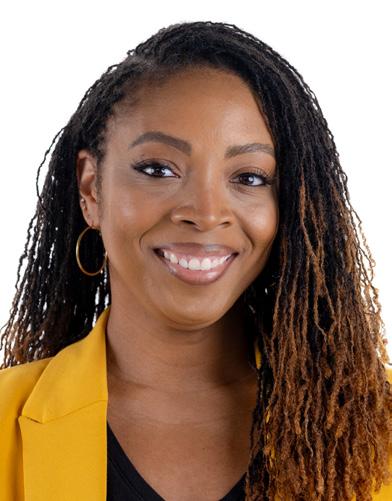
Nesia Dotson is the Associate Director of Product Marketing at First Orion, where she leads go-to-market strategies, messaging, and positioning for cutting-edge communication solutions. With over 18 years of diverse experience, she blends deep expertise in telecom, operations, and leadership to drive initiatives that resonate with customers and deliver business impact.

As Bass Concrete’s vice president, Tom Dunlap has dedicated his career to growing the company’s Arkansas communities one project at a time. He is a key part of Bass’ leadership team — responsible for business development, estimating and operations — and most recently helped lead the company’s integration with Nabholz Construction Corp. at the beginning of 2025. His expert guidance on business decisions and project endeavors has helped clients — and Bass — form strong foundations that will support growth for generations to come.
Katie Beth Evans
Salon J’adore
Katie Beth Evans is owner of Salon J’adore in Little Rock. She grew up wanting to be a stylist and own a salon. After graduating high school, she attended Regency Beauty Institute and graduated with honors. She was behind the chair for 13 years. Her time is now geared toward training her staff to a specific level of excellence

Currently serving as North Little Rock Tourism’s senior marketing director, Everett Gaither has spent the last five years promoting the city of North Little Rock to visitors and tourists. With a bachelor’s degree in public relations from the University of Central Arkansas in Conway and nearly a decade of marketing and public relations experience, Gaither balances making connections within his community and marketing them to natural state tourists. He has an extensive background in nonprofit public relations, which he gained during an early career venture in Wyoming. Gaither blends creativity with collaboration in his role as a senior marketing director and relishes the opportunity to meet new people interested in a city he loves.

Lane Gammel
Goodwill Industries of Arkansas
Eden Garrett
Eden’s Flower Truck/Eden’s Botanicals
Michelle Gilbert
CareLink
Michelle Gilbert is vice president of development at CareLink, where she leads fundraising, communications and brand strategy for one of Central Arkansas’ most impactful nonprofits. Her work drives visibility and fuels essential services such as Meals on Wheels and inhome care for older adults. With more than





a decade of nonprofit experience, Gilbert has shaped the voice of mission-driven organizations and driven record-breaking revenue. Before rejoining CareLink in her current role, she had leadership positions with the Downtown Little Rock Partnership and the Arkansas Single Parent Scholarship Fund. A Leadership Greater Little Rock graduate, Gilbert also has an Master of Business Administration from Henderson State University in Arkadelphia. She is known for blending strategy with storytelling and for connecting people with causes they care about and outcomes that truly matter.
Myranda Grulke
Grulke Construction
Alyssa Hagewood
Southern Interiors
Billy Henry
Conway Regional Helath System
Aaron Hilton
Lawrence

Healthcare Colby Hoagland

Alyssa Hagewood is the sales and marketing manager at Southern Interiors in Sherwood. The daughter of owners Donna and Brian Hagewood, she is following in her parents’ footsteps. Now celebrating 25 years in business, Southern Interiors has become a a destination for all one’s home improvement and renovation needs. Hagewood and the team at Southern relish the opportunity to walk with clients through every step of a renovation to meet clients’ performance needs, design wishes and budget.
Trent Hanna
SSI of Northwest Arkansas
Elizabeth Heaggans
Pine & River Aesthetics
Bradley Heird
Baptist Health
Tyler Henderson
American Concrete Concepts
Billy Henry serves as the corporate director of the physician enterprise at Conway Regional Health System, where he oversees the day-today operations of a growing network of ambula-tory clinics, including both primary care and specialty care locations. His leadership spans across multiple communities in Arkansas including Conway, Russellville, Dardanelle, Clinton, Greenbrier, Vilonia and Mayflower. With more than 15 years of experience in clinic operations, Henry has established himself as a trusted and visionary health care leader. He is known for developing high-performing teams, fostering strong physician partnerships and driving operational excellence across the continuum of outpatient care. His efforts are focused on improving patient access, enhancing the quality of care, and expanding services to meet the evolving needs of the communities Conway Regional serves. He has a bachelor’s degree in health care administration from the University of Central Arkansas in Conway and a Master of Business Administration from Columbia Southern University. In addition to his professional work, he is an active member of his community and serves on the board of directors for the Greenbrier Chamber of Commerce.
Derrick Henry, M.D. OrthoArkansas
Max Hicks, P.E.
McClelland Consulting Engineers

Max Hicks is a water/wastewater project designer for McClelland Consulting Engineers in Little Rock. McClelland is a consulting engineering firm made up of civil engineers and landscape architects focused on providing exceptional client service while improving the communities where employees serve, live and work. Hicks joined the firm in 2022. Previously, he worked as an engineer intern land-development civil engineer at Joe White & Associates in Little Rock.
Cushman & Wakefield | Sage Partners Colby Hoagland serves as an associate at Cushman & Wakefield | Sage Partners, where he has been instrumental in shaping Arkansas’ commercial real estate landscape since relocating from Denver in 2020. He has closed over 1 million square feet in sales and leasing transactions across more than 35 cities statewide. He specializes in industrial, land and investment sales, representing clients such as U.S. Bank, Deloitte, Prudential Financial, Sunbelt Rentals and Realty Income. Before joining Sage, Hoagland worked at Cushman & Wakefield’s Denver office in the debt and equity division, contributing to more than $200 million in client financing. A graduate of Harding University in Searcy with a degree in business management, Hoagland blends financial acumen with market insight to deliver strategic results. He is also deeply engaged in community and professional organizations, including the National Western Stock Show, American Enterprise Institute, Workmatters Institute and Pleasant Valley Church of Christ in Little Rock. In 2023, he earned CoStar’s Top Retail and Office Lease honors in Little Rock.
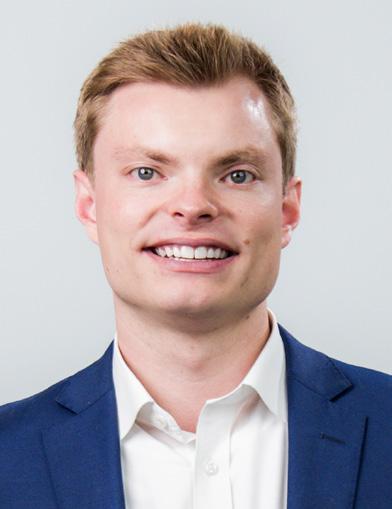
Hillary Hornor
Five Oaks Ag Research & Education Center
Hillary Hornor serves as the direc tor of youth educa tion at Five Oaks Ag Research and Education Center, a role she has pas sionately served for four years. A native of Arkansas County, Hornor grew up across the street from Five Oaks Duck Lodge and graduated from Stuttgart High School. She then furthered her education at South ern Methodist University in Texas where she earned both her bachelor’s and master’s degrees. She started her career teaching ele mentary school and special education for six years, and in 2020, after her father, George Dunklin, founded the 501(c)(3) nonprofit Five Oaks Ag Research & Education Cen-

READY TO LEAD
Congratulations to Joey Msall — an Arkansas Future Icon. As general manager for 8,000 miles of natural gas infrastructure in Arkansas, Joey exemplifies professionalism and a commitment to safety.
Each day, his impact supports 189,000 customers throughout the state.
From all of us, thank you for your leadership.


We’re proud you’re on our team and this well-deserved honor is a reflection of your dedication to shaping the future of Arkansas.
After nearly 40 years of serving the Arkansas community, the staff at Jones & Son Diamond & Bridal Fine Jewelry in Little Rock knows the ins and outs of the fine jewelry industry. Coowner Jacob Jones said that expertise is the reason for the business’s success and loyal clientele.
“We don’t exist without our customers,” he added. “Without our customers coming back again and again, we’re dead in the water. We take care of everybody as they come in — take care of their needs and go above and beyond for people.”
Jones, a gemologist who has practiced for 28 years, said his love for gemology began at an early age due to his involvement in the business during his teenage years while he had summer breaks. His father and business partner, Darrow Jones, offered him a role at both store locations.
“I worked in the store when I was a teenager,” Jones said. “He had two stores, and I worked at the one on Markham [Street in

(Photo by Lori Sparkman)
JACOB JONES
Shining Brightly
Little Rock]. It would just be me and a jeweler in there.”
The summer job soon became a passion for Jones. After graduating from the Gemological Institute of America in 1997, he returned to Little Rock and has since been involved in the day-to-day operations at Jones & Son. Jones was also recognized as the youngest graduate gemologist in Arkansas at 19.
The jewelry savant said his calling for jewelry was accompanied by a pursuit of giving back to the community, which Jones & Son has shown through its involvement with Wolfe Street Foundation in Little Rock, the Arkansas Symphony Orchestra in Little Rock, Arkansas Children’s, the 20th Century Club of Little Rock, The Centers and Miss Arkansas.
“It’s an evolution,” Jones said. “We want to make sure that we have the most impact possible in the community through scholarships for the young ladies. That’s the
future of our state. Then there’s the kids at Children’s Hospital, cancer patients for the 20th Century Club, and The Centers for youth and families, sex trafficking and domestic violence victims. It’s just spreading it out to make the most impact possible over time.
“I’ll say this too: It’s those charities we just mentioned that seem to be the ones we’ve worked the closest with. What we try to do is work with these charities. We try to partner with them and really get behind them.”
Education has been a major focus of the father-son duo, and thanks to their contributions, Arkansas is ranked first in fundraising through the Miss America system.
“I left high school and went straight to a trade school,” Jones said. “I never really went to college, and I think that’s important for people to go to college. It’s important for a lot of people to go to college, and people that want to go and need to go can’t afford to go to college. That’s a pretty big
thing, especially with how much it costs. Nowadays, it’s expensive.
Jones said the response to that generosity is unmatched, and introducing philanthropy to his line of work is a rewarding aspect of his job.
“That’s why we’re the No. 1 state, because so many people are willing to step up and willing to help these [Miss Arkansas contestants.] They’re more than grateful and I think because of the gratitude and they’re so excited, it makes us want to do more.
“Taking off and being able to go and be around all those girls, seeing the girls that got the scholarships last year from us, seeing who got the scholarships this year, and relationships that we have with these organizations are invaluable. I’ve known people for years that are friends of mine because of these organizations. It’s just something that we passionately do. We don’t do it for a reward, recognition or anything. We do it because we want to.”
Following in his family’s footsteps by supporting Miss Arkansas, Jones said the Miss Arkansas 2025 pageant was especially meaningful because of his son’s involvement in it.
“We brought him to the pageant when he was 5, and so he’s done it for a year or two now,” Jones said. “He’s kind of getting involved. Everybody loves him, and he was an escort for one of the girls. The girl he was with got top 15, so he was on TV. He got to escort her and everything.”
When Jones is not assisting with community outreach or running a storefront, he spends his time relaxing with family and watching football.
Through his years in the industry, Jones has combined a love for philanthropy with a love of fine jewelry, emphasizing a new meaning of being a business owner and an active member of his community.
By Mary LeSieur
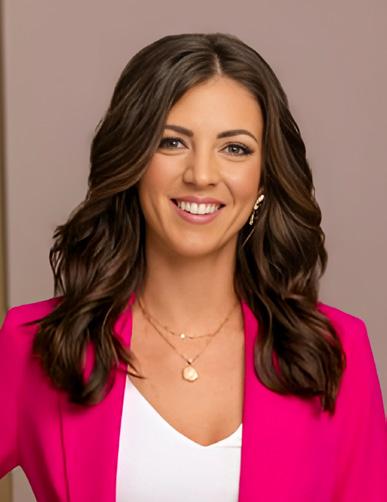




ter, she joined the team. Hornor has since developed several engaging programs, including a field trip for elementary school students titled “Where is Mike Mallard?” The hands-on learning adventure integrates a conservation education curriculum aligned to grade-level standards that focuses on collaboration, critical thinking and communication as teams work together to find Mike Mallard.
Caleb Ingram
Iron-Vac
Daveante Jones
Wright Lindsey Jennings
and community. Jones & Son is a major sponsor for the Miss Arkansas pageant and is ranked first nationally in fundraising. The Miss Arkansas pageant is one of the many organizations the company supports. Combining a love for philanthropy and business, Jones’ 28 years in the industry have impacted his local community in more ways than one.
Walker Jones Cadence Bank
William Jones IV
Sissy’s Log Cabin
William Little, DDS
GPS Dental
Justin Lowery
Wellons Land Co.
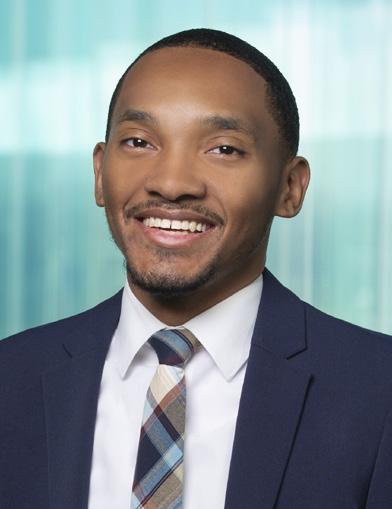
Daveante Jones is a partner at the Little Rock law firm of Wright Lindsey Jennings. He focuses on employment law and helps employers navigate day-to-day issues related to hiring, discipline and termination, employee pay, leaves and accommodations, cultivating an inclusive workplace, and conducting employee and management training. Support provided by Jones also includes handling all aspects of litigation, assisting with internal and state/ federal agency investigations, drafting workplace policies and employment agreements, and writing and speaking about the latest legal trends, ranging from the Americans with Disabilities Act and the Family and Medical Leave Act to wage and hour issues to trade secrets to surveillance in the workplace. In addition to helping with workforce needs, Jones defends employers against premises liability claims brought by customers, patrons and other business invitees.
Jacob Jones
Jones & Son Diamond & Bridal Fine Jewelry
Ali Karr, P.E., CFM
Crafton Tull


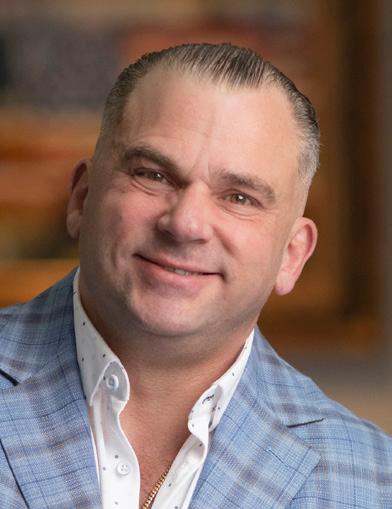
Jacob Jones is a co-owner of Jones & Son Diamond & Bridal Fine Jewelry, a diamond and fine jewelry retailer rooted in nearly 40 years of service. The jewelry aficionado graduated from the Gemological Institute of America in 1997. At age 19, he was the youngest gemologist graduate of the program at the time.. He has spent his career giving back to his loyal clients
Ali Karr, is a vice president in the infrastructure division at Crafton Tull. She is based in the Rogers office, where she leads a design team that focuses on commercial, multifamily and single-family projects in the area. She specializes in hydrologic and hydraulic studies for large drainage basins and floodplains. Karr graduated from the University of Arkansas in Fayetteville with a bachelor’s degree in biological engineering. She is a member of the Arkansas Floodplain Management Association and the Crafton Tull Employee Stock Ownership Plan Committee. Karr was recognized in 2024 by the American Society of Agricultural and Biological Engineers as its Young Engineer of the Year. Her favorite part of being an engineer is figuring out the puzzle that is each new project. No two projects are the same, and they each require new ideas and innovations to design a product that is functional and desirable. She enjoys being a part of the Girls of Promise for young women in science, technology, engineering and mathematics,, where she can promote lifelong learning and problem-solving techniques that are essential to engineers in the workplace.
Jaime Land
Arkansas Tech University
Jeremy Langley
Central Baptist College
Tameka Lee
Central Arkansas Library System
Elizabeth Leverich
Lindsey & Associates
Justin Lowery is an executive broker specializing in the sale of recreational land and farmland at Wellons Land Co.. With a strong background in wildlife biology and a degree from Mississippi State University, Lowery brings a unique understanding of land, habitat and property value to every client interaction. His expertise helps buyers and sellers navigate the land market with confidence, whether they are looking for investment opportunities, hunting property or working farmland. Known for his integrity, market knowledge and commitment to client success, he has built a reputation for delivering results across a wide range of rural property transactions. He combines handson land experience with strategic insight, making him a trusted partner in every phase of the buying or selling process.
Nick Mahan
Lexicon
Nick Mahan is an accomplished financial leader with a unique blend of operational insight and technical expertise. After earning a bachelor’s degree in accounting and a Master of Business Administration from the University of Central Arkansas in Conway, he built a well-rounded foundation through a mix of finance and operations roles. Mahan joined Little Rockbased Lexicon in 2023 and was recently promoted to the role of group controller for the company’s fabrication divisions. Since joining Lexicon, he has spearheaded several high-impact initiatives, including automating monthly financial reporting with Microsoft Power BI, implementing a telematics system to improve driver safety, and building dynamic real-time dashboards. He also developed long-range financial forecasting models and created real-time fabrication scheduling and production tools. His work has improved decision-making, efficiency and visibility across Lexicon.



Five











Brayden Mallett
Arvest Bank
Michael Manley
First Service Bank
Joey Msall, P.E.
Black Hills Energy
READY TO LEAD
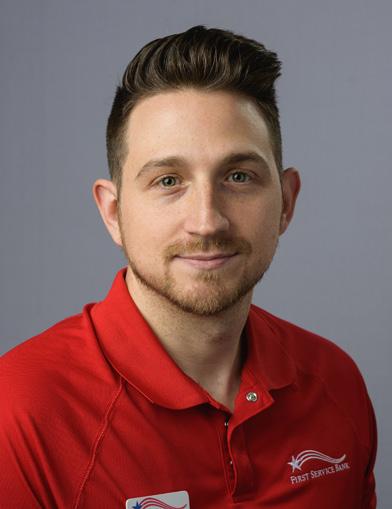
Michael Manley is a loan officer and business development officer at First Service Bank’s Little Rock location, where he brings a strong background in credit analysis and commercial lending. Formerly a senior credit analyst, Manley specialized in evaluating complex commercial loan packages and using advanced underwriting methods. He has a bachelor’s degree in biology from the University of Central Arkansas in Conway and has eight years of management experience. Over the past four years, he has made significant contributions to the continued growth and success of First Service Bank. Manley is passionate about delivering exceptional service, supporting local businesses and being part of a team that values community impact.
Hayden Medlock
Synergetic Social
J.W. Misenheimer
Congratulations to Joey Msall — an Arkansas Future Icon. As general manager for 8,000 miles of natural gas infrastructure in Arkansas, Joey exemplifies professionalism and a commitment to safety.
Each day, his impact supports 189,000 customers throughout the state. From all of us, thank you for your leadership.
Joey Msall, en sures Black Hills Energy delivers safe, reliable en ergy for 189,000 customers in more than 100 Arkansas communities. As general manager of operations, he oversees natural gas system operations and integrity initia tives with about 8,000 miles of infrastruc ture. Through his leadership, Black Hills Energy continues its capital investments to meet the growing demand for energy in the state while supporting a net-zero target by 2035. Msall serves on boards for the RogersLowell Chamber, Arkansas 811 and Ozark Mission Project, among other community service efforts. He graduated from Leadership Arkansas Class XV in 2021. A licensed professional engineer, Msall has a Bachelor of Science degree in civil engineering from the University of Arkansas in Fayetteville, an Master of Science degree in civil engineering from Missouri University of Science and Technology, and an Master of Business Administration from the University of Arkansas at Little Rock.
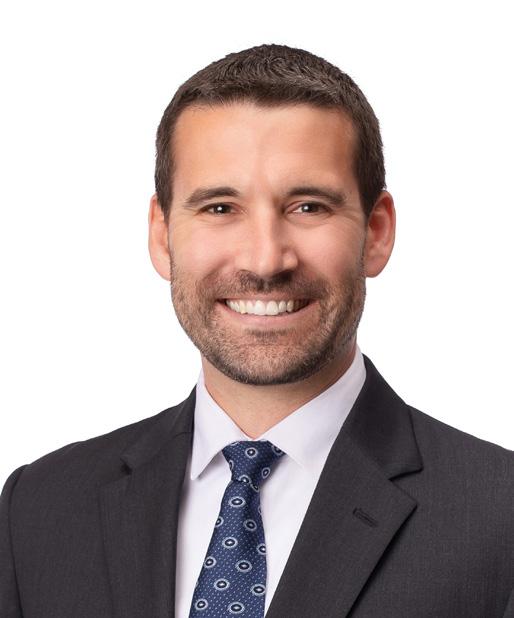
outdoors and deep roots in the area make him a valuable partner in each client’s landbuying journey.
Andrew Norwood
Denton, Zachary & Norwood
Chris Oldner
Stone Bank
Newhaven Counseling & Health Services
Issac Morales
Encore Bank
Nick Newton
Arkansas Land Co.

Issac Morales is senior vice president and chief community outreach officer for Encore Bank in Little Rock. Fluent in English and Spanish, he is proficient at training, team development and community outreach. He was promoted to his current position in 2024, after serving as vice president and community outreach officer. He previously worked as an outreach specialist and finance program specialist at the Arkansas Development Finance Authority, as a universal banker at Regions Bank and as an agent at Farmers Insurance Group. He earned his Bachelor of Science from the University of Central Arkansas in Conway in 2012.
Born and raised in Hot Springs, Nick Newton has a lifelong connection to the outdoors and the land he now helps clients buy and sell. From chasing ducks in flooded timber to early mornings in a deer stand or casting a line on one of the local lakes, Newton’s passion for Arkansas’ natural beauty runs deep. He graduated from the University of Arkansas in Fayetteville with a degree in agricultural business, combining his love for the outdoors with a strong foundation in land and ag economics. That passion led him to join Arkansas Land Co. in North Little Rock, where he now specializes in properties across southwest Arkansas. Whether a client is looking for a hunting tract, recreational land or a rural property on which to build a dream home, Newton is ready to help clients find the ideal fit. His local knowledge, enthusiasm for the


Chris Oldner is a graduate of University of Central Arkansas in Conway with a bachelor’s degree in finance and a graduate degree in banking from the University of Colorado. Oldner has been employed by Stone Bank since 2017 and worked in several departments before moving into the Small Business Administration division. As vice president/SBA business development specialist, he excels in helping entrepreneurs and small business owners secure the financing they need to start, grow or expand their businesses. With a strong background in commercial lending and a deep understanding of SBA programs — including 7(a) and 504 loans — Oldner works with clients to navigate the process from application to funding with clarity and confidence.
Caroline Otwell
RPM Group
Caroline Otwell is vice president of marketing and brand strategy for RPM Group and Coldwell Banker

RPM Group. A 2021 graduate of the University of Arkansas in Fayetteville, she joined the firm in May 2023 and quickly emerged as a driving force behind its brand evolution and growth initiatives. Otwell’s early successes in commercial real estate, including listings of nearly $9 million, shaped her professional path and gave her a strong foundation in the industry. Her creative mindset and strategic approach quickly caught the attention of leadership, earning her a seat on the firm’s advisory council and an executive role overseeing marketing and brand strategy across RPM’s multiple operating companies, including commercial, residential, corporate and



















The University of Arkansas at Little Rock has been on a roll lately, from the success of its sports teams to recent campus improvements to leading the charge for affordable tuition. Articulating those achievements for public information and as recruiting tools takes marketing chops, which is precisely the skill set Carrie Phillips brings to the table.
Phillips, the university’s chief communications and marketing officer, took over the position in 2022 and has been running at full speed ever since to keep the institution top of mind for a range of audiences.
“I think one of the biggest things that we’ve really worked to do as an institution is hone our message,” she said. “I think our opportunity is to continue elevating the great affordability opportunities that we have. We’ve worked really hard at that piece.
“The other piece that we’re really excited to make sure people know about is the great experience that they will have on campus — high-quality academics, over 80 campus

CARRIE PHILLIPS
Marketing to the Masses
organizations and 800-plus student activities and events every year. I think the work that our team has done has really helped to amplify that.”
Communications and marketing are complicated art forms in the modern age, cast as they are across a dizzying array of platforms. Long gone are the days when a simple news release and press conference were the main modes of messaging to a limited number of print and broadcast outlets. Under Phillips’ leadership, the communications and marketing team has attacked the challenge of being heard above the crowd.
“We’ve taken a multitiered approach,” Phillips said. “Media relationships, advertising, being present at places on campus and being present in the community really shepherd the message. We make sure that we’re in all of those spaces to help amplify the great things happening on campus.”
Born and raised in Russellville, Phillips earned her undergraduate degree at home-
town Arkansas Tech University. She earned her spurs as a producer in North Carolina for a top-50 TV station before returning home and earning her master’s degree in journalism, also from Arkansas Tech University. She followed that up with a doctorate in higher education administration from Texas Tech, for which her dissertation examined the role marketing could play in addressing the “enrollment cliff,” a steep decline in college enrollment that is expected to be felt as soon as this fall.
Her work was so well received it was published in several scholarly publications about marketing and higher education and serves as a blueprint for herself and the team of 12 professionals under her who work to market and promote the university today.
“A couple of key tenets came out of that,” she said. “One is that marketing, more than anything else on campus, is positioned to be this change agent. We sometimes see processes that may not be as student friendly
as they should be and because we work with so many people across campus, we have the opportunity to help bring those folks together to help make that process better for our students. That was one big piece that came out of it.
“Another big piece of it was strong brand awareness and knowing who your institution is — you know, less generalization and a lot more focus on the things that institutions do and do very well and leaning into those things. For UA Little Rock, that’s certainly affordability. We’re leaders in that space. I also think as marketers, we have to be better at knowing who our students are and making sure we’re communicating the ways that we’re supporting those students. That’s something that I’ve taken into my own work.”
The methods by which brand messages are communicated, meanwhile, continue to evolve, Phillips said, and the successful teams will be ones that best learn how to harness what is to come.
“What we’re seeing right now is very much the Wild West of [artificial intelligence], much like we saw the Wild West of social media when I was young in my career and the Wild West of internet at first. I think AI is going to be something that’s going to impact and disrupt how we think about business. People are already changing their search engine habits; for example, Google searches in the last six months have been steadily declining. “So how are we thinking about making sure that our website is up to date so that current information that’s being called by [Chat]GPT for the folks who are doing more of their searches via GPT are seeing that information?
“I think there’s that piece, but I also think we have the opportunity to figure out ways to use AI to better support our students. I think there are a lot of different ways out there to do that, which we haven’t even really tapped yet.”
By Dwain Hebda









KALA S L AT ON , MD ,
Conway Regional Health System congratulates OB-GYN for being named one of Arkansas Money & Politics’ 2025
FUTURE ICONS
BILL Y HE N R Y
Conway Regional Health System congratulates our Corporate Director of Operations for being named one of Arkansas Money & Politics’ 2025
FUTURE ICONS
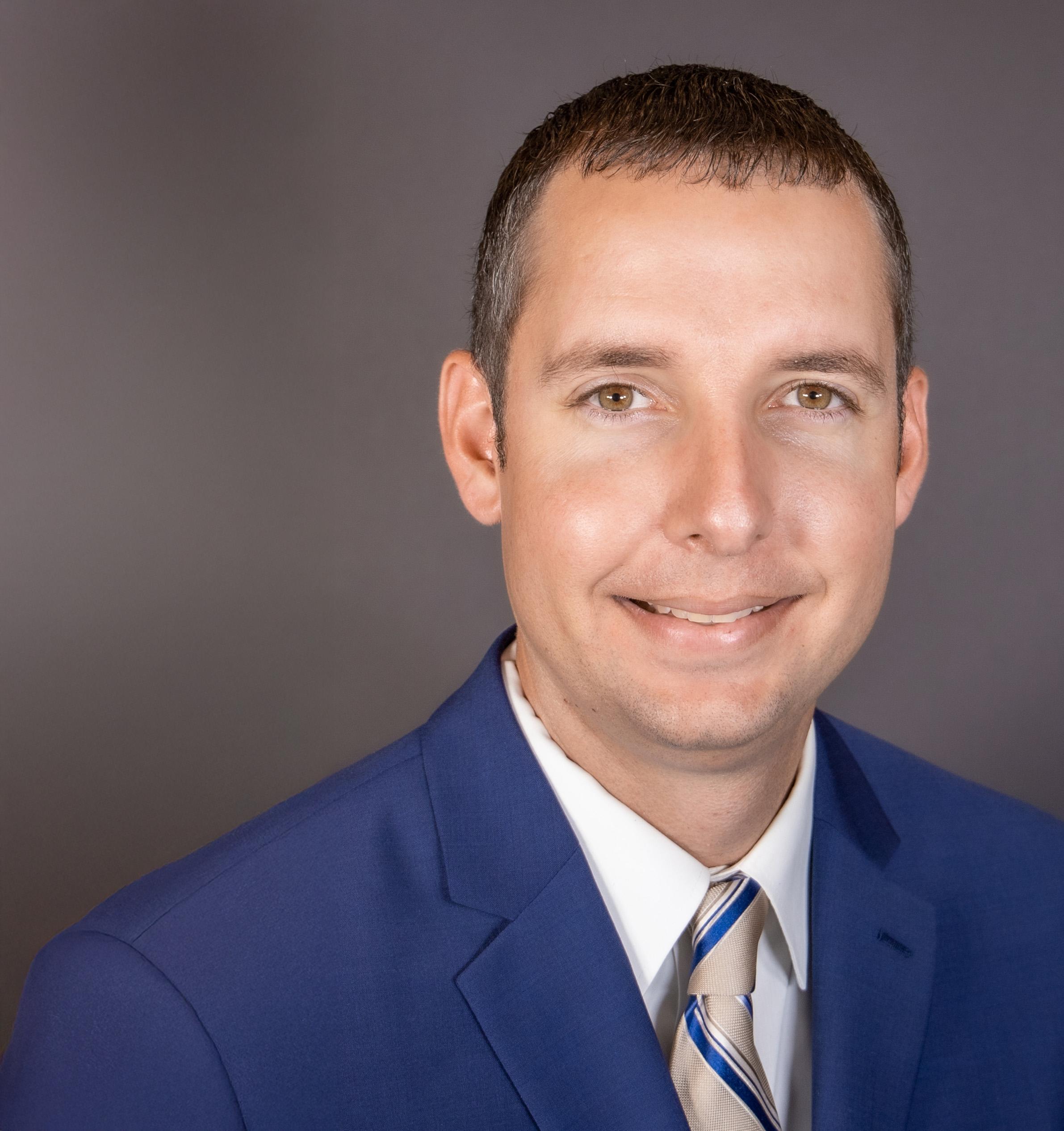
property management divisions. Otwell excels at identifying growth opportunities and bringing a fresh, forward-looking perspective to every initiative. From reimagining digital campaigns and streamlining internal processes to spearheading corporate events and long-term brand planning, her work reflects a deep commitment to innovation and excellence.
Feather Parrish
Elder Independence
Brooke Parsons
Summit Utilities
Kyle Pate

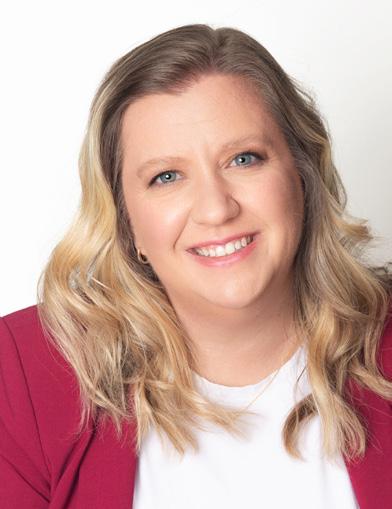
Brooke Parsons serves as director of regulatory affairs at Summit Utilities, where she leads a team supporting regulatory strategy and compliance for the company’s two natural gas operating companies across Arkansas and northeast Texas — Summit Utilities Arkansas Inc. and Arkansas Oklahoma Gas Corp. Parsons earned both her undergraduate degree and Juris Doctor from the University of Arkansas in Fayetteville. She began her legal career focusing on transportation at a Fortune 500 company before discovering her professional calling in the energy sector. Her favorite aspect of the work is the opportunity to collaborate with team members and engage with local communities across the state. She is dedicated to fostering strong relationships while supporting the hometowns and neighborhoods that depend on natural gas for comfort and dependable energy in their daily lives. Beyond her work at Summit, Parsons is actively involved in industry and community leadership. She serves on the board of Arkansas 811 and chairs the Summit Utilities Women Igniting Success & Empowerment Employee Resource Group, where she champions professional growth and inclusion across the organization.
Moses Tucker Partners Kyle Pate, a brokerage associate at Moses Tucker Partners Bentonville, is a Fayetteville native and former Razorback pitcher. His competitive drive and entrepreneurial spirit have positioned him as a rising leader in northwest Arkansas’ commercial real estate landscape. Before entering the industry, Pate helped launch the e-commerce startup Julep Digital. Since joining MTP in 2022, Pate has been instrumental in more than $35 million in transactions, including the ground lease for the Powerhouse Seafood & Grill property in Fayetteville and the sale of Wilson Park Apartments in Fayetteville. Pate’s portfolio spans from local investors to national institutions, and he is actively working to bring new restaurant concepts, along with residential and mixed-use developments, to northwest Arkansas. A graduate of Leadership Fayetteville Class XXXVII, Pate is pursuing his Certified Commercial Investment Member designation and serves on the boards of Bike.POC in Bentonville and the Yvonne Richardson Community Center in Fayetteville. He also volunteers with 99 Balloons’ bEfriend program.
Nikki Pearson
Arkansas State University
Carrie Phillips
Arkansas Tech University in Russellville, where she served as director of communications and marketing, led a brand study and campaign, and helped develop a capital campaign. Phillips received her Bachelor of Arts in journalism and Master of Arts in multimedia journalism from Arkansas Tech. Her Doctor of Education in higher education and higher education administration is from Texas Tech University.
Lee Porter
Ozark Green Roofs
Allison Pruitt
Arkansas Children’s
Garland Rice IV
Stallion Transportation Group
Alex Rogers
Baldwin & Shell Construction Co.
T.
Brent Rosson Jr., M.D.
North Arkansas Regional Medical Center


The University of Arkansas at Little Rock Carrie Phillips is the chief communications and marketing officer at the University of Arkansas at Little Rock. She is responsible for providing vision, oversight and management of strategic communications, marketing, media relations, publications and web/social media across the institution. She leads the office of communications and marketing, where she implements strategies to increase awareness and positive brand recognition in order to attract students, motivate alumni and donors, and recruit and retain exceptional faculty and staff. She joined UA Little Rock in 2022 and previously spent 14 years at
Dr. T. Brent Rosson Jr. is a boardcertified internal medicine physician who has served at North Arkansas Regional Medical Center in Harrison since 2017. A native of Harrison, he returned to his hometown after earning his medical degree and completing his residency at the University of Arkansas for Medical Sciences in Little Rock. Rosson is the medical director at Hospice of the Hills and Hillcrest Home, both in Harrison, and has served on numerous hospital committees focused on clinical quality and patient care. In recognition of his leadership and dedication to rural health care, he received the Arkansas Hospital Association Distinguished Service Award in 2022.
Anna Russell
The Buttered Biscuit
Fredricka Sharkey
Pulaski County Special School District









Like a lot of children of entrepreneurs, Blaine Tanner grew up working at his parents’ business, in this case beloved Little Rock restaurant Cheers in the Heights, where he did everything except tend bar.
Despite that early grounding — or on some level, perhaps, because if it — he did not come straight home from the University of Arkansas in Fayetteville, as might have been the original plan, to pick up where he left off — far from it, in fact.
“When I went to the U of A, it was by design to come back and jump back into the business with the family,” he said. “Instead, I had an epiphany moment, and I actually fled to Colorado, didn’t even tell my parents until after about three weeks of being there, and then I was like, ‘Oh, actually guys, I signed a lease. Sorry.’”
With the benefit of perspective, Tanner credited his impulsive move to providence, since it was in Colorado that

BLAINE TANNER
Family Recipes
he met his wife, Virginia, a soulmate who would be an integral part of his life from then on.
“It was during a hard time with our family that, shortly after moving to Colorado in 2016, my sister passed away. It was just a constant reminder that life is short and you have to make the most of it,” he said. “I ended up staying in Colorado for a little while and sold insurance and worked for ADP, and then at some point, my wife, who was already in the food business, and I decided to maybe get into catering.
“Before we got the ball rolling, my parents sat us down and told us that they would be supportive like they always were, but they did encourage us to come back home and be fully enveloped in the business. That’s what we ended up doing in 2020.”
To his great satisfaction, Tanner found every aspect of the restaurant business appealing on some level, from the publicfacing side to the food side of things to the real estate and finance acumen that goes into opening new properties.
“The business-aspect side of it is one draw, just for the fact of creating something unique and bringing something special to an area,” he said. “Ensuring that we are being profitable just not only for us but for the families that work for us is another challenge I enjoy.
“Then you have the customer experience. Something my wife and I came up with together, and I guess you could call it a mission statement or a work slogan, goes, ‘You can get service anywhere you go, but you can’t always get hospitality.’ That’s what we’re always trying to do with every dozen oysters,
with every platter — to serve it with hospitality.”
Today, the family holdings have expanded from Cheers to include Little Rock favorites Samantha’s Tap Room & Wood Grill and Eastside Scrapyard event venue, built from the ground up, as well as the acquisition and refurbishing of Stifft Station stalwart The Oyster Bar. The last project holds particular meaning for Tanner.
“When I came back from Colorado, my parents had purchased The Oyster Bar at the end of 2019, and they really gave me a big opportunity to step up to the plate and prove what I had inside of me,” he said. “I was given the chance to pretty much run the Oyster Bar and lead the team to what you see today. I would say it was the biggest project that they could have given me.”
One of the major challenges of the assignment was balancing the generations of existing patrons who gravitated to the former dive-bar feel against the desire to expand the restaurant’s reach by recasting it as a casually elegant spot. To this day, walking that line is a responsibility Tanner takes very seriously as the restaurant’s general manager.
“You know, the building that The Oyster Bar sits in is over 100 years old, and truthfully, it is a Little Rock staple,” he said. “Honestly, it is the most honoring and humbling experience to get the opportunity to take the reins and give it the love that it needed. It’s the 50th anniversary of the Oyster Bar this year, and I want to go another 50 years. I’m 32, and I hope by the ripe age of 82, I’m looking at it, and I’m laughing about, you know, we’ve had a good run.”
By Dwain Hebda
TRUSTED CANCER CARE.
CONGRATULATIONS, DR. J. CAMILO BARRETO!
CARTI Complex Surgical Oncologist, J. Camilo Barreto, M.D., F.A.C.S., has been named among AMP’s “Future ICONS,” a distinction honoring Arkansas’ brightest professionals under 40. Known for his precision and innovation, Dr. Barreto exemplifies CARTI’s committment to accessible, patient-centered care. His recognition by AMP reflects his unyielding dedication to providing leading-edge surgical oncology to patients across the state.



Kala Slaton, M.D.
Conway Regional Renaissance Women’s Center
Shelby Starson
Alcon

Dr. Kala Slaton is a board-certified OB-GYN at Conway Regional Renaissance Women’s Center. Since 2020, she has provided comprehensive OB-GYN care to women across all stages of life with a focus on minimally invasive surgical techniques, including the da Vinci Surgical System and vaginal natural orifice transluminal endoscopic surgery, or vNOTES. Slaton is also experienced in managing high-risk pregnancies in partnership with maternal fetal medicine specialists. Passionate about expanding access to women’s health care, she leads a rural outreach practice in Morrilton, where she helps meet the needs of patients in underserved counties without local OB-GYN services. A graduate of the University of Arkansas for Medical Sciences in Little Rock, Slaton completed both her medical degree and OB-GYN residency there. She is a fellow of the American College of Obstetricians and Gynecologists and a member of The Menopause Society. Recognized for her excellence in education and surgical care, Slaton has received multiple awards, including Outstanding Resident in Reproductive Endocrinology and Minimally Invasive Surgery.
Hunter Smith, DDS
GPS Dental
Justin Sparks
Assembled Products Corp.
Lorenzo Stephens
Lefty’s on the Square
Blaine
Tanner
Oyster Bar
Leslie
Taylor
AJ Gallagher
Jack Thomas
Little Rock Regional Chamber
Presley Turner
Turner & Rasch, Attorneys at Law
Eric Varner, CPM
Kelley Commercial Partners
of Ouachita Baptist University’s Hickingbotham School of Business in Arkadelphia, Varner also gives back through his service at Park Hill Baptist Church in North Little Rock, Central Arkansas Christian Schools in Little Rock and FORE Ouachita Golf Tournament.
Itzel Velazquez
Kiva Little Rock/Forge
Courtney Wellborn
Cache Restaurant
Eric Varner is vice president and partner at Kelley Commercial Partners in Little Rock, where he oversees the management of more than 175 properties totaling more than 8.5 million square feet and leads a team of 54 employees. Varner joined the firm in 2013 and quickly advanced, earning his Certified Property Manager designation in less than 18 months as part of the Institute of Real Estate Management’s inaugural Next-Gen CPM Leaders class. He became a shareholder-partner in 2018 and was appointed vice president in 2023. Varner has held leadership positions with the Institute of Real Estate Management and the Little Rock and North Little Rock Chambers of Commerce. A graduate
Voting kicks off July 28 and goes through August 10. Once voting closes, the winners will be spotlighted and celebrated in the November issue of Arkansas Money & Politics.

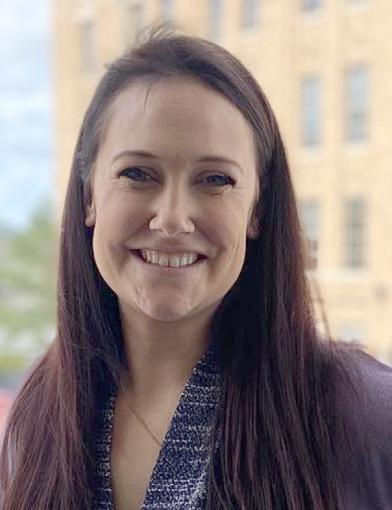
Courtney Wellborn is the longtime general manager of Cache Restaurant in Little Rock’s River Market district. Her goal is to ensure that guests continue to feel as though they have been transported beyond Little Rock without leaving town. The restaurant’s private dining options take that experience a step further. Wellborn and Cache use Pinpoint Dining for private party planning, in addition to a dedicated event manager. Wellborn’s mission is to ensure impeccable service, attention to detail and a setting that elevates any occasion remain the trademark of Cache.
Lucy Speed Whiteside
LSW Strategic Communications
Hudson Yancey
Content Solutions Northwest Arkansas
Risk-Takers, Rule-Breakers, Dealmakers:
TRAILBLAZING WOMEN
It is not easy to forge a path. In fact, the sheer rates of failure among those who attempt to make something out of nothing discourage many from even trying. U.S. Bureau of Labor Statistics numbers show 20 percent of businesses shutter within their first year. The National Center for Education Statistics reported in 2018 that 33 percent of first-generation college students drop out during their first three years, and Aspiring Author notes that 95 to 99 percent of book manuscripts submitted to editors never see the light of day.
Those who are not only bold enough to chase their dreams but tenacious enough to succeed are an elite group indeed. It is those trendsetters, leaders and entrepreneurs who Arkansas Money & Politics has the privilege to honor as the 2025 class of “Trailblazing Women.”
Women change the world in ways big and small each and every day. According to the Pew Research Center, as of 2023, in the United States, women comprised more than 30 percent of university presidents, 10 percent of CEOs at Fortune 500 companies and 24 percent of governors reported in 2023 that the more than 14 million women-owned small businesses in the country account for nearly 40 percent of the nation’s businesses, generate $2.7 trillion in annual revenue and employ nearly 12.2 million workers.
It is not an easy path to the top.
The Pew Research Center’s 2023 study of attitudes about women in

leadership roles found that although record shares of Fortune 500 CEOs and board members are now women, 55 percent of Americans believe there are not enough women at the top of the business ladder.
As Americans see it, the main reasons for that are women having to prove themselves more than men and gender discrimination, 58 percent and 50 percent of respondents, respectively, noting those as major causes of the disparity. In addition, 48 percent of respondents said the comparatively small numbers of female leaders are caused by family responsibilities, 43 percent said businesses were not ready to hire women for top positions, and 40 percent cited sexual harassment.
The impact of women who overcome such obstacles to become powerhouses in business, politics and the community cannot be overstated. Not only do such fearless females leave their mark on the state’s economic and cultural landscape, but they provide inspiration for the next generation of women planning to take the reins in government, business and nonprofit work.
The pages that follow honor 12 outstanding women who have left an indelible mark on industries such as health care, education, banking, real estate and more. While each story is different, the honorees share a drive and determination that makes AMP proud to call them “Trailblazing Women.”

PHILLIS NICHOLS ANDERSON, E d .D.
Founder, CEO
ScholarMade Achievement Place
Success often lies at the intersection of preparation and opportunity, but it is one’s ability to adapt in the face of changing circumstances that separates the merely successful from the true trailblazers. Setting her sights on education when careers in television and radio proved hard to come by, Dr. Phillis Nichols Anderson embarked on a 14-year teaching career spent in the classrooms of some of the nation’s
most challenging schools. Still, she felt called to something beyond the traditional public school setting.
“Stepping into the charter sector was a leap of faith — but one of the best decisions I’ve ever made,” Anderson said.
Now with more than three decades of experience in education, having opened and overseen multiple school systems across different states, Anderson has become a pioneering figure in the Arkansas charter movement and was among its first woman-of-color leaders. She is the founder and CEO of ScholarMade Achievement Place, a Little Rock charter school organization launched in 2018.
“Launching ScholarMade meant securing venture capital, identifying and renovating a facility, recruiting families, forging community partnerships and writing a compelling application,” Anderson said. “After approval, my pastor’s reminder — ‘Now the hard work begins’ — hit home.”
The hard work was perhaps even harder than initially imagined thanks to the arrival of the COVID-19 pandemic. Anderson’s goal had been to open several ScholarMade campuses, but the model never launched as originally planned. Instead, Anderson and the ScholarMade team took unprecedented challenges head-on, transitioning to virtual instruction and then a hybrid approach, all the while continuing to meet the needs of students, families and staff. No stranger to setbacks, Anderson adopted what she described as a “fail forward” mindset, tapping into her strengths to solve problems or pivot when necessary. While still navigating the long-term impacts of that period, Anderson is positive about the resilience she and others gained through the experience.
“Starting a venture is one challenge; sustaining it is another,” she said. “As we approach our eighth year, we’re beyond the surviving stage. We’re ready to thrive.”
Anderson’s professional pursuits also evolved in the wake of the pandemic. She is now building emotional intelligence curricula for schools and launching a consultancy to help other founders in education, business and nonprofit settings. What is more, just as ScholarMade prepares students to contribute to their communities, Anderson leads by example as an active member of hers. She launched the Alpha Gamma Theta Omega chapter of Alpha Kappa Alpha Sorority to serve North Little Rock, Maumelle, Sherwood, Jacksonville and the Little Rock Air Force Base in Jacksonville — a 41-month endeavor that culminated with 32 charter members. She was also named a Living Legend by Philander Smith University in Little Rock and recognized by the Jacksonville branch of the NAACP. Looking ahead, Anderson is poised to continue carving a path of leadership, service and excellence.
EDUCATION
“Over time, I plan to shift into advisory, writing and speaking roles,” she said. “Above all, I want to prove that every child can reach high levels of achievement when the right support is in place. I’m also diving into policy work — and who knows, maybe one day public office — and finally putting pen to paper on the book that I’ve been carrying in my mind for years.”
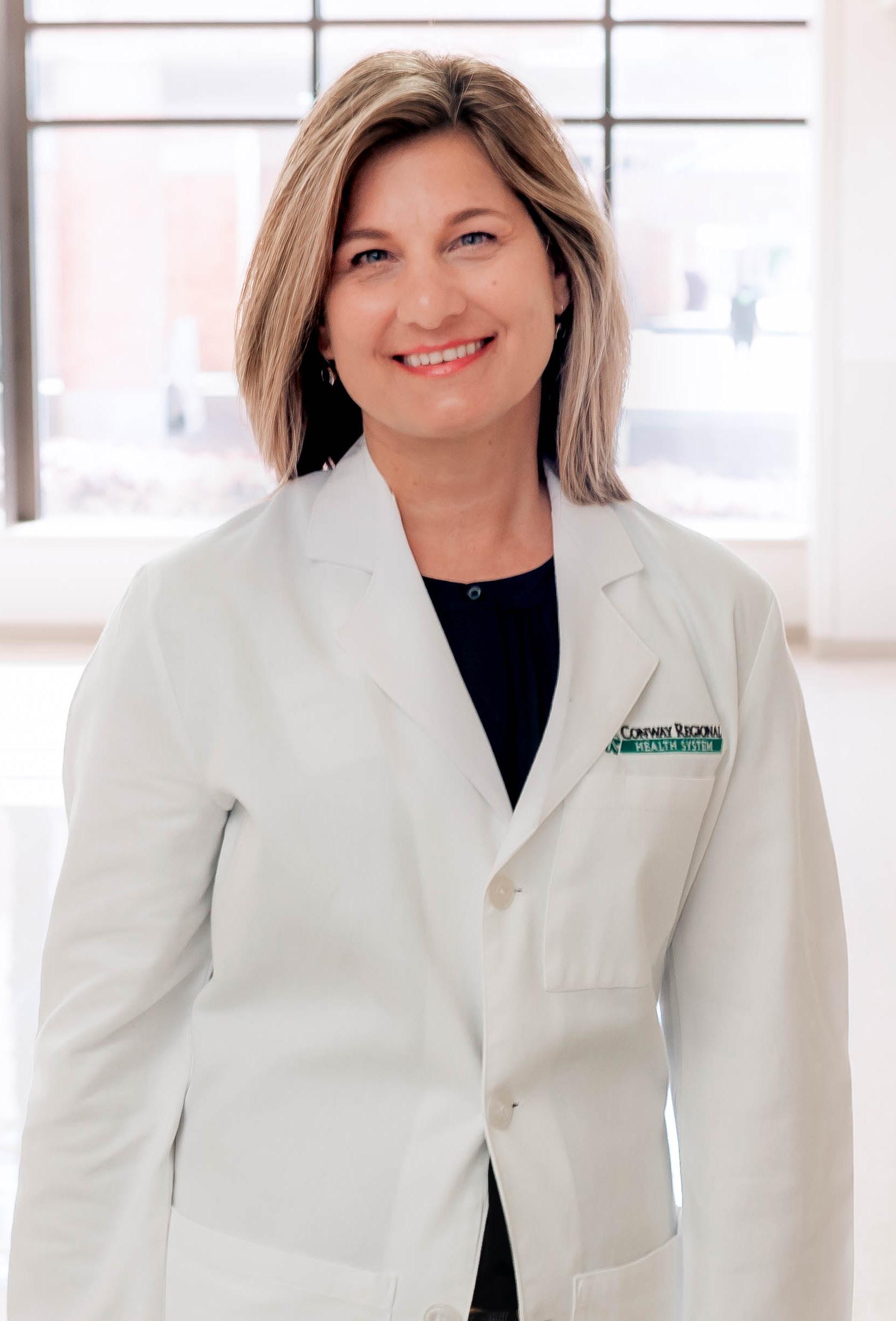
MARY BURGESS, M.D.
Infectious Disease Physician,
Internal Medicine Residency Associate Program Director
Conway Regional Medical Center
More than formal training or technical expertise, it is the lessons learned from experience and other knowledgeable providers that truly shape a good doctor into a great physician. Dr. Mary Burgess counts herself lucky to have been surrounded by mentors who were all devoted to making her a better doctor. Under the guidance of Dr. Larry
Baddour during her residency at the Mayo Clinic in Rochester, Minnesota, Burgess was able to use careful research into a patient’s medical history to finally treat a yearslong recurring infection. She decided on her path then and there, committing herself to helping patients who otherwise believed their infections to be incurable.
“Just last month, a patient was in tears with gratitude when I told her the goal was to cure an infection that she had been dealing with for months,” Burgess said. “Working in this career is something that I love to do every day.”
After the Mayo Clinic, Burgess’ first position at the University of Arkansas for Medical Sciences in Little Rock taught her to navigate the ways in which real patients differ from the textbooks. Learning from some of the best doctors in her field during her formative years left Burgess with a better understanding not only of her specialty but of how to care for individuals, their unique experiences and emotional needs.
“Lessons like these have been so pivotal in helping me to have successful interactions with people of different cultural and educational backgrounds,” Burgess said. “It has helped to get me through the hard discussions with people who are hesitant about treatment recommendations.”
Burgess has paid forward that early guidance as a leader in medical education throughout her career. She currently serves as associate program director of the internal medicine residency program at Conway Regional Medical Center, where she has mentored many young women just starting out their own journeys as physicians. In a field that demands so much time, energy and perseverance, Burgess’ advice is to learn how to prioritize what is really important and surround oneself with a strong circle of supporters.
“During the hard days, those people will be a shoulder to lean on and will help build you back up so that you are ready to come back for another day,” Burgess said.
She also understands the unique challenges female physicians face. Many people’s default idea of a doctor is a man, Burgess said, and women must work harder than their male counterparts to earn the trust of some patients. While she has always found it easy to encourage others, those obstacles initially impacted Burgess’ confidence in her abilities. Fortunately, she had the examples of strong female role models in her own family to draw on. Balancing careers, children and cultural expectations, Burgess’ mother and older sister showed her a path forward. She realized believing in herself was fundamental to gaining the belief of others and redoubled her efforts to succeed.
“I focused on what I can do for myself and my patients and not on the barriers,” Burgess said. “I learned to recognize and celebrate my own wins. This, in turn, has built confidence and has made me a better doctor for my patients.” HEALTH CARE

JESSICA DUFF
Jessica Duff left the University of Tennessee in 2006 with a degree in journalism and sports management and the goal of becoming a sports reporter for ESPN. While she did start out in television as a reporter and producer, her career has since taken a different tack. After leaving TV, she worked in digital marketing before ultimately serving as communications director for a public school district. This latest post has
been especially meaningful for Duff, who described her work in public education as one of the most rewarding experiences in her career.
“I attended private school my whole life until college and was sheltered from seeing some of the hardships that so many families face,” she said. “The past seven years have allowed me to open my eyes and my heart to understanding different walks of life and finding ways to connect with those families to best serve their children and set them up for success through education.”
No corner of communications is free of challenges, perhaps least of all in public school settings. Most recently, Duff has faced the task of navigating a heated political climate and its direct impact on education. The only true way through, she said, is to continue to do the work that most benefits children while underscoring the importance of serving all students, not just a select few. More broadly, one of the best parts of communications work in any arena is also one of its greatest challenges: audience reception.
“When working in communications, you have to find a way to present a story to your audience,” Duff said. “This can be challenging because your audience is never just one person, and how it’s perceived by each person is never the same. Yet it’s rewarding once that story or message is shared and received with acceptance and positivity among stakeholders.”
Duff’s expertise across TV, marketing and school public relations allows her to provide a well-rounded approach to any role and gives her a unique perspective from which to pass on what she has learned to others. Duff has shared her experiences with students for career day at Mount St. Mary Academy in Little Rock for more than a decade, and she works with communications directors from smaller school districts to provide guidance on best practices. Committed to constantly improving her skills and becoming a leading voice in her field, Duff also earned her Accreditation in Public Relations in 2024.
“This accreditation is the epitome of those in the PR field,” she said. “I’m honored to be one of two school communications professionals in the entire state of Arkansas with this accreditation and among roughly 20 percent of public relations professionals in the country with this accreditation.”
At every stage of her career, Duff has been mindful to make changes she felt would most benefit her family. Hers is a balancing act familiar to many working mothers — building a career that allows her to be present in her children’s lives while also showing them how a woman can excel in her professional pursuits no matter what. Duff said her aim for the next chapter of her career is to continue working in public service because she enjoys being able to tell the stories of others’ rise to success, whether they are students, educators or marginalized groups.
“I am incredibly passionate about what I do,” Duff said. “What you see is what you get, and I will always be true to myself while aiming to help improve quality of life for others.”

KATIE BETH EVANS
Katie Beth Evans has turned a creative talent and entrepreneurial spirit into three thriving businesses. She started her career in the beauty industry behind the chair before eventually launching Salon J’adore, a luxury salon in west Little Rock that has been frequently recognized as best in class by customers. Through the venture, Evans realized she had a passion not just for creating but for building something more.
“From the beginning, it was about more than hair,” Evans said. “It was about creating a premium guest experience and a thriving professional culture.”
That realization inspired The Luxury Lady, an online platform where customers can shop high-end, authentic handbags from brands like Louis Vuitton, Gucci and Chanel. Then came Empire Initiatives, through which Evans manages commercial, retail and office spaces. Empire Initiatives gives entrepreneurs the space to grow their businesses, giving budding brands a chance to succeed in an intentional, well-supported environment.
“I didn’t always know I’d work in these exact industries, but I’ve always been drawn to experiences that blend service, style and strategy,” Evans said. “Each of my businesses fulfills that calling in a different way.”
Evans’ companies are all housed under one roof — that is, the building she purchased after Salon J’adore outgrew its original space. From signing the lease on a brand-new business to becoming a CEO, landlord and mentor, her journey is an example to others hoping to follow their passions into professional success. Evans said seeing individuals flourish in those spaces, whether a stylist building their dream clientele, a client finding their ideal designer handbag or a tenant growing a business, makes all of the demands of management worth it.
“I’ve had to learn how to lead a team, manage finances, negotiate leases and scale brands, all in real time,” Evans said. “Entrepreneurship doesn’t come with a rulebook. It’s built by staying adaptable, trusting your instincts, and showing up every single day with a commitment to excellence.”
Evans credited her mother and older sister for having the greatest impact on who she is as a woman, a business owner and mother. The work ethic and discipline they demonstrated showed her how to lead well and love well in both business and life, she said. Evans added that she invites everyone to shop designer items online anytime at TheLuxuryLady.com and to check out Salon J’adore and “see what all the buzz is about.
“I believe success is meant to be shared, and I’m passionate about creating platforms that elevate others,” Evans said. “My goal is to keep building, keep serving and keep pointing everything I do back to God.”

JENNIFER GABBARD
Registered Nurse, Co-owner
The Skin Retreat at Shewmake Plastic Surgery
Jennifer Gabbard began her career in the operating room. As a registered nurse, she honed her skills in patient care, surgical procedures and effective teamwork, not to mention developing a keen ability to work under pressure. Ten years into her tenure in nursing, Gabbard had the opportunity to join the team of board-certified plastic surgeon Kris Shewmake, M.D. The decision to take that job turned
out to be a pivotal moment in her career.
“Working side by side with Dr. Shewmake for over 22 years has been a golden opportunity,” Gabbard said. “Not only have I been able to assist him in surgery, but I’ve also been trained in advanced aesthetic techniques like injections thanks to his passion for teaching.”
Gabbard continued to grow under Shewmake’s mentorship, strengthening not just her nursing talent but becoming a highly specialized professional in plastic surgery and aesthetics. In 2013, the duo opened The Skin Retreat at Shewmake Plastic Surgery in Little Rock, a physician-directed medical spa designed to complement the plastic surgery practice with a suite of state-of-the-art treatments. While her nursing education has been foundational to her success, Gabbard also stressed the importance of hands-on learning through the pressures and stressors of the real world.
“In practical settings, you will face challenges that knowledge alone can’t prepare you for,” Gabbard said. “This is where experience plays its role.”
Aesthetics is a rapidly evolving field, a fact to which Gabbard can attest having seen it firsthand for two decades now. Most prominent among the changes is the sheer pace of technological advancements, but moving right alongside the scientific progress is the rising complexity of patient expectations. Patients are more informed than ever thanks to social media and greater access to a wealth of information about aesthetic treatments, Gabbard said. However, the results one sees online are filtered through the lens of popular beauty standards — to say nothing of literal filters — which can make it more difficult to set realistic goals for one’s own procedures.
“Managing these expectations and ensuring that patients have realistic goals while delivering results that make them feel both beautiful and confident has required a careful balance of education, communication and clinical expertise,” Gabbard said.
AESTHETICS
Founding The Skin Retreat has been one of Gabbard’s greatest accomplishments, surpassed only by the reward of raising “two amazing boys” along the way. Gabbard’s line of work is not for the faint of heart but she said she has been fortunate to have great mentors both personally and professionally throughout her career. Those teachers instilled in her the values she strives to live by each day, such as always doing the right thing and taking responsibility for one’s own actions.
“You are going to make bad decisions or mistakes along the way but how you choose to handle them is what makes you the person you are in the long run,” Gabbard said.
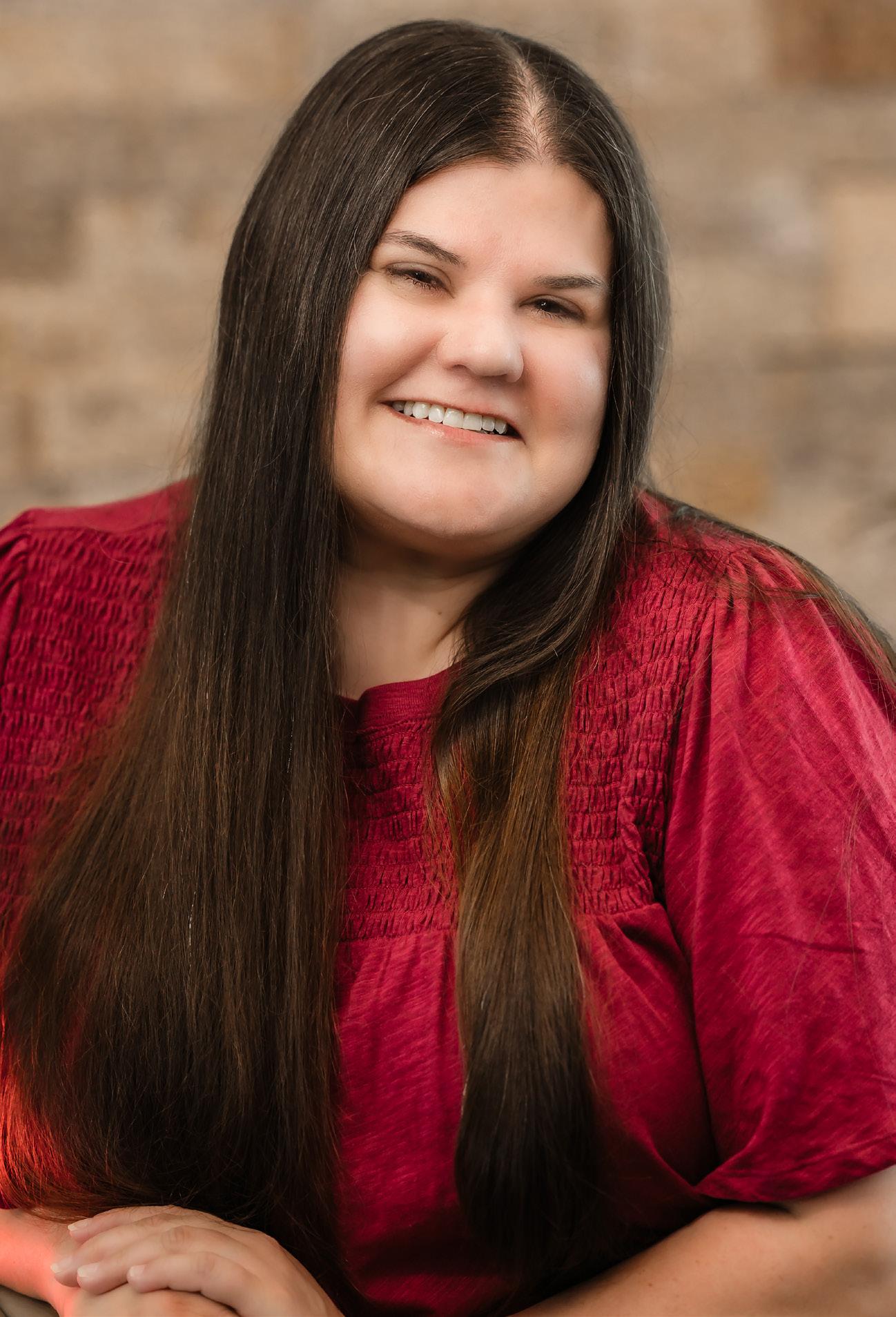
ALANA GIRARD Chief Operations Officer
Alana Girard’s path to banking began earlier than most — at just 12 years old, she was already lending a hand at the bank where her mother worked, shredding documents and organizing files. That early exposure piqued Girard’s interest in the inner workings of banking, and by the time she was 15, she was officially added to the payroll and joined the back office.
“Starting in banking at an early age gave me an edge in mastering the technical side of operations, but my youth and gender often led people to underestimate me,” Girard said. “I quickly learned that expertise alone wasn’t enough; I had to build trust and respect through consistent action.”
Girard later moved to the retail and human resources side of the house, working as a teller, customer service representative, human resources assistant and, eventually, human resources specialist. A major shift came when she transitioned into the technology department and gained a deeper understanding of the bank’s various technical systems. Her unique blend of experience and insight made her the ideal candidate to become director of operations, and Girard now proudly serves as chief operations officer at Generations Bank.
“My journey is a testament to dedication, loyalty, continuous learning and a willingness to embrace diverse challenges along the way,” she said.
Those traits serve Girard well in an environment where shifting regulations, emerging technologies, evolving customer expectations and Generations Bank’s own growing footprint mean no two days are the same. Her goal is to keep each of the bank’s various teams speaking the same operational “language” and ensure alignment between systems, processes, culture and compliance. Undaunted by the challenges she faces, Girard relishes the chance to be a part of Generations’ constant improvement.
“There’s something uniquely exhilarating about watching employees settle into new technology and efficiencies, or opening the doors to a new location and realizing that our collective effort is fueling both local community growth and organizational momentum,” Girard said. “That blend of strategic impact and human connection is why I love what I do.”
Girard credited a pantheon of powerful women for teaching her valuable lessons at every stage of her life. While she was in high school, a business teacher showed her that professionalism and passion can go hand in hand. A branch manager during Girard’s days as a teller impressed upon her the importance of even the smallest details. As she honed her technical skills in college, she learned from a human resources professor to “think beyond spreadsheets” and recognize the people at the heart of every strategic decision. Perhaps most important is the wisdom from her own family — her grandmother’s mantra, “Kill them with kindness,” and her mother’s example of work ethic, perseverance and integrity have been the foundations of Girard’s success.
“Their combined wisdom lives on in my personal motto: ‘Everyone you meet is fighting a battle you know nothing about. Be kind — always,’” Girard said. “I’m fueled by the belief that banking is more than numbers. It’s about unlocking human potential and proving that compassion and performance aren’t just compatible — they’re unstoppable.”

LAURA LABAY
Laura Labay wasted no time at all pursuing her ambitions after arriving in Little Rock from Texas in 2011. Drawn to the idea of working at the state Capitol, Labay walked in, resume in hand, and walked out as the new spokesperson for the Arkansas secretary of state. Her degree in media communication and broadcast journalism, plus prior experience
as an on-air reporter, were immediately put to the test as she fielded calls from major news outlets, penned internal newsletters and wrote for the Capitol magazine.
“It was trial by fire,” Labay said. “I had two phones at all times, taking calls and answering emails in the middle of meetings.”
The experience was a valuable lesson about the power of audacity and preparation, and it served as a springboard for Labay’s later success in an entirely new field: real estate. Her background in storytelling only heightened her ability to bring out the best in a property, not to mention the years spent curating media content already under her belt. While they might not be obviously connected industries, the move was a natural one.
“I’d already lived through buying, selling and managing properties thanks to moving so often with my husband’s military career,” Labay said. “I took those real-world lessons and made it my full-time job to help others navigate that same path.”
Labay specializes in commercial, residential and international real estate. She has listed prominent properties such as the Town Pump in Little Rock and executed deals with major industry players such as the Barnaby Group. She is also part of Team GoGo, an international group under eXp Realty that sold more than $2 billion in 2024.
“We meet via Zoom, support each other and create opportunities globally,” Labay said. “That kind of collaboration is rare and powerful.”
Time in the field as a reporter served to hone the skills Labay picked up with her degree and helped her forge a toughness that has seen her through every stop in her professional journey. Labay credits the women in her family as the origins of that trait. Her great-grandmother owned and ran The Onlooker newspaper in Foley, Alabama, while her husband fought in World War II. Passed down through her grandmother and mother, Labay said “that legacy of resilience runs in my blood.”
“They taught me to be strong, speak up and do the right thing even when it’s hard,” she said. “I try to pay that forward by mentoring others, being available to lift up young professionals and creating spaces where women feel empowered.”
Reflecting on her career so far, Labay has much to be proud of. Her name in the historical record of Arkansas through newspaper quotes and state archives is one reflection of her impact, and the deals done, communities shaped and clients reached through her real estate work are another. With no less ambition than she had standing on the threshold of the Capitol more than a decade ago, Labay said she wants to keep expanding globally and cement her impact on the world — not only with what she accomplishes but with who she helps along the way.
“Trying new things is scary, but I’m confident in my ability to handle what comes my way,” she said. “No one ever built a legacy by playing it safe. Show up, stand tall and don’t wait for permission.”

ERIN LAINE
Co-owner
Cecil’s Fine Jewelry
Some of the best career trajectories take shape when one decides to take off in an entirely different direction. That was the case for Erin Laine, who traded her post as a surgical coordinator at the University of Arkansas for Medical Sciences in Little Rock for a job in the family jewelry business. There was at least some precedent — her mother, Becky Whelan, bought Cecil’s Fine Jewelry in Little
Rock in 2003 “with absolutely no jewelry knowledge,” Laine said. Neither woman is keen to let unfamiliarity with a subject stop them from achieving, and the success of Cecil’s in the years since is a testament to their determination.
“I had never been in retail or sales and knew nothing about jewelry other than I liked it and didn’t have enough of it,” Laine said. “I have been doing this for 16 years and learn something new every day.”
While she has built up her knowledge of the industry through experience and has the track record to prove it, Laine said she still suffers from imposter syndrome on occasion. Her advice to women carving their own professional paths and facing uncertainty is to lift up other women, stand up straight and work hard until they can go no further. Women cannot stand on merit, Laine said, and have to prove themselves. She has learned that firsthand while at Cecil’s.
“The jewelry industry is a boys club,” she said. “Sometimes you need to show them who you are, let them recalibrate, then proceed with your business. Slay, ladies.”
Laine’s approach is also defined by an authenticity reflective of the company’s welcoming, family atmosphere. Whether behind the counter or out and about, “what you see is what you get,” she said. Her Cecil’s family is made up of a team of hardworking individuals who have upheld the company’s core values amid a sea of competition from more established names. The business has maintained its reputation for quality even against economic headwinds, a pandemic and diamond market turbulence.
“We have held strong with our wonderful customers and our incredible staff, and we hope to be here for a long time to come,” Laine said. “We treat everyone the same, whether it’s a watch battery or a $50,000 ring. We will never lose that level of service.”
Laine knows how priceless that kind of team cohesion is, especially when personal and professional challenges are intertwined. Just last year, her husband and Cecil’s comptroller, Scott, was saved by a last-minute liver transplant at UAMS with only days left to live. The pair were off work for almost five months, she said, and the situation took a toll on the whole store. She leaned on the Cecil’s team to get through, especially her mother, who “kept our ship sailing until we could return,” and sales manager and friend Lindsey Butler, who Laine described as her right hand.
“They are my lifesavers,” she said. “When everything seemed like it was falling apart, I knew they were both there to hold me up at home and in business.”
JEWELRY
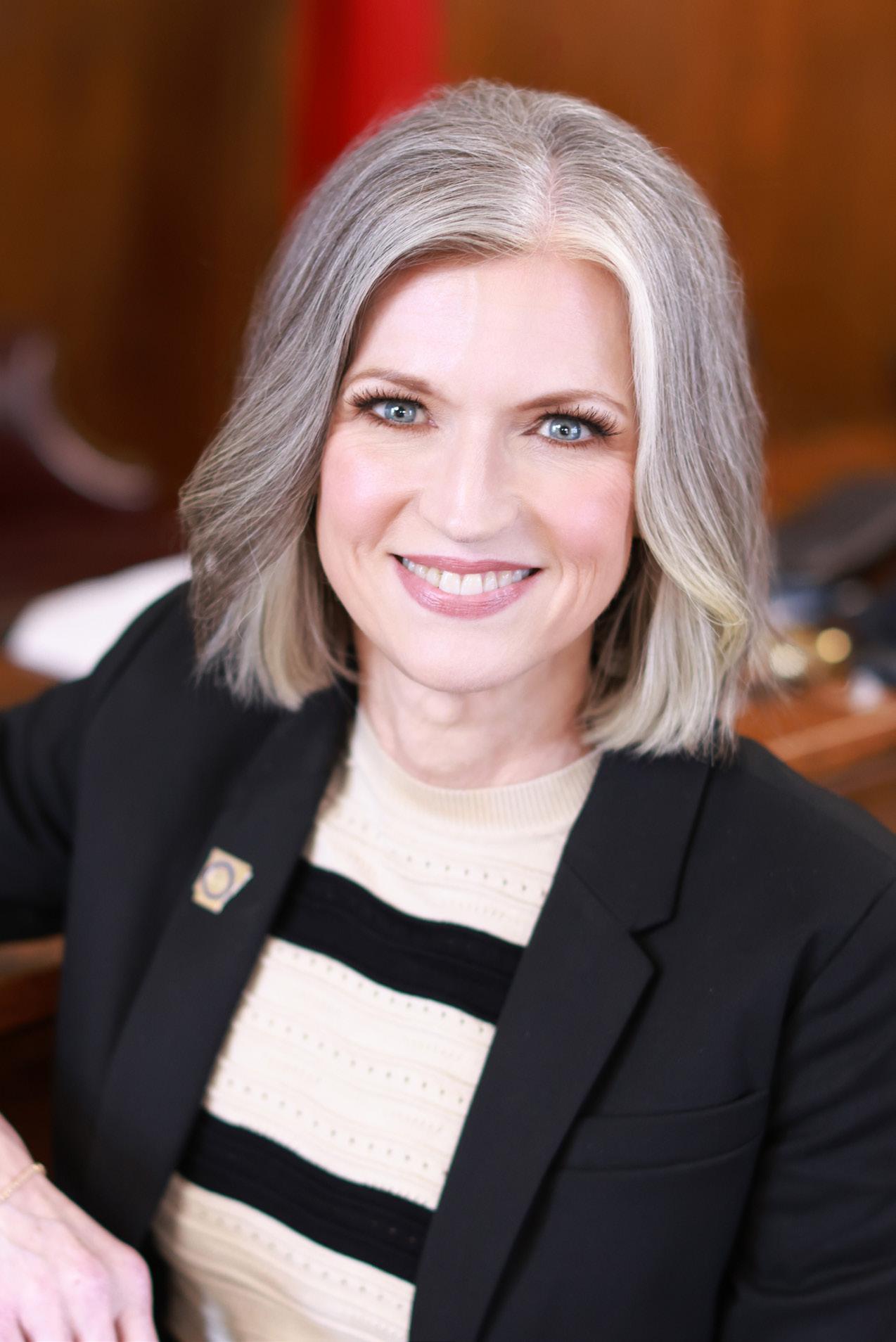
MICHELLE COE LAWRENCE
Prosecuting Attorney
18th Judicial District East
There are plenty of corners of the legal profession where it is easy to see oneself spending an entire career. The prosecuting attorney’s office, however, is not typically one of them. The emotional toll it takes leads many out of the field after a while. That is, in one respect, what sets Michelle Coe Lawrence apart from many of her peers — nearly 30 years’ worth of prosecutorial experience.
“I always knew I would be a practicing attorney,” Lawrence said. “However, I never even remotely dreamed I would find myself in prosecution exclusively.”
Lawrence began her career at the 18th Judicial District East prosecuting attorney’s office in 1997. In 2001, she became division chief in Garland County Circuit Court Division 4, where she oversaw the administration of attorneys and department staff and handled a caseload of the most serious and violent offenses. She added chief of staff to her title in 2010 before being promoted to chief deputy prosecuting attorney in 2015. In 2017, the people of Garland County elected Lawrence to the position of prosecuting attorney.
“It was not lost on me that my community put their trust in me to uphold justice fairly and effectively,” she said. “It is both an honor and a heavy responsibility that I had worked toward for many years.”
Taxing as the demands of the job can be, the rewards of seeking justice are without equal. Prosecuting attorneys and their deputies deal with difficult, sometimes horrific, crimes, and Lawrence said she continues to be shocked by the awful things people are capable of. Still, nothing means more to her than being able to help victims and their families find closure.
“You get to see just how resilient human beings can be,” she said. “I’m honored to walk alongside these victims and their families during the process. They are absolutely inspiring.”
Supporting Lawrence at every turn have been the other women in her life, from her mother, who instilled in Lawrence the values she has carried forward in life, to her colleagues and friends, who provided guidance, direction and steadfast encouragement. Recognizing that her career success, not unlike prosecution work itself, is a team effort, Lawrence makes it a point to return the favor to those following in her footsteps.
“I know how invaluable it has been and continues to be in my life,” she said. “I want to give that back to the younger professionals in my field and support them wholeheartedly.”
A leader in her field and her community, Lawrence was presented in 2015 with the Deputy for Justice Award by the Arkansas Prosecuting Attorneys Association, in addition to receiving the Superhero Award from the Cooper-Anthony Mercy Child Advocacy Center in 2018. She is a member of the National District Attorneys Association, the Arkansas Prosecuting Attorneys Association, the American Prosecutors Research Institute, Leadership Hot Springs, the Garland County Multidisciplinary Team, Arkansas Alumni Association and the Hot Springs Alumnae chapter of Delta Delta Delta. Ultimately, Lawrence said she is most honored by the continued trust placed in her “to pursue justice fairly, protect the vulnerable, uphold the rights of all people, and ensure that our justice system works with integrity and transparency.”
“I can only hope and pray that I leave the world a little better than I found it,” she said. “I hope that I have made a difference in the life of at least one person.” LAW

SUSAN ERWIN PROWSE
International Performing Artist, Creative Entrepreneur
Big Red Dog Productions
Susan Erwin Prowse spent the first chapter of her adult life checking all the “right” boxes. Degree in hand, she entered the corporate world as a radio frequency engineer for Alltel, working on national projects, earning certifications and saving the company millions through process improvement initiatives. Like many, Prowse had eschewed a childhood dream for more practical pursuits, but she could not
shake the feeling that she was meant for more. In 2004, Prowse left the cubicle behind to become a full-time musician.
“Growing up in a small town, a career in music seemed like a dream, not a plan,” Prowse said. “Performing, connecting with people from stages and building something meaningful through music was always in me. It just took a while to fully claim it.”
Prowse has spent the two decades since building a global performing career, releasing original albums and launching business ventures, all without the help of a label or record deal. The change of profession also led her to her husband and musical partner, Cliff, with whom she founded Big Red Dog Productions and the Entertainers Academy in Little Rock. Cliff & Susan’s debut album, Fiddle & Keys, charted in the top 40 on the Apple Country Albums Chart. The duo also had an impressive showing at the 2025 Arkansas Country Music Awards, taking the top spots for Entertainer of the Year, Vocal Duo/ Group of the Year and Album of the Year.
“The most rewarding part is knowing I’ve built a life on my own terms, doing what I love with the person I love for people who believe in us,” Prowse said.
As an entrepreneur, business leader, educator, promoter and performer, Prowse has felt the pressure of needing to do it all while appearing effortlessly available, likable and strong. Through burnouts, heartbreaks and unhealthy relationships, she also faced an infamous aspect of the industry — alcohol. Prowse realized that sobriety was the only way forward if she wanted to continue to pursue her calling, and the decision proved to be a turning point.
“Personally, I’m proud that I healed,” she said, “that I chose health, love and purpose over chaos, that I created a life where I wake up excited and I go to sleep knowing I’m living in alignment with who I really am.”
ENTERTAINMENT
Now an industry leader, Prowse aims to be for others what she needed at different stages of her journey — “a sounding board, a source of belief and someone who sees their greatness before they do.” Prowse and three of her colleagues founded the Piano Ladies, a nonprofit sisterhood of international piano artists and entertainers. Through the Entertainers Academy, Cliff & Susan are able to support fellow independent artists on their own paths. What started as one woman’s leap of faith has grown into a legacy of leadership, inspiration and connection, and Prowse has stayed true to her vision — and her home — every step of the way.
“No matter where our music takes us, I’ll always carry Arkansas with me,” she said. “This is where I learned to work hard, dream big and never forget my roots.”
Photo by Bailey Burton

CHARLENE SIMON
Handcrafted Soap and Cosmetic Maker
Bathhouse Soapery & Caldarium, Villainess Alchemy
Hot Springs has a way of collecting the most unlikely stories. Before setting up shop in Spa City, a 19-year-old Charlene Simon lived in San Diego and took a trip to the small town of Julian — a place, she said, with the same “old-world magic” she would later find in Hot Springs. Standing in the middle of the town soapmaker’s shop, Simon was struck by a rare moment of career clarity. Soapmaking was to be her craft, her
passion and her business from then on. That business has grown in the quarter-century since from a kitchen-table hobby into multiple boutiques, a manufacturing operation and two beauty brands — Bathhouse Soapery and its “twisted sister” Villainess Alchemy.
“I didn’t even know this industry existed apart from being a religious nightly bather,” Simon said. “Soapmaking found me, and through it, I found myself.”
Soapmaking may have felt like a calling, but the business of shopkeeping has not been without its hurdles. A mother and wife at 15, Simon dropped out of high school, pursued a GED and never went to college. A born autodidact and avid knowledge seeker, she has learned both her craft and her business acumen from industry examples and her own experience. Expertise in any area of the business, from design and human resources to formulation, legal work and leadership, has come from trying, failing and trying some more.
“In this industry, one of the oldest crafts in human history, reinvention is vital,” Simon said. “I’ve moved stores, reimagined my brands, expanded, downsized and expanded again as life demanded. I’ve always trusted that my passion comes from a higher source, and when it calls, I do my best to listen.”
Simon’s journey is one she feels called to share. She served nearly six years on the board of the world’s largest trade association for handcrafted soap and cosmetic makers, including two years as board president. Simon also cherishes the impact Bathhouse Soapery & Caldarium and Villainess Alchemy has had on many young women as a first job or initiation into the industry. Her daughters, meanwhile, are a further reminder of the importance of uplifting others and being an example of what is possible.
“I’m proud that I built a business from my kitchen table that now employs dozens, has helped breathe new life into a historic downtown and has inspired many to follow their call,” Simon said. “More than anything, I’m proud that my children see the value of nourishing their own spirits in a world that can easily drown it.”
BEAUTY
Simon has come to see her relationship to her businesses as just that — a relationship, one requiring give and take, balance and artistry. The Bathhouse Soapery and Villainess Alchemy brands are the proverbial sinner and saint, she said, the dark and light side of a time-honored craft. Her pursuit of the magic that first captured her has become a testament not only to its power but her own.
“I’ve always said that making soap is my church and the bathtub my altar,” Simon said. “I believe each of us has a voice inside calling us to our highest work. Sometimes we can’t hear it, and sometimes we doubt it’s there, but it is. Listen for that whisper. Let it grow louder. Life softens when we do the work we’re truly called to do.”

KATHY SWANSON
Kathy Swanson is not in the C-suite or a corner office. She has not been climbing the corporate ladder or leading an organization. What she has done, however, is navigate the existential task with which every human being is faced: finding meaning and purpose in the unique path one is given to follow. Swanson’s own journey has been laced with difficulties from an early age, and she has faced both the
consequences of her own actions and the unpredictable circumstances of life at every turn.
“I learned then, as I am reminded now, that life does not always reward silence, nor does it always acknowledge being an advocate,” she said.
One of those circumstances was the abrupt end of a nearly 30-year career in public service, one Swanson built on “hard work, ethics and integrity.” Neither chosen nor expected, the event left Swanson without a safety net and suddenly staring down an uncertain future. As she sought new opportunities, doubt began to creep in. Swanson pushed forward, however, and while hesitant to describe herself thusly, she characterized trailblazers as those who “gather up a thimblefull of courage and step out to be seen and heard.”
“If I have any experience in being a trailblazer, it is defined in finding real purpose in the face of adversity and my unyielding resolve to emerge from the storm,” she said.
“The storm” also has an all too literal meaning for Swanson, who was in the path of the EF3 tornado that tore through central Arkansas in March 2023. She remained steadfast in her efforts to take care of herself and others during the aftermath, while continuing to serve her community. Long a financial contributor to several local nonprofits, Swanson leaned even further into volunteering and offering her services even as her financial situation changed.
Along the way, Swanson has also developed an affinity for — and skill in — martial arts. She earned her first-degree black belt from Master Hong’s Olympic Taekwondo in Little Rock and has a Junior Instructor Level 1 certification from Li Shifeng Kungfu Academy. Her passion stems from an intrigue in the philosophy on which the systems are based, she said, and Hong regularly reminds his students that a strong body helps develop a strong mind — the “do” in taekwondo means “way” or “discipline.” The five core tenets of the sport are courtesy, integrity, perseverance, self-control and indomitable spirit.
“I try to live my life by these principles in all areas of my life,” Swanson said.
Swanson’s path, winding at times, is guided by the best advice she said she ever received: “Give when it is in your power to do so. Just give part of you to someone else.” Years of dedication to philanthropic causes and service has prepared her not only for this very moment but for the ones ahead. Resilience, Swanson said, is the choice of kindness over bitterness, loving-kindness over hatred and forgiveness over resentment.
“These are the principles I would like to leave as my legacy,” Swanson said. “While facing some of life’s hardest moments, I choose to keep giving, growing and cultivating a heart forever seeking new interests and, especially, new opportunities to be of service to others.”
SERVICE
Martial Artist, Former Public Servant
Photo by David Lewis

KEEPING WATCH

While counterintelligence has always been an issue, it may be bigger now than ever before.
In a world where artificial intelligence looms and headlines report millions of dollars’ worth of damage at the hands of hackers, it is little wonder that cybersecurity gets more buzz when it comes to protecting business assets.
However, as recent high-profile incidents — such as the assassination of a health insurance executive in 2024 and the murder and attempted murder of Minnesota lawmakers and their spouses just this year — have shown, it behooves companies, executives and other prominent individuals to consider their safety in the world of flesh and bone, as well.
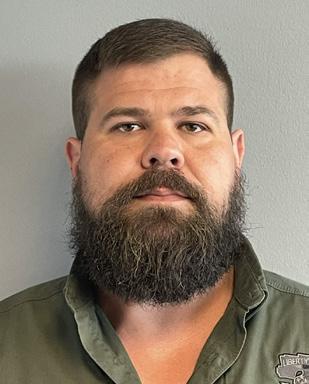
“Security itself is not as sexy as people think,” said Jonathan Reeves, co-founder and chief operating officer at Liberty Defense Group, a northwest Arkansas-based multistate security company. “It’s actually very boring. Security work is all about the overwatch and the protection of your clients’ facilities, assets, their personnel or products, whatever it may be.”
On the other hand, life does sometimes emu-
For personal security companies, sometimes ‘truth stranger than fiction’
By Mak Millard
late spy movies, at least in minor ways. Kyle Ogden, owner of The Private Eyes private investigation firm in Little Rock, originally crossed paths with business partner Jerry McIntyre when the two were hired on either side of a divorce case. It is not uncommon, Ogden said, for someone to hire The Private Eyes just to keep from being investigated by the firm on behalf of someone else.
While counterintelligence has always been an issue, it may be bigger now than ever before, and The Private Eyes has to keep that front of mind when working with clients.
“We certainly have to take it seriously because of all the assets that are out there nowadays,” Ogden said. “We think we have the best equipment, we think we’re the smartest in the business, but you have to be very alert at all times.”
Private Eyes’ main caseload is divorce and child custody cases. Its high-profile clients are often traumatized or threatened by a spouse in some way, so the company provides peace of mind, either through mobile or fixed surveillance, to at-
Jonathan Reeves
tempt to ensure their safety at all times. A contentious domestic dispute can become even more fraught during cases where there are more assets at stake, such as for a company executive or other business professional.
“When you start arguing and fighting over money and property and children and child support, as you’ve seen on Dateline or 20/20, people do crazy stuff,” Ogden said. “It’s just dangerous nowadays.”
Over the course of more than three decades, The Private Eyes has built up a trusted reputation providing domestic, corporate and industrial surveillance, including undercover operations, covert audio and video surveillance and night-vision capabilities. A piece of evidence collected by the group can make the difference between defeat and victory in the courtroom, and the company is trusted by a number of law firms, corporations and individuals in Little Rock and beyond.
“We just try to keep them as safe and prepared and alert as they can be,” Ogden said. “We offer help with our clients 24/7 if they need us there. We don’t mind being there and watching and documenting, and we do that physically or we do that with cameras. We do it with drones. We do it various different ways.”
With locations in Arkansas, Missouri, Louisiana, Mississippi and Kentucky, Liberty Defense Group provides physical security in a range of contexts and applications. While the company offers protection for large corporate clients, retail shops and construction sites, for example, its main focus is the cannabis industry. Still a relative newcomer to the world of above-board commerce — and full to the brim with circulating cash and valuable goods — cannabis is a particularly ripe area for security threats.
“Cultivators, outdoor growers, indoor growers, dispensaries, processors, cash transport, product transport — all of it is a super high-value target,” Reeves said. “It’s the most high-value target in America that we have today.”
Liberty Defense Group was founded by Reeves and business partner Ryan Hansen, both U.S. Marine Corps veterans with experience in private military contracting and mercenary work. The company is uniquely equipped to serve the industry thanks both to its focus on hiring other veterans and a training program specifically developed for its security specialists. Employees coming from a special forces or other combat background have to learn to be proactive rather than reactive, Reeves said, adding that the basic state-level re-
quirements for security licensing do not address the demands of cannabis-industry clients.
“It’s just completely different,” Reeves said. “We built our own training platform to be able to train these guys [with] the knowledge of what goes into the marijuana industry — the cultivation, how to act, how to be professional in a dispensary world, what to look for, the different types of threats coming in. … [We got] blessed by the state police department here in Arkansas to be able to train our own guys, and that’s how we do it.”
Once trained, security specialists are assigned to teams for the company’s various clients. Whether posted at a dispensary, cultivator or processing facility or transporting cash, each team is designed to meet the needs of the specific facilities they serve. Not only is it important to protect products and money but also to ensure the safety of budtenders and patients coming in and out of the dispensary.
“We’re not flamboyant about it,” Reeves said. “We don’t drive massive trucks. Everything’s done by soccer mom cars. Everything’s concealed. Everything’s very under the radar. Some days are boring. Some days are action packed. Some positions are forward facing, in front of the clients, patients or customers, [and] others are hidden away in the back room, watching videotapes or doing other things.”
The company also offers security consultations to help identify vulnerabilities before they turn into catastrophes. Not dissimilar to cybersecurity, prevention is everything, though an unfortunate number of organizations wait until after disaster
Not dissimilar to cybersecurity, prevention is everything, though an unfortunate number of organizations wait until after disaster has struck to start investing in protection.

Jerry McIntyre, left, and Kyle Ogden of The Private Eyes. (File photo)
As a security company, your product is that person.”
— Jonathan Reeves, Liberty Defense Group
has struck to start investing in protection. There are more potential weak spots than perhaps most companies might think, and risks start well before the front door.
“One thing that we get all the time [is], ‘Oh, we’re secured,’” Reeves said. “Yeah? What about your parking lot? No matter who you are, if you’re a manager of a dispensary or you’re the manager of a Walmart … or you’re a corporate executive that comes in at 5 a.m instead of 7 a.m. like the rest of his team — I mean, if anybody wants you, what time frame do you think they’re going to come find you?”
From small shops to large organizations, Liberty Defense Group consultations cover everything from lighting and security camera placement to badging into the building, interior and exterior security systems, and facial recognition capabilities. Still, the biggest threat for cannabis businesses, as well as manufacturing and large operations of the Amazon or Walmart caliber, is internal theft, Reeves said. It is employees, after all, who best know the schedules and potential blind spots of their companies. Also high on the list for corporate settings is individual protections for the most important names on the organizational chart.

“When you’re pumping $200,000 to $300,000 per executive employee, why does that guy not have some kind of bodyguard service?” Reeves said. “Your biggest ones like Walmart, obviously they have their own internal situation going on, so you’re not going to find an executive there that doesn’t have some type of protection. It’s these smaller corporations. Each one of these corporations has executives that

they put a lot of money into. They all have life insurance. They all have succession plans if they die, but what’s there to prevent that from happening?”
Thankfully, the technology available to surveil, shore up and safeguard one’s business or personal interests has only proliferated since companies such as The Private Eyes got started. During an era where virtually everyone has a cellphone in their pocket and a camera on their doorbell, more people might be savvy to the possibility of being monitored, but there are also more ways than ever to gather valuable information for those able to take advantage of the latest methods.
“I don’t even have the right word to explain how much it’s evolved, especially when you start talking about tracking devices, computer tracking, vehicle tracking, drone tracking, drone video, wireless and still data cameras,” Ogden said. “You just have to be prepared to be able to get the surveillance footage, whether it be an insurance case or a child custody case or a drug case or allegations of some wrongdoing. You have to be pretty diversified on how you can get that documented into a courtroom because times have changed drastically.”
The intersection of the digital and real worlds has only made for more bizarre cases for Ogden and his team. After 35 years in business, it was only last year that The Private Eyes launched a website.
“That tells you one of two things,” Ogden said. “We’re either stupid, or we do really good work without a website. We’ve been referred to from extremely smart and competent attorneys for a long time. I say that to say this: Since we have obtained that website, we have seen some of the absolute craziest cases. They’re much more diversified, and it’s almost [that] the truth is stranger than fiction.”
New ground is also constantly being broken on the physical security front. Utilizing artificial intelligence or other tools to read license plates, recognize faces or even detect concealed weapons can be invaluable for teams such as Reeves’, but he is also mindful of the irreplaceable human component of protection services. There is no substitute for the instincts of a security specialist with 15- or 20-years’ worth of body language discernment and de-escalation know-how.
“As a security company, your product is that person,” Reeves said. “That’s your widget that you’re selling. You can never take that experience from that guy or that group of personnel or that team. You’ll never get the same experience from a robot, I promise, ever.”






CLICKING STOP
IT companies adapt to industry changes, stress cybersecuirty

By Alex Hardgrave
Long gone are the days when one computer would take up a whole room. Now smartphones allow people to carry a minicomputer in their pocket everyday, and desk-sized computers at work connect employees instantly to everything they need to do their jobs at the click of a few buttons.
As computer systems have changed and evolved so much and so rapidly, so have information technology and network service companies in the Natural State.

One company, Network Services Group, was incorporated in 1989 in North Little Rock, and primarily focused on telephone system sales when it launched. In 1995, it absorbed another company and started in the computer business.
“Back then, the computer business was a little different,” CEO Ryan Flynn said. “The internet wasn’t super popular. We’ve been able to adapt as business and technology has adapted.”
Many of NSG’s clients include health care and financial institutions, municipalities and auto dealerships.
Flynn said those markets have stringent regulations from the government on cybersecurity rules to make sure people’s information is protected.
Pinnacle IT in Little Rock works with a similar clientele, serving municipalities as firms in the legal and health care spaces.

Pinnacle started as a small, home-based company in 1992 and grew from there, now having five locations in the state and one in Texarkana, Texas.
CEO Chris Bates noted the pace of change in the industry, as well.
“If you had told me in the mid-‘90s and early ‘00s about the
Ryan Flynn

“People don’t think they have any data that a hacker or bad actor would want, but you do by simply existing.”
-Teri Westbrook, director of cloud and security, Pinnacle IT

cloud, I would have asked you what you were talking about,” he said.
Bates said the cloud is one of the biggest changes he has seen in recent years. He said benefits of using the cloud instead of a physical server became especially important when more people started working from home and still needed to access work information.
“It really does help with disaster recovery and business continuity if you don’t have everything bolted down to a single site,” he said. “It can also save a company money sometimes.”
Bates said outsourcing technology to an IT company can usually save companies money. It may not make sense for a small business, especially, to have a whole on-site IT department or staff member.
Little Rock’s Smiley Technologies has a history in banking software dating back to the 1960s, said Bethany Holland, Smiley Technologies’ director and network and information security officer.
“We are focused on great banking technology coupled with great customer service,” she said.
The company works with banks all over the country to simplify their infrastructure. It focuses its efforts on end-user support, network security, server admin, reporting and monitoring. The team also works with community development financial institutions and minority depository institutions to assist them with Emergency Capital Investment Program reports to the U.S. Department of the Treasury, she said.
Cybersecurity has been a main focus for all three companies, as well.
“Things are changing so fast in technology that changes in regulations and cybersecurity have got to be a focus — always,” Holland said.
She said every company, no matter its size, needs to worry about cybersecurity.
“At Smiley, we embed cybersecurity into everything we do,” she said. “We integrate cybersecurity into every aspect of our work, from software development and system patching to backup management and network security, along with various other tasks.”
Bates said he has also seen an “explosion of cybersecurity” since starting the company.

“Even 10 years ago, it was an afterthought,” he said.
Now many companies have access to sensitive client information, and they need to protect that in order to uphold a good reputation.
“We see attackers getting more creative and patient,” Holland said. “They aren’t just blasting out generic phishing emails anymore. They conduct reconnaissance and craft messages that look
and feel legitimate. It’s not only malware or well-known scams either. Sometimes it’s just one well-crafted email that can lead to serious financial and reputational damage.”
Pinnacle and NSG offer educational services for clients such as practice emails that test business employees.
“People don’t think they have any data that a hacker or bad actor would want, but you do by simply existing,” said Teri Westbrook, director of cloud and security at Pinnacle.
Westbrook said one easy way to try and spot if an email is a scam is if an email fits the criteria of being “known, needed and expected.”
“Stop clicking on everything,” she said.
“You can have intricate policies, but if you’re still going to click and download something malicious, you can’t stop that,” Bates said.
Flynn said Network Services Group uses an “endpoint detection response antivirus,” which is monitored 24/7. The technology looks for odd behaviors that would show a virus is on a device. That way, the issue can be caught as soon as possible.
“One big misconception is that IT/network support only involves resolving technical issues as they arise,” Holland said. “Effective IT/network support requires a more proactive approach.”
She said that approach includes anticipating potential disruptions and ensuring systems can recover from challenges such as outages and security breaches.
IT companies can work with businesses to determine exactly what services they will need to run efficiently and safely.
“It’s not one size fits all,” Flynn said.

He added that NSG comes up with a customized plan for its clients. The team does not dictate a solution, but rather listens to a company’s wants and needs and offers solutions and tools to accomplish that, he said.
“Another common misunderstanding is the notion that cybersecurity is simply about buying the right set of tools,” Holland said. “While technology can definitely help, cybersecurity is a continuous process that involves people, processes and technology working together.”
IT companies have also been paying attention to artificial intelligence. Flynn said it is a good tool, but he is hesitant about overreliance on the technology.
Holland said the last big game changer in banking technology was the ATM, cards and mobile banking.
“I’m not convinced we as an industry have found the next big thing in banking yet,” Holland said. “We are certainly tracking faster payments, AI and better insights to data for our partners and customers.”
Chris Bates
Bethany Holland
Teri Westbrook
TIDY UP
Janitorial services stress importance of clean commercial spaces
By Alex Hardgrave
People only get one shot at a first impression, the idiom goes, and the same can be said for a business. That is why companies need trusted cleaning and supply services to help keep their buildings sparkling and deliver a positive impression every time.
Sunday Adebayo, president of Adebayo Cleaning Services in Maumelle, has been in business for 22 years following his college basketball playing days with the Razorbacks. He said his company can do all the cleaning a business needs, including daily and nightly cleaning and floor-care services such as carpet shampooing and waxing, as well as disinfection and sanitation.
“We do it all,” Adebayo said.
Adebayo starts clients off with a walk-through and consultation of the space, followed by a dis-

“They have other things to worry about than keeping the office clean every day and night, so I think it’s a good thing to get a cleaning crew in there.”
— Sunday Adebayo, Adebayo Cleaning Services

cussion of the client’s cleaning needs and wants for cleaning. It is a collaborative experience in which the cleaning service team works to make sure the business’ cleaning schedule aligns with each client’s goals, customer traffic and budget.
After that, “we have a game plan,” he said.
The team tailors its frequency of visits to what each client wants, but Adebayo said the more often his staff comes, the better.
“Consistency is key,” he said.
He added that having a cleaning service make frequent visits allows for the businesses to focus on the work they’re doing.
“They have other things to worry about than keeping the office clean every day and night, so I think it’s a good thing to get a cleaning crew in there,” he said.
The team can also provide eco-friendly cleaning products for clients looking to reduce their environmental impact but still have a healthy, clean space.
Adebayo’s team is made up of dependable, background-checked and professionally trained staff.
“You can rely on us to get the job done,” he said. “Our workers are punctual, dedicated and love what they do.”

Jan-Pro of Arkansas and Southwest Missouri is another janitorial company that services the state.
President Nolen Hughes said one of Jan-Pro’s main strengths is helping with multisite facilities because its franchise model allows its team to grow with a company.
“As your company grows, we grow with you,” he said.
Jan-Pro has years of experience and proprietary technology to serve any industry. By offering a uniform and consistent service, Jan-Pro creates efficient, streamlined systems and one point of contact for customers and franchisees.
“As your company grows, we grow with you.”
— Nolen Hughes, Jan-Pro
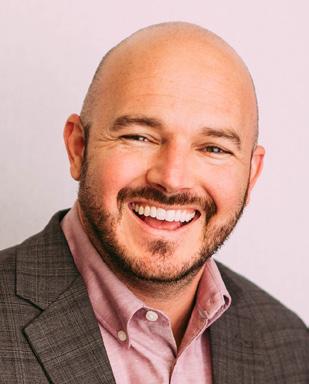
Hughes said keeping a space clean minimizes illnesses and sick days employees may have to take.
“That’s why it should be important,” he said, “for your customer and employee well-being.”
A cleaning company and commercial space also needs a cleaning products provider. Myers Supply, headquartered in Hot Springs, has been ensuring companies have the cleaning supplies and equipment they need since 1955.
The company offers cleaning chemicals, safety supplies, office supplies, paper products, cleaning and janitorial supplies, foodservice supplies, equipment, and more.
In 1977, Vice President Ryan Myers’ father acquired the company from his father and opened the Little Rock location. Clients include long-term care facilities, municipalities and educaitional institutions, and the company has a contract with the state for prisons, parks and government buildings.
When Myers Supply’s team starts to work with a client, it makes sure to work within a client’s budget and needs.
“We do a complete audit of someone’s cleaning budget and find all the ways to save them money,” Myers said.
Myers said cleaning is more than handing someone a mop and broom. It comes with knowing about infection control and the contact time needed to kill certain bacteria. The company also offers training sessions to help ensure employees have the skills and knowledge to keep commercial buildings clean.
Since Myers Supply is an independent company, it can pivot with trends quicker than some national supply companies, Myers said.
One way its team stays on the forefront is by offering automated
equipment, which helps to minimize some of the work a cleaning staff has to do every day. The company offers automatic floor cleaning equipment with some options that are a bit larger than a Roomba vacuum and other, larger automated equipment that can cover thousands of square feet a day.
Just as important as the inside of the building is the outside and surrounding areas, which can be kept clean with power washing.
Chris Apple founded Arkansas Pro Wash in Bryant in 2009 and specializes in teaming up with commercial real estate owners and managers to keep properties looking good.
The team focuses on keeping areas such as entrances, sidewalks, store facades, windows and canopies clean so that the building gives a positive impression to visitors. There is also the health and safety aspect of power washing. Places such as back entrances to restaurants and dumpster enclosures can smell bad and attract rodents when left uncleaned.
Now Arkansas Pro Wash is venturing even further into “taking ownership of property image” with CAM Pro Services by Arkansas Pro Wash, which offers common area maintenance plans, Apple said.
“We’ve really worked hard to bring together a team of professionals that have years of expertise in multiple areas,” he said. “We’ve com-
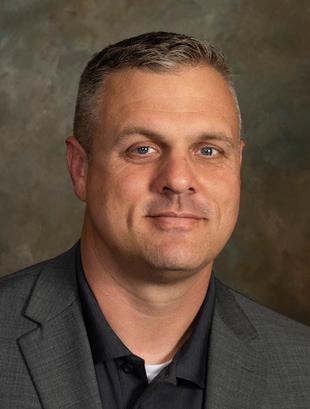
“The honest answer is that owners and managers have thousands of irons in the fire, and there is only so much time in the day.”
— Chris Apple, Arkansas Pro Wash

bined that with our reputation for service, dependability and, through the trust we’ve built with our clients, have been able to take something really important off of their plate.”
That includes parking lot maintenance, light lawn care, painting and more, which provides clients with “one relationship, one solution that you can trust,” he said.
He said the idea is proactive cleaning to uphold a property’s image.
“Why wait until it becomes an issue before taking action?” he asked. “Why wait to react after the tenant leaves, the lease isn’t signed or the maintenance issues turn into major problems? The honest answer is that owners and managers have thousands of irons in the fire, and there is only so much time in the day.”
A clean office space means a good impression on clients and healthy employees, but it goes even deeper than that.
“Our goal is to be their proactive eyes onsite, to take ownership of the property’s image so that they can focus on what they really need to do,” he said, “and to allow them to do that with the peace of mind that this is in good hands.”


EXPERTISE BY THE PIECE Fractional staffing a growing trend
By Dwain Hebda
Imagine you are the head of a company going through a merger; for the sake of clarity, let’s say your firm is acquiring another. Just inside of the due diligence phase of the transaction, your chief financial officer leaves for a different job, leaving the process rudderless and threatening to scuttle the entire deal.
As unpleasant as that situation sounds, it is far less catastrophic today than in previous eras of business ownership thanks to a growing new trend in the human resources world called fractional staffing. The strategy, which is being embraced by more and more companies, brings companies the C-suite-level expertise they need when they need it for only as long they need it. In its simplest definition, fractional staffing operates like the temp employees of old who do short-term or project-specific work. Unlike the classic temp or temp-to-hire, which traditionally offered extra hands for overflow work
such as data entry or customer service, modern fractional staffing offers an advanced level of expertise and corporate experience. Corporate finance, mergers and acquisitions, operational efficiency, or information technology projects are all examples of things traditionally spearheaded by a full-time company executive that are now falling to hired guns brought in specifically for that purpose.
The trend is a by-product of the gig economy that emerged after the COVID-19 pandemic in which more and more people are shedding the traditional full-time permanent roles that have held sway in the business world for generations.
“Traditional full-time employment is no longer the norm,” Forbes Advisor reported in 2023. “The accelerated change in the workforce over the past few years has driven the rise of the fractional employee. … The fractional model has infiltrated the gig economy, allowing businesses to hire workers for specific tasks or projects within the C-suite roles.”
Unlike other workplace trends that have been criticized as merely kowtowing to the whims of younger generations of workers emboldened by a labor market stacked in their favor, fractional staffing is largely praised as a personnel strategy that is more efficient and more effective than the traditional staffing model.
A recent report by Forbes shows the fractional model can reduce payroll costs by 30 to 40 percent, and McKinsey & Co. noted deploying the right expertise to customer service roles can increase customer satisfaction by 20 percent and revenue by 15 percent. Best of all, fractional staffing allows companies to stay light on their feet, adapting to changing corporate and market conditions much quicker.
Allen Engstrom, owner of CFO Network in North Little Rock, does not see the trend as anything new but merely catch-
ing up to early adopters such as himself. Having operated in the space for the past 21 years, he said the business model behind fractional staffing is so radically different from the norm, he considers it its own business segment.
“I actually would not put us in the staffing category. We don’t really place people,” he said. “I’ve got 45 people who are full-time employees of CFO Network, and they remain full-time employees of CFO Network. We just outsource our services to other companies instead of them hiring internal people like bookkeepers, accountants and CFOs.”
“Traditional full-time employment is no longer the norm.”
— Forbes Advisor
The company has created a profitable niche in supplying a range of expertise from the CFO on down, mixed and matched to meet each client’s individual needs, for far less than hiring and keeping such expertise on staff permanently.
“Say your business is too small to have a full-time CFO, which could cost 150 grand a year,” he said. “Even if you had a full-time CFO, you’d still need a bookkeeper, at minimum, or an accountant. You’d need an analyst. You could spend a quarter of a million dollars just to have one of everything you need, and if you’re a small business, you’re like, ‘No way I can afford all that.’

“What we do is we go into a small business, we analyze what they need, and then I go back to my bench of 45 specialists, and I fractionalize all the perfect proportions of bookkeeper and accountant and CFO and analyst to give them a world-class accounting and finance department for a price that’s actually less than what they would expect to pay for one bookkeeper. The client ends up getting dramatically more for a lot less. It’s an overwhelming value proposition.”
The secret ingredient to the company’s success is the makeup of the 45 professionals that CFO Network can deploy. Engstrom said he strives to maintain as much diversity of experience and expertise as possible to give him the most flexibility.
“We have a really good mix of senior, seasoned, experienced professionals and a healthy dose of young talent who are coming straight out of school with cutting-edge skills, things like managing big data, advanced analytics, dashboarding — things like that,” he said. “That makes a really powerful combination.”
The flexibility of the fractional staffing model is also appealing to the employees being deployed to companies on a shortterm basis both as means to earn money and to gain experience for landing a permanent job later.
“Since COVID, life has totally changed,” said Brad Hughes, second generation owner of The Hughes Agency in North Little Rock. “It used to be people would walk in, and you gave them a job. Now [companies are] looking at people while they’re in high school, trying to get them involved. They’re trying to start some type of internship or apprentice program to get them to be a part of your payroll. It’s very, very unique in how that works, but

The company has created a profitable niche in supplying a range of expertise from the CFO on down, mixed and matched to meet each client’s individual needs.



Brad Hughes
Allen Engstrom


“Right now, college students coming out of college for the summer are looking for jobs, but it’s very short term. If a company has a project that needs something to be done right now, this can be a good resource to get a workforce, and you can get them fairly reasonably. Another one is the stay-at-home moms and dads who, once school starts, have time from about 9 to 2. These days, there are call centers that can push calls to their house, which is a great opportunity for that type of worker.”
Hughes said some of the people he comes in contact with are former business owners or executives who may not be looking to jump back into the labor pool full time but have a lot of experience to share that can be valuable to other companies.
“It happens that you have these people who retired too early, and they’re looking for something, and they have the skill set, but they do not want to work full time,” he said. “They want to be very flexible. They’re out there, but a company has to know what they’re looking for and be open-minded.”
Other firms dealing in the fractional space are more specialized, such as Bentonville-based Granted, which hones in on helping nonprofits improve their ability to land grants. Found-
“If a company has a project that needs something to be done right now, this can be a good resource to get a workforce.”
— Brad Hughes, The Hughes Agency
er Shannon Anastosopolos said while hiring grant writers had been around for many years, his company offers a more comprehensive menu of services.
“When we say grant solutions, a lot of people think of grant writers, and that is part of what we do,” he said, “but the grant writing isn’t the most critical part. The criticality as far as delivering a product and finding funds for these organizations starts with finding the right grant opportunities, a lot of which require partnerships. You partner with other organizations — government sector, private sector — and you collaborate to pursue these grant opportunities.


“A lot of organizations don’t have the leadership capacity, bandwidth, experience — you name it — to be able to research grants, write grants, or cultivate the partnerships and formulate the projects necessary to do all of that.”
Anastosopolos said the company’s expertise also does not limit itself to the operational steps of securing grant funding but digs deeper to help organizations change the way they view the process to ensure time and resources are wisely invested and correctly placed.
“We coined the term ‘strategic advisory.’ I define that as fairly synonymous with leadership,” he said. “We’re giving advice on how you as an organization are struggling to meet the demands of the cost of programs. You need to create program revenue or find some nondiluted funding to do.
“We’re not just coming in saying, ‘Hey, let’s write some grants.’ It’s about how this organization is best positioned
to secure these dollars. How can we restructure the mission or restructure how you deliver the mission? How can we identify new partnerships to promote or foster success in what you do? We’re acting as a fractional leader to improve these organizations.”
Another firm operating in the space, SG Performance Group, combines elements of consulting and efficiency improvement along with the operational elements performed for clients, said Ben Barr, founder.

“Broadly, we’re a finance strategy consulting firm,” he said. “We step in for small and medium-sized businesses; $5 million to $50 million in revenue is probably our sweet spot. We help folks if they’re buying or selling a business or assets, help raise capital equity and debttype stuff. Then, digging in, there’s another element that I think of as performance improvement, where I go in and review cost structure, revenue model and, ‘Hey, you’re overspending on X, Y, and Z. How can I help you with that?’”
Barr has developed a vast network of professional resources for supplanting or augmenting needed expertise for clients. Partnering with Dallas-based Telostaff, which maintains staffing relationships in the Philippines, Barr said he can provide fractional or ongoing expertise at deep discounts compared to hiring domestically. The business model provides an interesting new wrinkle in the fractional staffing industry.
“I’m basically helping my clients run the process, representing them as a strategic financial buyer where they don’t have a bookkeeper, right, or they don’t have a CFO,” he said. “I see my role as helping organizations become more sophisticated and build better processes for less money, which is huge. It basically comes down to securing very high-quality resources for a very good price.”
Shannon Anastosopolos
Ben Barr

Veteran operator David Bubbus Sr. elevates the fast-service experience
By Dwain Hebda
Photos by Dwain Hebda
Anyone who wishes to capture what David Bubbus Sr. does on any given day is advised to bring comfortable shoes. The lifelong restauranteur, who, with his son, David “Alan” Bubbus, Jr., created and grew David’s Burgers into one of Arkansas’ most-beloved native chains, does not do well sitting still.
In fact, during a sudden rush of customers at one of his restaurants, Bubbus seemed to be everywhere at once. He weaves through the open kitchen, where he hails employees by name and remembers a personal tidbit or just asks about their day, all while moving. In the dining room, he is a hummingbird host, moving from table to table and customer to customer, feeding off of what they tell him. From the satisfied tables, he takes a smile, but the ones for whom the service has fallen below his standards sends him on a beeline directly to the nearest employee to address.
It is only a burger and fries on the plate, as he readily acknowledges, but the customer experience is pure gold. They do not call it the hospitality industry for nothing, and even if many such places these days seem to have forgotten that, David’s Burgers is not one of them.
“Service is more important than the kitchen,” Bubbus said. “The food part is so simple. I mean, right here, we cook burgers and fries. Anybody can do that. The restaurant business is more about service than it is the food.”
Do not misunderstand: Bubbus is very, very keen on the product David’s Burgers serves and for which it has been voted among the best in Arkansas in multiple polls, including AY About You’s Best Of through the years. Trained in the art of meat cutting from an early age, he takes great pride in the fact the company maintains high standards all along its supply chain of high-quality beef — U.S. Choice chuck, a largely unheard-of ingredient in quick-service restaurant hamburgers — right down to the pasture.
competitive business with a lot of moving parts, Bubbus has decades of success across multiple restaurant concepts to back him up. Breaking things down into simple components a team can latch onto and do exceptionally well beats an overcomplicated formula any day to his way of thinking. It is a strategy that hearkens back to his earliest jobs and the people he grew up around.
“My dad died when I was 9 months old, and he worked at the White Eagle Cafe [in North Little Rock] on Washington Avenue back in the 1930s and ’40s,” he said. “That was the place to eat back in the day. Next door to the White Eagle Cafe was Jacobs Meat Market, owned by the old man, Al Jacobs.
“Well, it just happened that after my dad died, my older siblings bought us a little house in Levy, and it just happened that Johnny Jacobs, Al’s son, opened a meat market on 35th and Camp Robinson Road, a block away from our house. I grew up in that meat market; I was kind of like a mascot. I’d hang out down there, and they’d put an apron on me and a little hat and take a picture. There’s a picture of that somewhere that was in their ad in the newspaper that I’d love to find.”

By age 12, Bubbus rivaled most of the other meat cutters in the store, earning the nickname Butcher Boy. By 16, he commanded a potent repertoire of master butcher, natural upseller and an expert in the art of engaging the customer.
“I worked at the meat market with guys who were really good at that,” he said. “In the old days, we waited on all the customers, of course. If the customer had a roast, they’d wind up selling them the roast and 3 pounds of hamburger and five or six pork chops. I was just a kid, you know, working the counter at 9, 10 years old, listening to them. I guess I just picked it up from them.”
After custom processing animals in Searcy, sides are cut, trimmed and ground fresh in the company’s USDA-inspected central facility, from whence it is delivered to restaurants, along with all the freshly sliced toppings. Bubbus is so particular about the resulting burgers, in fact, that he had a special device created by which kitchen employees form the ideal patty without heavy handing the meat to mealy mush.
The fact that Bubbus considers all that the easy part tells a person how important the people side of the equation is to the company’s success and how deliberate management is when hiring and honing customer service skills.
Bubbus entered the restaurant business, and in 1963, at age 19, he was managing JaMar restaurant in Pine Bluff. Four years later, he would have a place of his own in town, the groundbreaking El Matador, which was an early pioneer for Tex-Mex fare in Arkansas.
Another notable part of his career was creating Chicken Country, a fast-service restaurant he franchised into about 70 locations in Arkansas and Texas starting in the late 1960s.

“We really encourage a fast walk,” Bubbus said with a wry, “Know what I mean?” grin. “Fast walk creates energy, and if you’re smiling and walking fast, good stuff happens. If we see somebody that’s not walking fast, we coach them on it. They don’t learn how to do it — we let them walk home.”
If that sounds like an oversimplified business plan in a brutally
“Well, I really didn’t intend to do [franchises],” he said. “We opened the first one up, and people just came up, wanting to buy franchises. My nephew bought one. I sold one to a car dealer, an old buddy of mine, who put it next to his car lot. A guy from Monticello wanted to buy one and then a guy from Hot Springs, and it just went nuts. I sold 12 the first year.”
As a restaurant business model, franchising was relatively new — the first franchise locations for Kentucky Fried Chicken and McDonald’s were just a little more than a decade old — leaving Bubbus to figure it out as he went.
“We had our own commissary, like we do now. We serviced everything,” he said. “The chicken back then used to be delivered in ice packing and a wooden box — very messy. We cut the
David, left, and Alan Bubbus at the groundbreaking of the Searcy location. (Photo provided by David’s Burgers)

far off the mark — several of his grandkids have learned the facts of business life at his elbow.
That familial attitude extends to the communities the restaurants serve, as well. True to its hometown roots, the company is deeply invested in charitable causes and local events, supporting organizations ranging from foster children and adoption to veterans and neighborhood ball teams. In a very real way, every one of the company’s employees is also a community service project of a sort, many of them on first jobs and all of them gaining skills they can apply no matter where their careers and lives lead.
“There are things that, if you learn them at an early age, you’ve got a head start on everybody,” Bubbus said. “If you can look somebody in the face and talk to them and smile at them and make their day a little better, you’ve got an advantage in life. We have a lot of parents come in and tell us, ‘When my daughter gets old enough, we want her to work here.’ I hear that all day. You notice a lot of our kids are just kids, but they’re the right kind.

chicken up on-site, distributed all the paper goods, kept the menu to very few food items.”
Bubbus could not have known it at the time, but many of the same operational concepts would carry over later to David’s Burgers, the brainchild of his son, who, after graduating from law school, had up to then had a career as a bank appraiser. The two have made for an ideal partnership ever since, even if the senior’s voice of experience and the younger’s corporate mentality sometimes clashed.
Family lore includes the younger’s opposition to the endless fries served tableside for fear people would not order a combo knowing hot fries were coming around for free. The elder insisted people were more honorable than that, and sure enough, endless fries became an effective part of the David’s Burgers brand.
Then there is the menu — primarily comprised of burgers, a grilled chicken sandwich, fries and a grilled cheese — which takes its cue from the Chicken Country days.
“I’ve always thought if you can figure out something that’s tasty and simple that you can repeat without having to have chefs on the staff, it would work, and it has,” Bubbus said. “[Alan] had never really worked in a restaurant. We opened the first door, and he said, ‘We need to add a hot dog to the menu.’
“I went off, and the end of the conversation was, ‘You don’t know enough to know what in the hell you don’t know. You can’t even do what we’re doing now.’”
At that, Bubbus let out a big laugh, and his tone turned warm.
“He’s a special guy, he works hard, and I’m very blessed to have him,” he said. “It’s worked out really well.”
Initial hiccups aside, David’s Burgers has been an unqualified success, growing to 10 Arkansas locations and about 400 employees, Bubbus said. Each store is decked out with blown-up family photos, giving diners the feel of a Bubbus family reunion, which is not too
“A lot of our kids, they work here for a few years and go to college. I talked to a lady the other day. She’s probably 27 or 28 years old, and she’s an attorney here in town. She worked here all the way through college and high school. Any field you go into, you’re going to be confronted with people, and if you can build a relationship with them, there’s nothing more important in life than the relationships you build.”
As in every life, not everything panned out for Bubbus during his long career, but instincts, experience and a plain old-fashioned gift for the business have combined for an entrepreneurial batting average high enough to let him know he is a lucky man — not that the last chapter of this Arkansas success story has even been written yet. At 80, he is still churning out new ideas such as the recently launched David’s Premium Beef, a line of fresh protein bundles and luxury aged steaks that closes the circle on the Butcher Boy from upstart meat cutter to the restaurant elder statesman he is today.
Talking about the newest venture, Bubbus was effervescent and barely able to contain the master salesman within. Imparting some closing cooking tips for one of the beautiful aged ribeyes, his words touch the listener’s senses, describing both sizzle and steak. Then, the customer’s appetite sufficiently whetted, he sets the proverbial hook.
“This steak,” he said, “will change your life.”

David Bubbus on … David Bubbus on …
SWEATING THE DETAILS
“Details matter. The restaurant business is a nickel-and-dime business, you know? If you make 7 or 8 percent profit, you’re doing really well. Well, we have 400-and-some employees, and they all get drinks, and we used to have them bring their own cup. That got to be a big mess because everybody had all these fancy cups, and they were everywhere. Junk yard. We started doing everybody get a cup and put your name and the date on it, and keep that same cup. That’s a small thing, right, but a few extra cups would knock a hole in that 7 or 8 percent, so details matter.”
LESS IS MORE
“If you’ve got a decent product that you can put out efficiently, that gives you a lot of advantages. Your inventory’s smaller, and it just makes everything a little simpler to have a small menu. Nowadays, speed’s important, probably as much as anything else. People are in such a hurry, so you’ve got to have something you can get out efficiently.”
STORYTELLING — JUST BECAUSE
“Let me tell you a really neat story. I’d just started in Pine Bluff, and I got a phone call from a guy at the bus station. He called me and said, ‘I’m looking for a job, but I only need to work for a few months. I’m a chef, and I’d love to work for you. I heard you’re a nice guy.’ I went and picked him up at the bus station. Well, this guy told me he was Frank Sinatra’s house chef — little Italian guy, real cocky, probably in his mid-40s. Anyway, he stayed a few months, and I never believed he was Frank Sinatra’s chef, but he was a chef, for sure. He was a genius, and he taught me a whole lot about the food business.
“Anyway, he stayed about three or four months. The story was he was going through a divorce and had to hide out. I don’t know
if that’s true — probably hiding out from the law or something — so he called me one day before he left and said he had a gift he wanted to give me. I went to his apartment, and he opened up this picture album. He had all kinds of pictures of him and Frank Sinatra and Billy Martin and Marilyn Monroe, all the stars, and he was standing in the middle with his chef’s hat on, nice car and stuff. I mean, turns out he was the real deal. He gave me a painting that Frank Sinatra gave him supposedly. I’ve still got it on my wall.”
MOTIVATION
“Like I’ve said, it’s more about service than it is the food. You’ve got to build that atmosphere, and you’ve got to pick your people. If they can’t smile, you don’t want them around you. We like to have fun doing what we’re doing, and if someone doesn’t want to have a little fun, they need to go someplace else. We’ve also got regular management training classes for the newer employees and the middle ones and then the store managers, and it’s mostly to keep them excited. You know, nothing happens without excitement, and if you can’t keep people excited, it’s going to go downhill.”
THE SECRET TO SUCCESS IN BUSINESS
“I don’t have any idea. I’ve never worked for anybody to learn anything about being a master in business. I guess I was too cocky to think anybody knew enough to teach me anything. I didn’t have a model, and when you’re 20 years old, 30 years old, I mean, how much can you know? Do the little things right. Do the next right thing. You know, if you see something on the floor, pick it up. Walk with a good step. Have a smile on your face. Get some energy. I guess that’s the only secret we have.
“Honestly, I don’t know how it all happened. It just happened. I guess I didn’t make a long-range plan for any of this. Just take it a day at a time and do the best you can, and see what happens.”
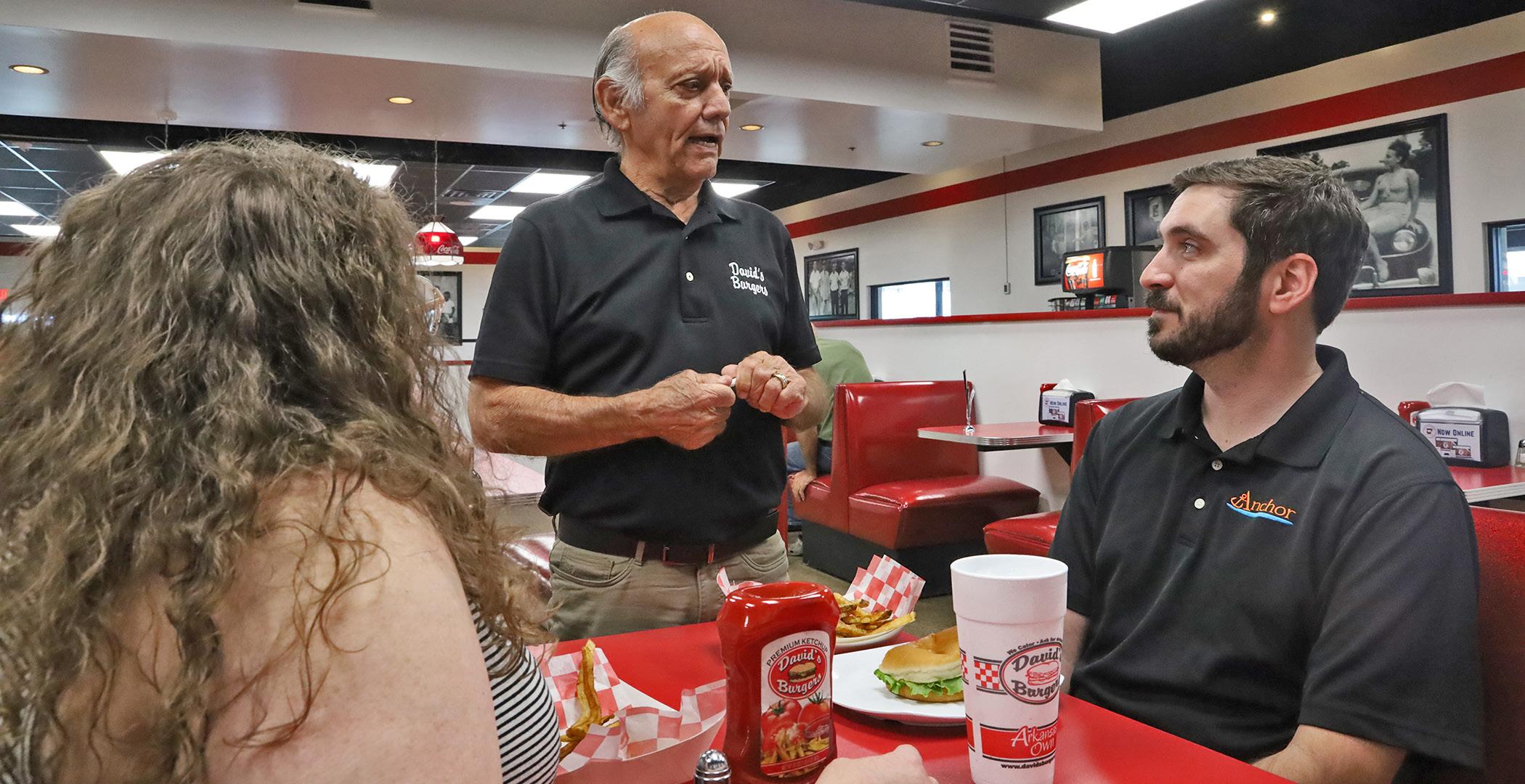


Meaghan and Donnie Ferneau, former owners of the now-closed Cathead’s Diner in Little Rock, are co-chairs of the 2025 Delta Diamond Chef Awards Gala and Competition in Pine Bluff.
THE GREAT RESET
By Dwain Hebda / Photos by Jamie Lee
hen longtime Little Rock chef and entrepreneur Donnie Ferneau talks about COVID-19 as an existential threat in the food business, he is not speaking anecdotally. Ferneau’s last venture — Cathead’s Diner in Little Rock, a celebrated showpiece of Southern cuisine — was among many restaurants that bit the dust due to the pandemic, giving the veteran restauranteur a reminder of the fragile nature of the business.
Now, with COVID-19 four years in the rearview, Ferneau and his wife, Meaghan, are still a step back from the industry they had been major players in for so long, she working in tech marketing and he at food distributor Sysco. They still dabble in private dinners and special events, but for now, the chef’s life has largely given way to a focus on farm and family life.
“When we closed our restaurant in 2020, I can tell you this: I didn’t know another life besides being a chef, working 60, 70 hours a week, working every weekend, every night,” Donnie said. “I’m glad that God didn’t answer my prayers then but instead gave me time with a beautiful wife and a daughter who loves eating my food. It was the life I had always worked for; I just didn’t know it was possible until COVID happened.”
Domestic bliss aside, the duo still appreciates good food — as well as the people and places that serve it — of which Arkansas has more than its share.
“When you look at the food scene and what Arkansas does have to offer, it’s all about these hidden gems, you know?” Donnie said. “You’ve got all these little quaint towns, little quaint restaurants, and there’s a lot of charm. That’s one thing I love about it.
“We travel all the time, and whenever we come back to Little Rock, it’s just a small town with big buildings where you just feel right at home. We love it. We were in New Orleans for two weeks one time, where we ate every meal out. We came home,
went right to The Faded Rose [in Little Rock], and it was the favorite ‘New Orleans’ meal we’d eaten.”
Meaghan said such experiences do not just happen but occur at the confluence of several factors that combine to create something that is greater than the sum of its parts. Arkansas, she said, is a prime example, bringing together all the elements for a great dining experience regardless of category or concept.
“The entire state of Arkansas has some really great restaurants that need to be celebrated,” she said. “Great restaurants start with great ingredients, and as a big agricultural state, our homegrown ingredients are really something worth promoting.
“Then you add to that the drive and passion of chefs, and it’s really something special, even among younger chefs. The younger generation now, they’re just not happy unless they’re loving what they do. A lot of that involves hospitality and food, and so it is exciting to see the passion that exists as they’re starting to come up in the food scene.”
Arkansas’ restaurant community is a microcosm of the optimism many are feeling these days, the kind that has industry experts cautiously predicting a renaissance in dining nationwide. In its annual State of the Restaurant Industry report for 2025, the National Restaurant Association paints a bullish picture of trends within the industry that may be signaling the traumatic experience of the pandemic and its ripple effects are finally dissipating.
“Great restaurants start with great ingredients, and as a big agricultural state, our homegrown ingredients are really something worth promoting.”
—Meaghan Ferneau


The industry is expected to reach $1.53 trillion in sales this year, an increase of 4.1 percent over 2024’s $1.47 trillion nationwide.

After a sobering 2024 in which nearly 1 in 4 operators said their restaurants were not profitable due to food and personnel costs 30 percent higher than 2019 levels and a 61 percent decline in customer traffic, the tables appear to be turning. The industry is expected to reach $1.53 trillion in sales this year, an increase of 4.1 percent over 2024’s $1.47 trillion nationwide. The bump is widespread; 41 percent of restaurant operators expect sales to be higher this year, while another 41 percent expect sales to be at least on par with 2024 receipts. The renewed confidence is also reflected in people entering the industry. Almost half of current operators expect greater competition for diners’ dollars in 2025, the report states.
At the heart of this comeback is pentup demand by consumers. More than 40 percent of U.S. adults overall stated they would increase eating at sit-down restaurants and a comparable percentage would increase ordering delivery in 2025. Broken down by demographic, millennials led Gen Z, Gen X and baby boomers on these spending measurements at nearly 9 out of 10 saying they would increase their patronage as their budget allows.
Even finding sufficient labor is trending in the right direction at 68 percent of operators reporting having enough employees to meet customer demand, up from just 22 percent who did in 2021. The report also projected the industry will add about 200,000 jobs in 2025, growing to 15.9 million workers, the highest headcount in a decade.
However, some positions are harder to fill than others, including chefs, cooks and kitchen support, which nearly 6 out
of 10 operators said were hardest to come by, particularly at full-service restaurants. One group looking to address the issue head-on in Arkansas is the Arkansas Delta Chefs Association. The group’s two-to-five-year plan calls for more culinary training in the form of a multifaceted physical space to be built in the heart of downtown Pine Bluff. The project is envisioned to include a guest chef restaurant and a community education center with kitchens, labs, and an area for audience and entertaining that will serve home cooks, chefs, food scientists and entrepreneurs.
“What I admire about the new facility is that it will teach every aspect of culinary life,” Donnie said. “It will not only teach skills but also the numbers. No matter what type of business it is, there’s always a formula, right? You have to know profit and loss, how to manage your kitchen properly, track inventory — all of those things. You have to make sure the IRS is taken care of and handle labor and payroll.
“There’s a lot more to it than just cooking a great meal. If you want to have a restaurant that goes under, just put somebody at the helm that can make a great dish one at a time at home.”
The space has its own signature event, the Delta Diamond Chef Awards Gala and Competition, for which AY Media Group is the media sponsor. The event is designed to raise money for programs and drum up exposure for the culinary center itself. Now in its second iteration, the event pits five accomplished chefs in preliminary competition with the winner taking on 2024/2025’s inaugural champion, Chef Payne Harding, owner of Cache Restaurant in Little Rock, in the finals early next year.
The Ferneaus, who are this year’s cochairs of Delta Diamond Chef, see the event as an entertaining way to bring an important culinary resource to Arkansas.
“We’ve been pretty deeply rooted in the culinary community since 2001 in central Arkansas,” Donnie said. “One of the biggest visions we both have is we want to start to see the hospitality industry move back in the direction of where it was preCOVID and just flourish from there.”


The couple said the new education center will bring more people into the industry, capitalizing on the popularity of being in food service by investing workers with the culinary and business skills needed to be successful.
“The Food Network has really changed the way our entire country looks at the restaurant scene, the hospitality industry — all of that,” Meaghan said. “Nowadays, kids are growing up seeing chefs like Gordon Ramsay on TV, and they’re saying, ‘Well, that’s what I want to be.’ You’ve got people who are starting at such an early age getting the actual skills down. I think that what the institute can do is capitalize on the success of the industry as a whole and just drive that passion.
“Like Donnie says, you can’t run a successful restaurant off hopes and dreams alone. You have to have the drive to keep your heart in it when it gets really hard. There is so much hardship in this industry; I’ve been through three, four restaurant closings, and it is not easy. Anyone who wants to be successful in this industry has to have a passion to do it.”

Delta Diamond Chef Awards Galaand Competition
Preliminary competition: August 22
UAPTC-Culinary Arts & Hospitality Institute in Little Rock Gala and final: February 24
Saracen Casino Resort Pine Bluff
Preliminary contestants
• Jill McDonald & Wendy Schay, chefs/owners, The Croissanterie, Little Rock
• Matías de Matthaeis, executive chef, Saracen Casino Resort, Pine Bluff
• Joseph Carmelo Salgueiro, executive chef/owner, SŌ Restaurant, Little Rock
• Austin Bond, executive chef, Winthrop Rockefeller Institute, Morrilton
• Joshua Garland, executive chef/ owner, DONS Southern Social & Best Cafe, Hot Springs

Defending champion
Payne Harding, executive chef/owner, Cache Restaurant, Little Rock
Tickets

(File photo)

Gonna Fly Now
Gonna Fly Now
With tariff scare fading, entrepreneur looks for business to soar
By Dwain Hebda
With a name like Arkansas Drone Solutions, one might envision the Greenbrier company to be located near an airstrip and owned by a former fighter pilot. It is a misconception that brings a chuckle out of the company’s founder and resident rancher and farmer, Russell Burroughs.
“My dad started a cattle herd back in the 1980s, and we had a row-crop farm as well,” he said. “That’s where I got an interest in wanting to be able to view the crops and view the animals by air, especially looking for calves that may be newborns that you can’t find in the grass.”
Burroughs experimented with radio-controlled helicopters but found the cameras were not stable enough for his liking. He then began to get interested in early commercial drones and immediately saw the future.
“I could tell then that this was going be the coming thing,” he said. “They kept evolving; cameras got much better, with stabilization and automated flights. You could go out and check your corn crop, or you could look for your animals, or you could do a map of your property and see how and where the water flowed in order to make improvements.”
Immediately captivated, Burrough’s entrepreneur streak kicked in, and in 2015, he passed the Federal Aviation Administration Part 107 test and received his license to apply his skills to commercial jobs and to demonstrate the equipment for sale. He formally launched Arkansas Drone Solutions in 2018, the latest in a family tradition of entrepreneurship that formerly included supplying apparel to Walmart.
“I started reaching out to farmers, showed them what drones could do, started selling drones to farmers, and then word kind of spread,” he said. “Law enforcement, search and rescue, roof inspectors, and surveyors started getting into drones.”
Today, the business’ sales break down to 70 percent equipment sales and 30 percent flying services. Burrough’s inventory is a far cry from what it was just a few years ago, he said.
“The thermal drones are really popular now with a lot of people. That’s what I’ve been selling a lot of lately,” he said. “The spray drones came out a few years ago, and I looked
“I started reaching out to farmers, showed them what drones could do, started selling drones to farmers, and then word kind of spread. Law enforcement, search and rescue, roof inspectors, and surveyors started getting into drones.”

into those, but the regulations hadn’t caught up at that time for spray drones, so I just kind of waited. When there was a clear path for being legal to fly and spray, I got into selling spray drones, as well as flying and spraying for customers myself. The demand for spray drones picked up pretty quickly.”
Everything was right on flight plan until Washington began a tit for tat with trading partners over tariffs, especially with China,
— Russell Burroughs Arkansas Drone Solutions

which happens to be home to one of the world’s top drone manufacturers.
“When the tariff hit, that kind of put the brakes on everything for a while,” Burroughs said. “DJI is a leading manufacturer, and there’s been attempts to ban DJI drones [in the U.S.] because they’re Chinese made, but they’re also at least two years ahead of most other competitors, so that’s been a challenge because there are drones coming on the market that are in their first year, and they’re having a lot of issues.”
In addition to the trade spats, other international hotspots on the globe have affected Burrough’s business.
“I sell enterprise-level drones, which are your mapping drones, your thermal drones,” he said. “Normally, I would keep a couple of the enterprise drones in stock, but the war in Ukraine kind of sucked all the thermal drones out of the country because the profiteers were taking the thermal drones and sending them over there. You could not get any in the U.S., and then all the resellers had to sign a document saying you would not export, which I never would do anyway.
“Anyway, the inventory was so low that when the tariffs hit, the distributors kind of put the brakes on bringing more drones in because when it left the port in China, it was a certain price, but when it landed, it could be 30, 60, 100 percent more. People ask me what I think is going to happen in the next year with drones, and right now, it’s difficult to know, but I think things are calming down.”
As cooler heads have prevailed on the trade front, Burroughs sees the future with more confidence, especially as more people gain a functioning or even advanced knowledge of the equipment and its applications.
“It’s starting to slowly pick back up,” he said. “I would say probably 65 percent know what the equipment can do. They’ve watched YouTube videos, they know the product they’re looking for, and they’ll call me with a particular product in mind and a problem they want to solve.
“The other 35, 40 percent just know they want to get into it. Some of them are thinking about starting a small business with a drone, but they don’t know what drone they need to use, or maybe they’ve used one of the small consumer drones, and they want to know how to move to that next step.”
Inventory headaches aside, Burroughs said he enjoys the business, especially for the opportunity it gives him to be face to face with people, helping them choose the right equipment for what they have in mind.
“I’m more of a hands-on salesperson. I deal generally in Arkansas,” he said. “I get contacts from other states all the time, but usually, people want someone local who they can talk to. They’re tired of dealing with online sales and no support. When people call, I’m the one answering the phone, and I try to serve people and answer their questions as best I can.
“I had a call an hour ago from a guy who didn’t buy a drone from me but he needed a spray drone, and he bought it used, and he was having issues trying to connect to the network. There’s really nothing there to benefit me. It may come back around to me in the future or it may not, but I enjoy trying to help people solve their problems so they can go utilize their equipment.”
that’s been a big jump in just two years. I think [artificial intelligence] is going to be a big factor in everything, including drones.
“Right now, you can take a multispectral drone, and you can fly it over a crop, and it has several cameras on the drone that will take pictures of your crop so you can determine plant health. It reads the chlorophyll levels in the plant so you can see which plant is stressed.”
Burroughs also predicted the day is soon coming when the equipment will provide the same kind of autonomous service as a live pilot would.
“AI’s already here, but I think it’s going to change rapidly when the drone capacities, as far as spraying is concerned, get larger,” he said. “Today, if you’re spraying a field, it’ll show you the grid, the path that it’s going to fly, tell you how many gallons per acre you’re going to spray, and basically, you’re changing batteries and refilling the tank, while the drone is doing all the work itself. In the future, I can see more of that will be done by the drone itself, maybe automated filling and changing the batteries out.

Looking ahead, Burroughs said he expects the equipment to continue to improve, resulting in a smarter device that can fly longer and do more.
“I think they’re always going to be improving camera quality and battery life,” he said. “The latest enterprise drone battery has gone from 24 minutes to 49 minutes, so
“You’ll even have drones and groundbased systems where a robotic mechanism will go and maybe zap the weeds in the field in the early stages of plant growth, and the drone will work the same field later on in the growing cycle, attacking weeds or fertilizing the crop. I believe AI’s going to continue to bring about really big changes.”
Russell Burroughs
Gridiron gear-up
103.7 The Buzz’s Countdown to Kickoff fans football frenzy
By AMP Staff
Arkansas sports fans in need of further healing salve following the Diamond Hogs’ gut-wrenching trip to Omaha will find solace in 103.7
The Buzz’s upcoming Countdown to Kickoff.
The event is held annually at The Hall in downtown Little Rock, and this year’s iteration will feature former Razorback head coach and current offensive coordinator Bobby Petrino; returning Arkansas quarterback Taylen Green; and former Razorback greats Knile Davis and Casey Dick, each of whom played under Petrino when he was head Hog from 2008 to 2011.
The 2025 Countdown to Kickoff, of which AY Media Group is a VIP sponsor, is set for July 24. Doors open at 5:30 p.m., followed by a meet and
greet at 5:45 p.m. The program starts at 6 p.m. Tickets are available at littlerockhall.com and 1037thebuzz.com.
The event will also feature members from the crews of Morning Mayhem, The Zone, Out of Bounds and Drive Time Sports on The Buzz daily lineup.
SEC Media Days, this year scheduled for



From left: Bobby Petrino, Taylen Green, Knile Davis and Casey Dick.
The on-air talent from The Buzz will be on hand for the show.

July 14 to 17 in Atlanta, annually represents the launching point for football-talking season in the South — fall camps at the power conference schools tend to begin in late July — and the Countdown to Kickoff serves the same role in central Arkansas.
Petrino is beginning his second season as offensive coordinator under head coach Sam Pittman in Fayetteville. Under his leadership in 2024, the Razorback offense made marked improvement from the previous season. The Hogs shed much of the dysfunction that plagued the offense in 2023, and further improvement is expected in 2025.
Petrino is still considered one of the college game’s offensive masterminds. The Hogs won 21 games over the course of the 2010 and 2011 seasons

under Petrino, earning an at-large Bowl Championship Series bid to the Sugar Bowl in ’10 and capping an 11-win season and top-five finish with a Cotton Bowl Classic win in ’11. The Hogs’ only two losses that year were to the teams that played for the national championship, Alabama and LSU.
Prior to landing the Arkansas job, Petrino served in assistant coach roles at the collegiate level at Carroll College (in his home state of Montana), Weber State, Idaho, Arizona State, Utah State, Louisville and Auburn. He was the head coach over two different stints at Louisville and coached all-pro and future hall-of-famer Lamar Jackson, now with the Baltimore Ravens, during his return stint with the Cardinals.
Petrino coached the NFL’s Atlanta Falcons in

Fayetteville (File photos)

The return of veteran quarterback Green for his final year of college ball behind what is expected to be an improved offensive line and a potentially productive run game bodes well for 2025.
2007, resigning in December with a 3-10 record to take the Arkansas job.
He took a year off from coaching in 2012 but returned to the sideline in 2013 at Western Kentucky.
Following his second run at Louisville, Petrino took another year off in 2019 before being hired to lead Missouri State in 2020. During his two years there, he coached the Bears to a Missouri Valley Conference championship and two FCS playoff appearances. In 2022, he brought the Bears into Fayetteville to face the Hogs for his much-anticipated return to Razorback Stadium and gave the entire state a scare. The Bears built a 17-point lead before the Hogs, then ranked No. 10, settled in over the final two quarters to pull away for a nerve-racking 38-27 win.
Razorback Stadium,

QBs in their second year running Petrino’s offenses have historically thrived.
Petrino left for Texas A&M in 2023 to serve as QB coach and offensive coordinator and returned to the Hill to serve as Sam Pittman’s OC starting last season.
The return of veteran quarterback Green (13 starts at Arkansas in 2024, 22 previously at Boise State) for his final year of college ball behind what is expected to be an improved offensive line and a potentially productive run game bodes well for 2025.
QBs in their second year running Petrino’s offenses have historically thrived. Green showed flashes of Arkansas great Matt Jones during his first season at the helm but was susceptible to turnovers. He was fifth in the SEC in 2024 with 3,154 passing yards with 15 scores and nine picks, and his 602 rushing yards was good for second among league QBs.
Dick, currently the head coach at Fayetteville High School, lettered for the Hogs from 2005 to 2008, starting at QB his final two seasons — his last under Petrino. The Hogs went 5-7 that season but closed the year with a 31-30 win over LSU in Little Rock, dubbed Miracle on Markham II after Dick’s fourth-down scoring toss to London Crawford with 22 seconds left to play.
Dick was quietly one of the Hogs’ most efficient passers ever, ending his senior season in third place for most TD passes in program history with 35, behind Jones’ 53 and Clint Stoerner’s 57. In 2008, he became the first-ever Razorback QB to throw for 300 yards or more in back-to-back games.
Davis was a staple of the Petrino offense as a running back during his time on the Hill from 2009 to 2012. His final season as a Hog saw him earn first-team all-SEC honors with 1,282 rushing yards and 13 rushing TDs. Over 13 games, he averaged 6.3 yards a carry.
A third-round draft pick of the Kansas City Chiefs in 2013, Davis played for six years in the NFL, mostly for the Chiefs. His 108-yard kickoff return for a score against the Broncos in week 13 of the 2013 season tied an NFL record. During the wild-card playoff game against the Houston Texans that year, he took another KO return to the house, this one 106 yards. During weeks three and four of that season, Davis started for the injured Jamaal Charles and rushed for 132 yards against the Miami Dolphins and 107 yards against the New England Patriots.

COUNTDOWN TO KICKOFF
Getting fans set for the 2025 season with current and former players and presentations from local media members and the Buzz team.
JULY 24 / THE HALL
Doors: 5:30 p.m. / Program: 6 p.m.
TICKET PRICES
$37.72 - $75.68
All ages
VIP TICKET INCLUDES:
♦ One (1) event ticket with an assigned table in the front
♦ VIP entry at 5:30 p.m.
♦ Meet & greet starting at 5:45 p.m.
*Seat/table reservations will be under the name used to purchase. Tables seat 10. If you would like to purchase a full table, please purchase 10 tickets for your party under the same reservation name.
*Only VIP will have access to photos with the presenters.
PLEASE RIDESHARE - Parking is limited around the venue. We strongly recommend using rideshare apps like Uber or Lyft for transportation to and from the venue. There is a designated rideshare pick up / drop off location near the entrance for your convenience.
A FOOD & FAMILY AFFAIR
In Bald Knob and beyond, the Bulldog abides
SistersJennifer Muckelberg and Julie Roberts are not the original owners of the iconic Bulldog Restaurant in Bald Knob, their hometown, nor are they related to the original owners.
That doe not mean the Bulldog did not stay in the family when original owners Lece and Bob Miller sold the restaurant to Muckelburg and Roberts in 2017. The sisters each started working at the restaurant as teenagers. By the time the Millers were ready to retire, a succession plan seemed obvious.
Opened in 1978, the Bulldog has not missed a beat since the sisters took over, keeping all the original recipes that helped the restaurant grow its renown from Memphis to Little Rock and beyond. Those recipes came from Bob Miller’s mother, Lucille, who took her own mother’s recipes and refined them. (Lucille continued to come in and help out — and maybe implement a slight tweak — before retiring at age 90.)
Though the Bulldog has added a little more room since it opened, the place remains something of a time capsule, sitting just off Interstate 57 and enveloped in an iconic royal blue and red awning.
Most importantly, the food is the same as it has always been — homemade, delicious (try finding a negative review) and inexpensive.
A shake or malt, a Bulldog staple, will run a customer $2.99. Malt aficionados in Little Rock would be lucky to find one under $7. The fried shrimp plate at $7.99 is the priciest item on the Bulldog menu, which encompasses breakfast, lunch and supper staples.
Options include breakfast sandwiches; burgers; footlong hot dogs; dinner plates, including the shrimp, as well as catfish, barbecue pork and chicken (with homemade sauce), steak fingers and

much more; and of course, the Bulldog’s signature “pizza burger”—ground beef and mozzarella prepared like a chickenfried steak, as well as homemade slaw and desserts.
The deserts alone have created repeat customers, especially the pies and homemade short cake. There are daily specials, also, such as the chicken and dumplings on Fridays. Roberts said the Bulldog usually sells out five pots worth of dumplings by noon.
“Even if you don’t like chicken and dumplings, you’ll like these,” she said.
The Bulldog has always been popular among the locals, but many repeat customers hail from out of town and even out of state. In the summer, especially, the restaurant sees a lot of customers from Little Rock, Memphis and Mississippi stop in on their way to and from Greers Ferry Lake, Roberts said. The same goes for families staying in and around Bald Knob for softball tournaments.

The Bulldog’s reputation even followed Muckelburg to Texas.
“My daughter played travel softball, and we travelled to different parts of the state and other
B
yMarkCarter|Photos by Chris Davis
Though the Bulldog has added a little more room since it opened, the place remains something of a time capsule, sitting just off Interstate 57 and enveloped in an iconic royal blue and red awning.

states,” she said. “We were in an elevator one day at a hotel in Texas, and I had a Bald Knob [High School] Bulldogs shirt on. They asked me if I knew of the Bulldog Restaurant.”

She quipped, “I said, ‘The Bulldog? I’ve never heard of that place.’”
As customers and, eventually, young employees, the sisters remember a restaurant filled with school kids congregated around the pay phone in the back by the restrooms. Expansion and technology — ultimately brought about the end of the pay phone hallway.

“When we were growing up, it was more kids; a lot more high school kids would come in,”
The oldest of the cousins is 19. The kids work part time around school, and the sisters’ husbands help out when they can.
“With all the hard work that’s been put into this from the previous owners until us now, we’d just hate to see it get handed down to somebody who might not care as much,” Muckelberg said. “We want to make sure it goes to someone who cherishes it like we do.”
She is optimistic that some combination of her and Roberts’ children will take the reins one day.
“We think so. That’s the plan,” Muckelburg said. “Of course, they have to realize what comes along with it—maybe as they get older and more mature.”

Muckelburg said, “but you know, generations have changed, and they don’t find fun the way we used to back in the day.”
Culture may have evolved, but one constant at the Bulldog is the quality of the food. That plus the restaurant’s popular walk-up window helped keep things stable when COVID-19 hit, Muckelburg said. The Bulldog has stuck to its guns since the day the Millers opened it, and the sisters made the wise choice not to mess with a winning formula.
After all, it is a formula that landed the Bulldog in the Arkansas Food Hall of Fame’s 2023 class.
Muckelberg and Roberts are optimistic about keeping the restaurant in the family when the time comes.
Ultimately, the food is what brings folks back, but the restaurant, with its strong family vibe, has grown to become something of a cultural institution for customers local and otherwise.
One family’s journey to healing went directly through the Bulldog. Roberts said a customer once shared a story of how the restaurant helped when he and his wife split up.
“A gentleman came up and was telling us a story about how he and his wife had separated, and this was their meeting place,” Roberts said. “One was in Jonesboro, and one was in Little Rock. This is their halfway-point meeting place with the kids.


He said at first, it was a bad place for them because of the circumstances, but now it holds a lot of meaning and is their favorite place. I just thought, ‘Oh, wow.’
You know, you hear things like that, it really makes it special.”
Sisters Julie Roberts, left, and Jennifer Muckelberg, owners of the Bulldog Restaurant in Bald Knob
The College Question
By Mary LeSieur
Over the past decade, colleges and universities nationwide have seen a shift to nontraditional career pathways in droves. Whether one blames decreased birth rates, affordability concerns or labor market shifts, campuses nationwide are seeing a staggering change in postgraduate plans. However, do underlying biases cause this pivot to be viewed as a societal regression?
We live in a culture of side hustles, social media influencers and niche job markets — all needed in a constantly evolving workforce. Yet the demand for newly created roles and occupations can offer an alternative to the traditional education path.
The growing appeal of trade schools and apprenticeships offers a viable alternative for students wary of taking on tens of thousands of dollars in student debt, challenging the longstanding assumption that success is synonymous with a college diploma.
During an era where interest rates climb and affordability dwindles, it is understandable that many have reconsidered the value of a degree, especially one that will have lingering payments.
While college is widely considered beneficial and profitable to some groups, data suggests the decline will only continue, making nontraditional vocations booming industries.
As a college student, I have seen this shift firsthand among my peers — both on and off campus. Homeownership and financial independence during young adulthood can be virtually unheard of in our economic climate; however, those nontraditional pioneers advance their lives before most students obtain a bachelor’s degree. It has become a line of work that 61 percent of my generation is pursuing as many high schools incorporate dual enrollment courses and flexible schedule models.
A college degree offers employers the idea that for a certain amount of time, an individual attended classes, completed the coursework and developed skills in a specific area of study, but a degree in anthropology or philosophy offers little to job markets in our current society.
Realistically, some college graduates go into unrelated fields, and while aspects of a degree may be applicable, it is only a starting point.
We no longer live in a world where becoming a modernday Aristotle is a viable means of meeting everyday needs. The labor force needs electricians, HVAC technicians, coders and mechanics just as much as physicians, educators and lawyers.
It is a balance of shortages and needs. If every member of our society obtained a Bachelor of Science, who would teach literature, cover breaking news and cultivate Fortune 500 companies?
While saying this, we also discount an inherent pressure that places college on an illuminating pedestal, somehow glorifying college and making attendance a self-righteous act. Don’t get me wrong — college is a fantastic opportunity for those interested, yet I know it is not an ideal pathway for everyone.

So how do we as a culture destigmatize nontraditional pathways and professions? Can we reroute our thinking to appreciate strides toward nontraditional education and welcome them?
Embracing and supporting the broad range of careers and education options is crucial for our society’s multifaceted needs. Forgoing a traditional collegiate career does not imply a lack of intellect or ambition. Instead, it reflects fields for tactile learners and innovators.
Although the implementation creates unmatched opportunities for students uninterested in collegiate ventures, Americans give nontraditional higher education a mixed review. The consensus is split on the validity of whether or not a college degree offers a life of stability or more financial stress.
Culturally, Americans deem college a necessity, an indisputable token in order to succeed in life, yet we often forget that college degrees do not guarantee a lifetime of job security. Those ideas and arguments — for or against — are rooted in our cultural views of success. Success, which is nonlinear and subjective, is not obtained or granted with a piece of paper, cap and gown, or mountainous student loans.
A diverse workforce is an essential part of our economic environment, and suggesting the influx of nontraditional career pathways is a type of regression dismisses our cultural structure. Our views of success need to evolve, much like our workforce. By destigmatizing alternative education paths such as trades, certifications and apprenticeships, we meet the demands of our economy and give young adults the freedom to define their own fulfilling lives. The question is not whether college is valuable or if the shift toward nontraditional vocations is bad — it is whether we can recognize heterogeneous pathways that lead to variations of success.
As a culture, we need to move beyond our outdated notions and underlying biases and instead foster diverse ambitions and career goals regardless of whether or not a cap and gown accompany them.




